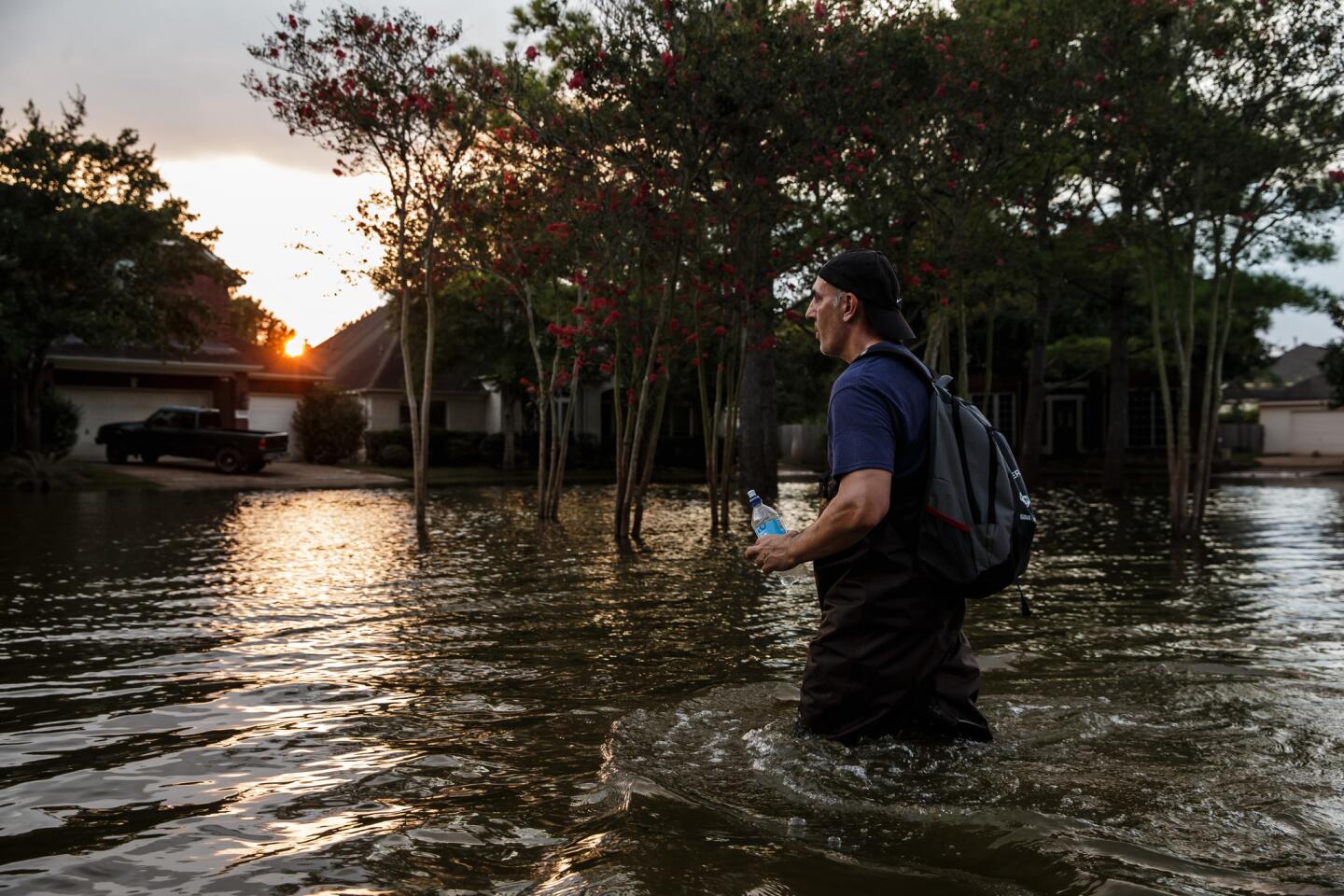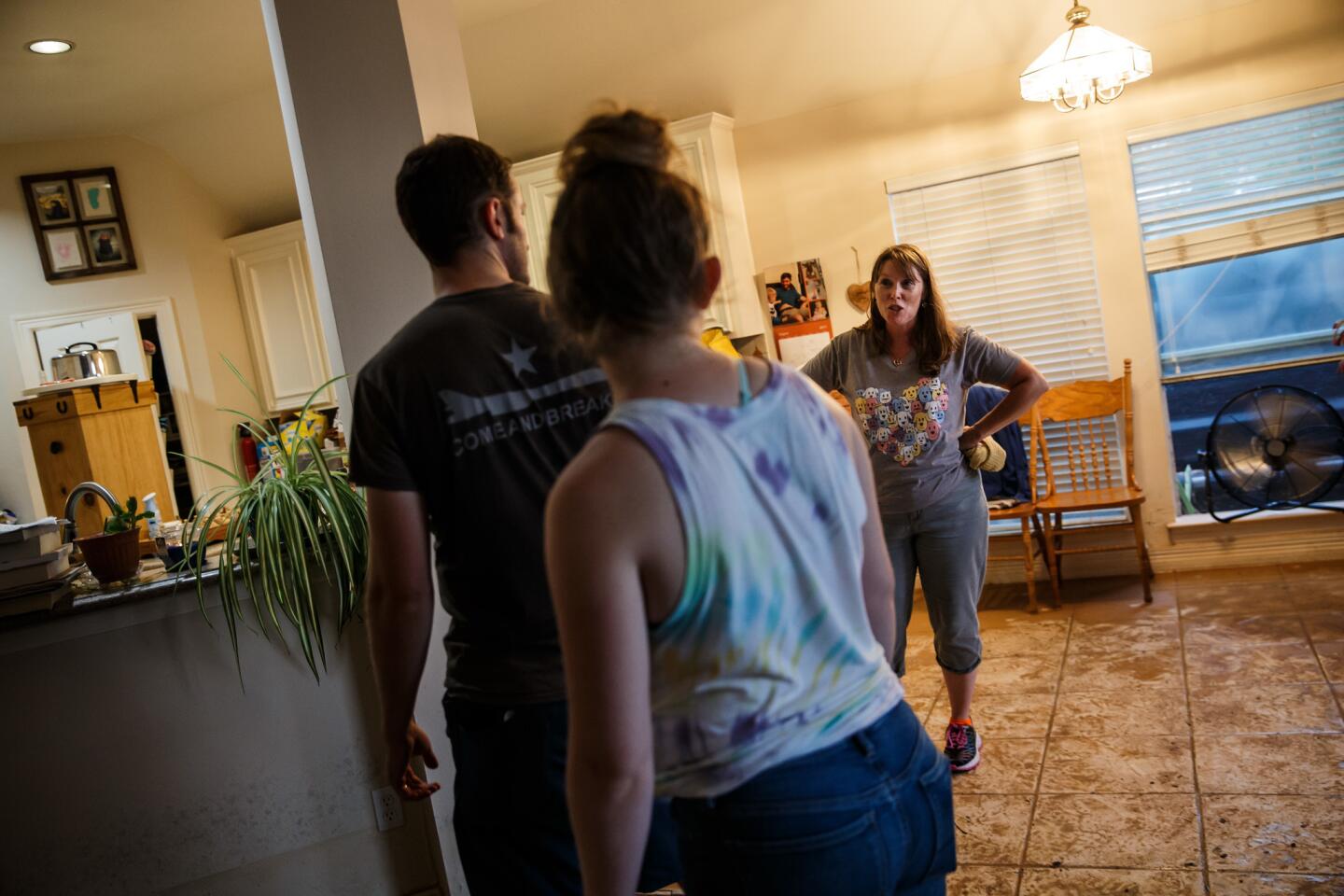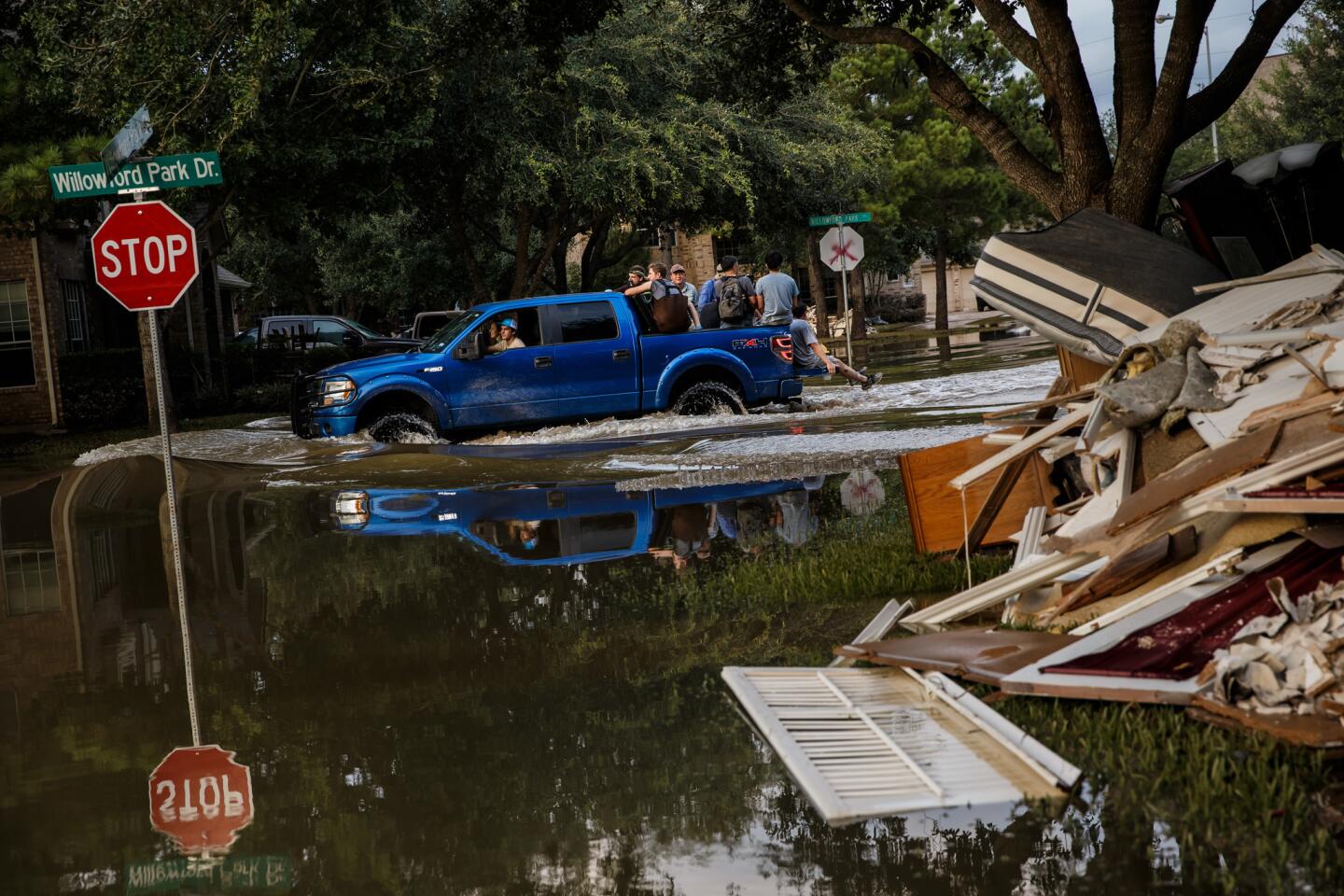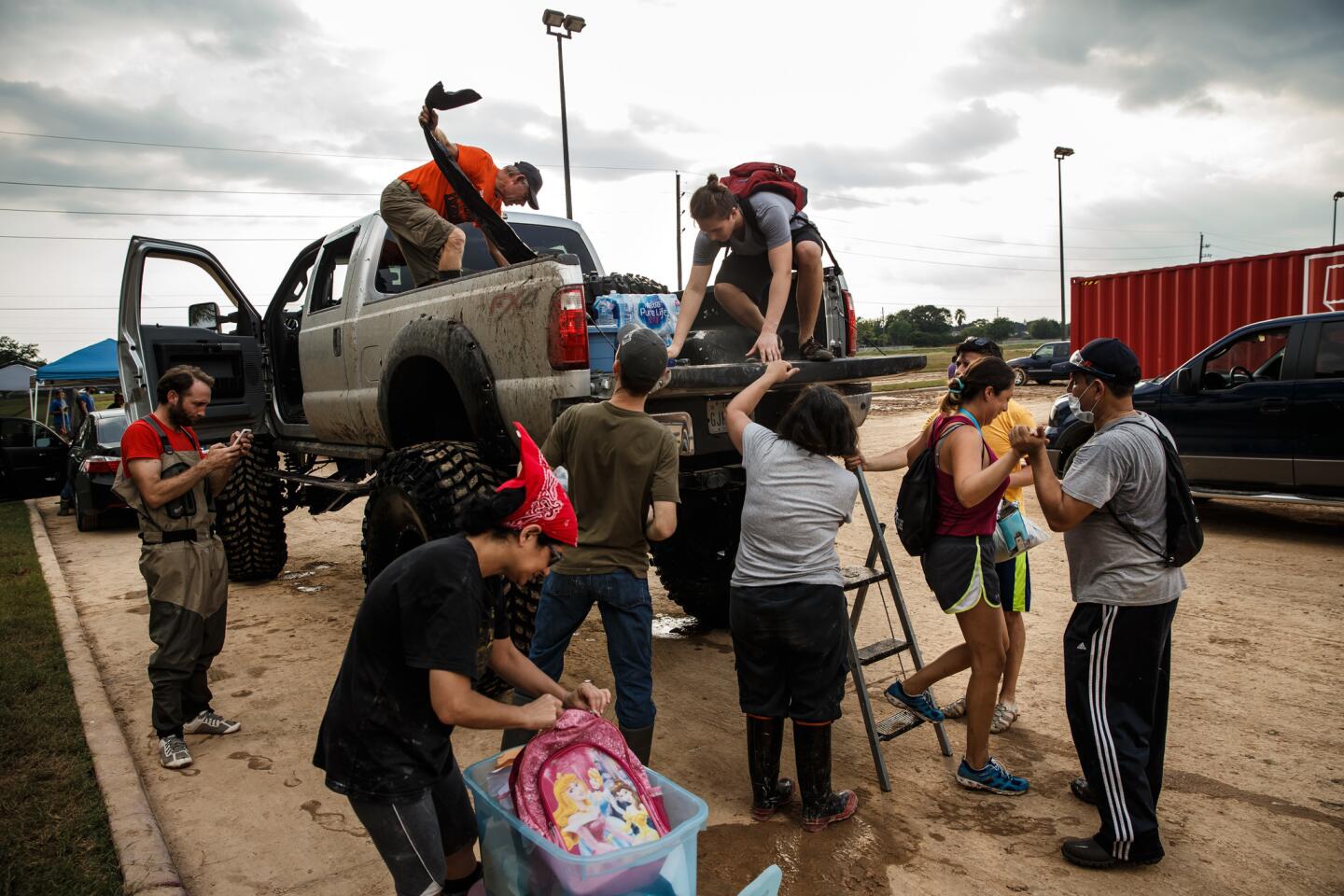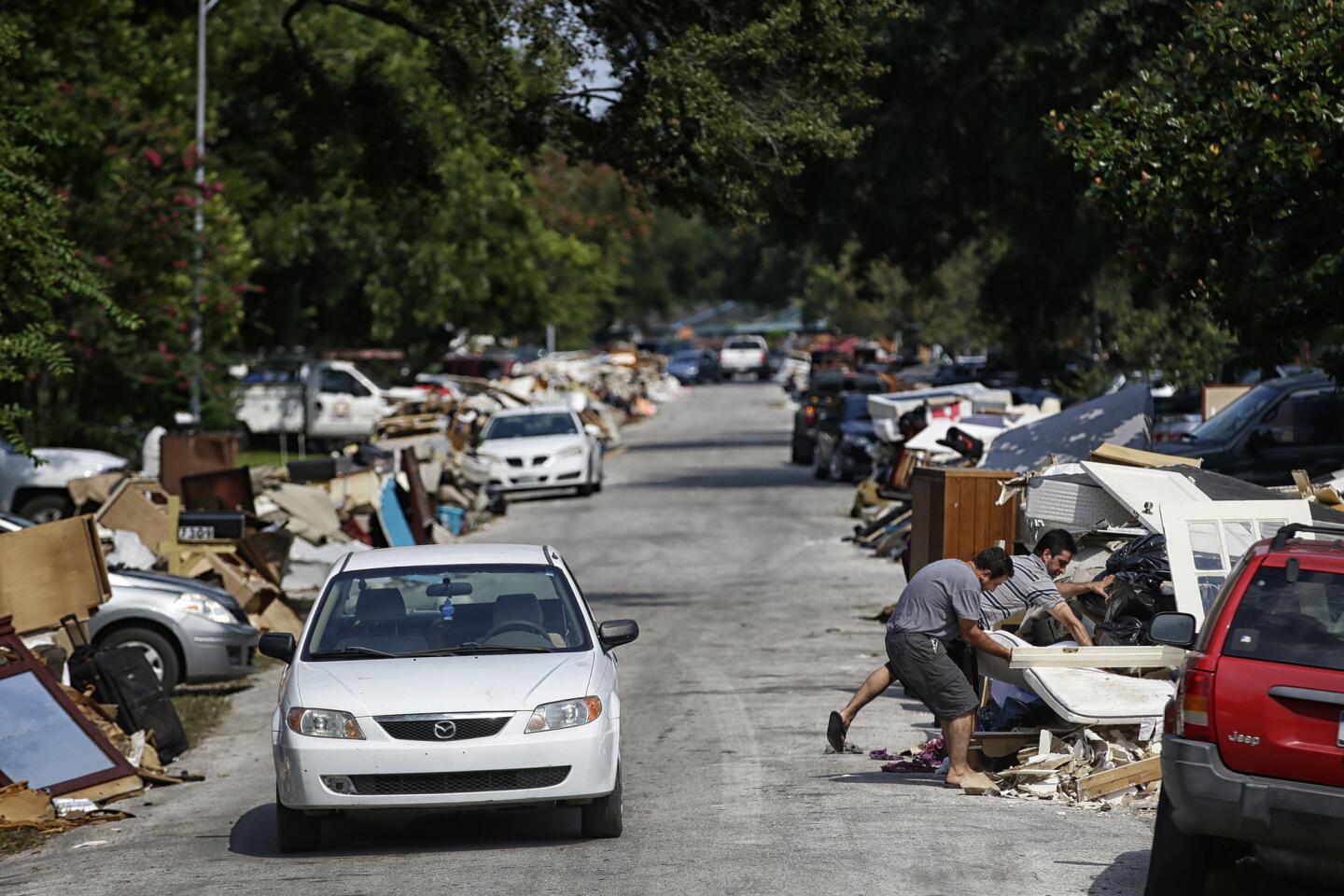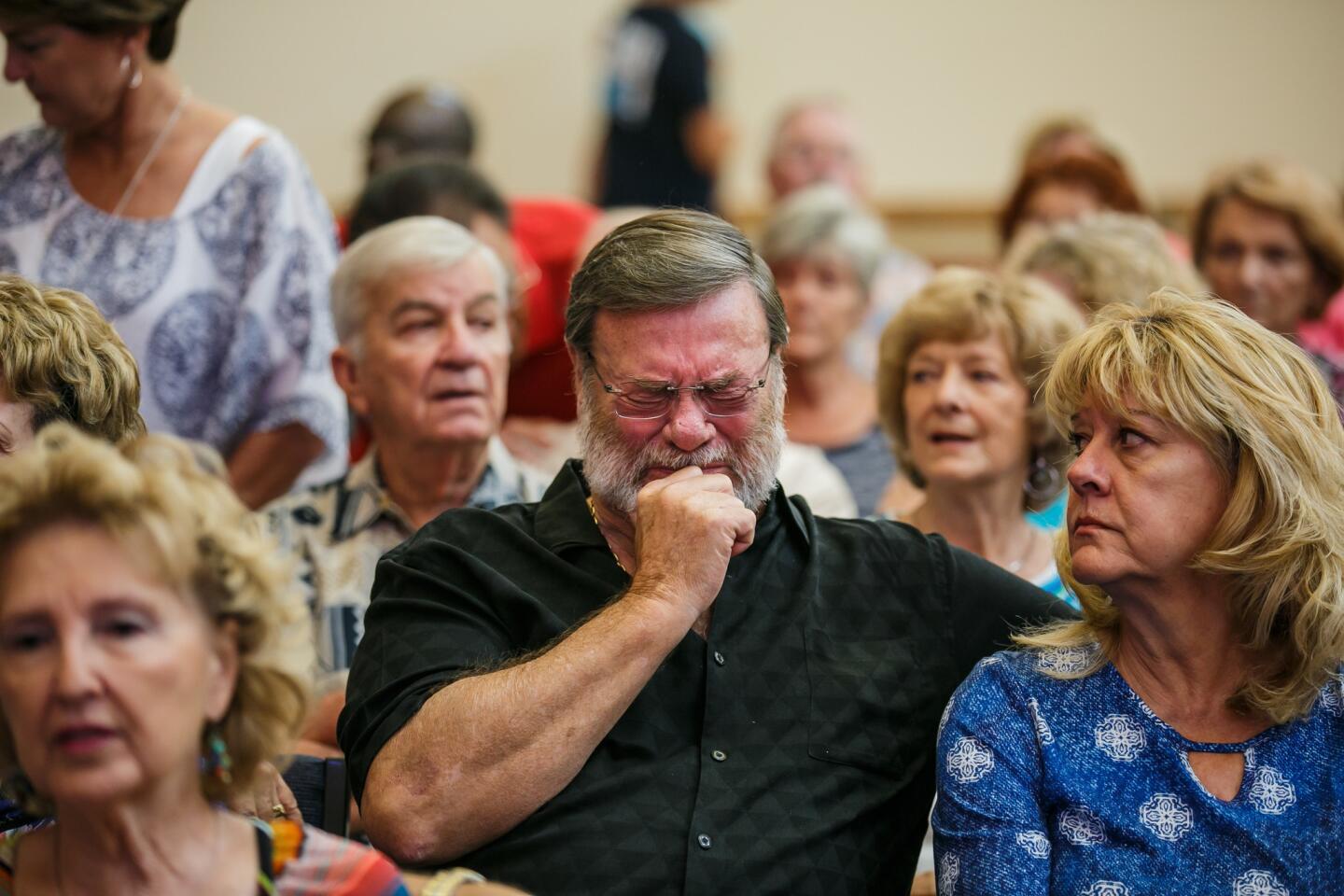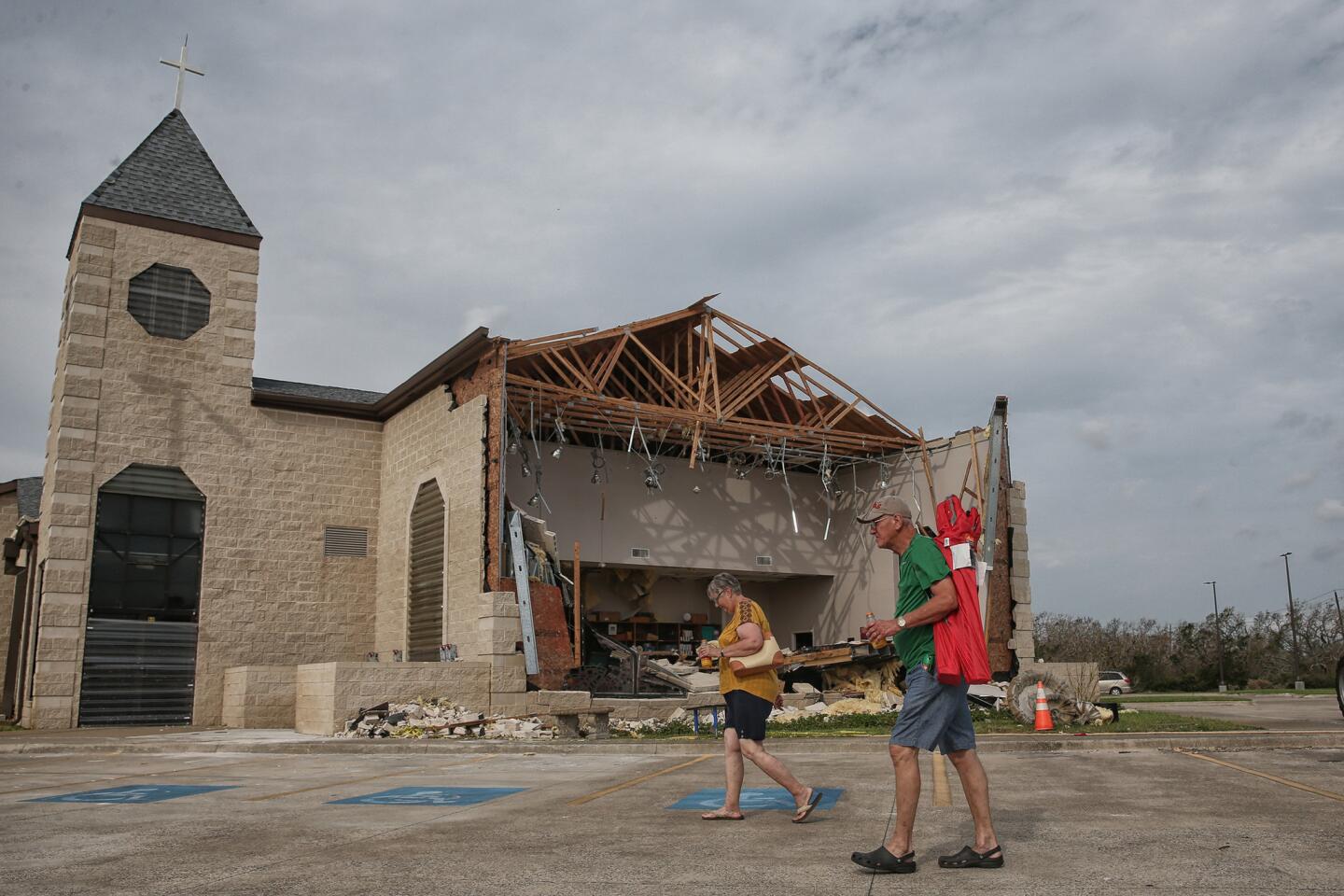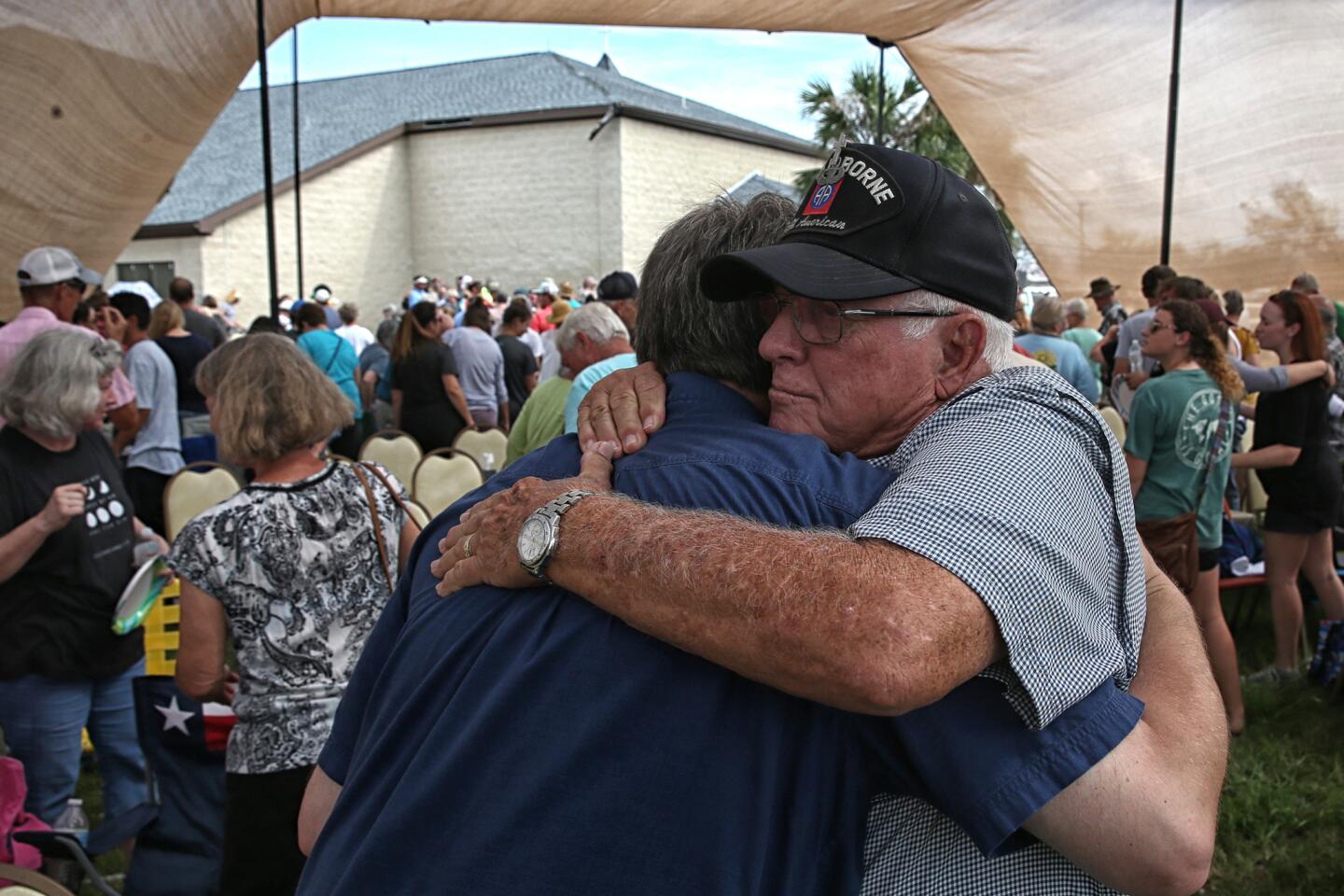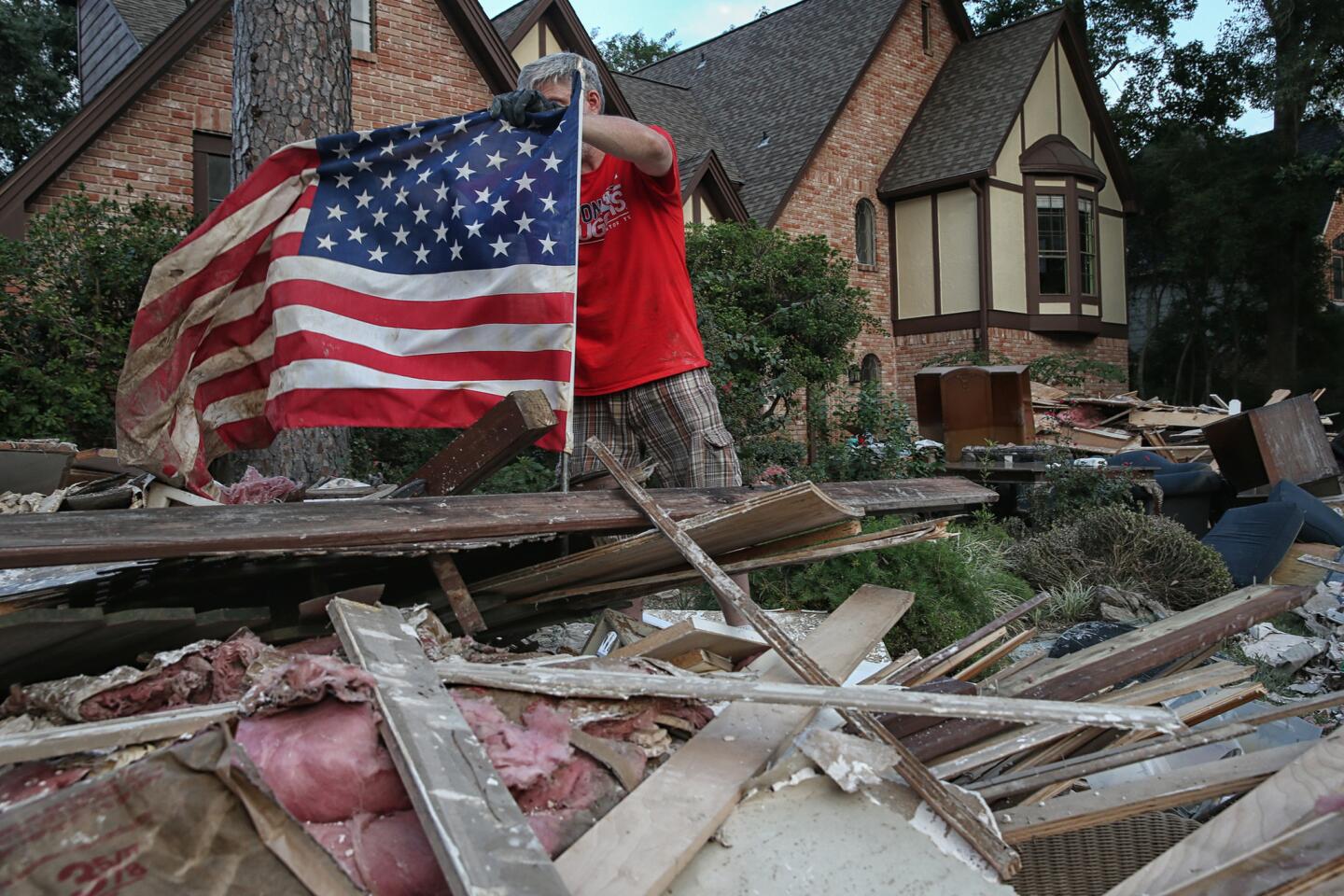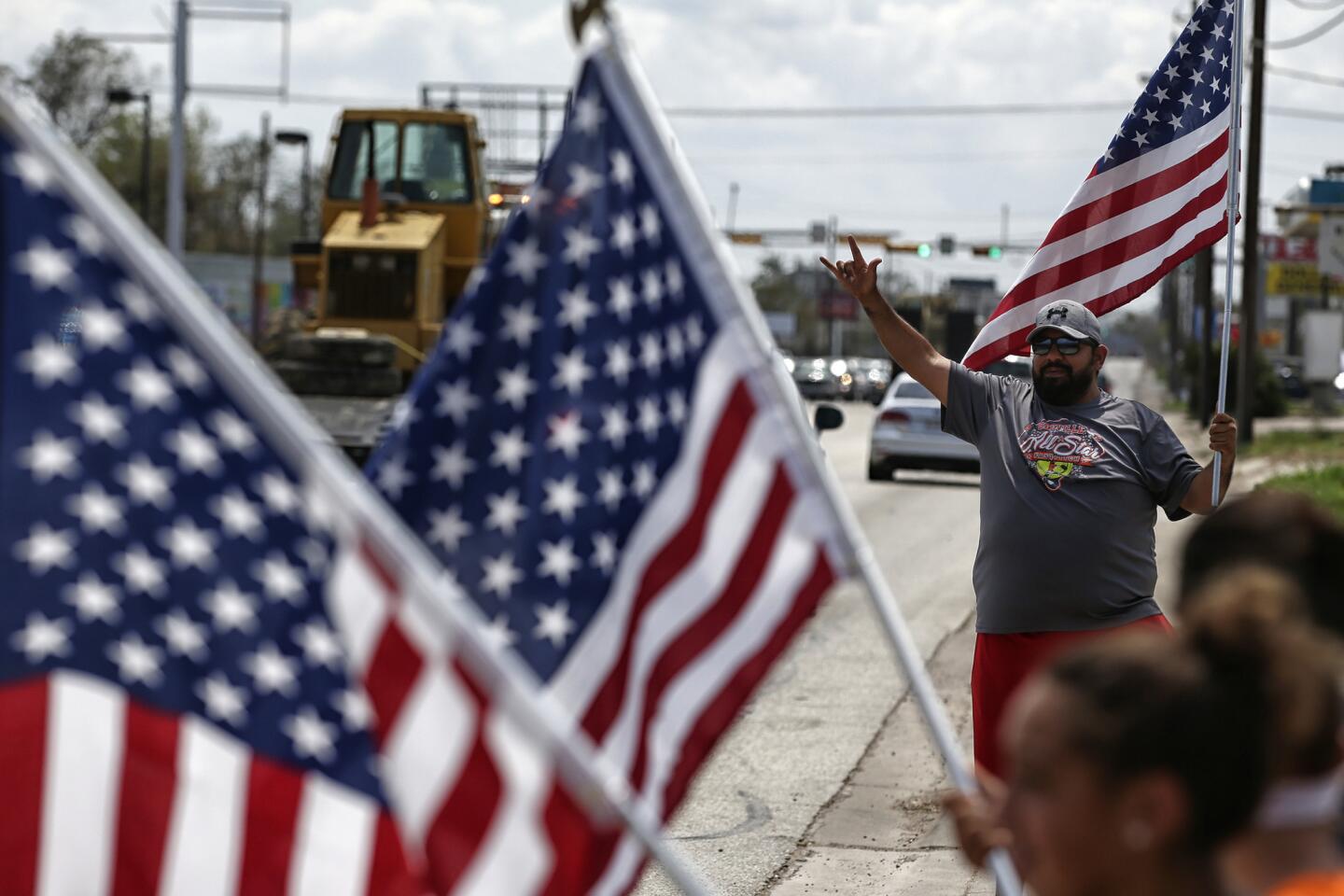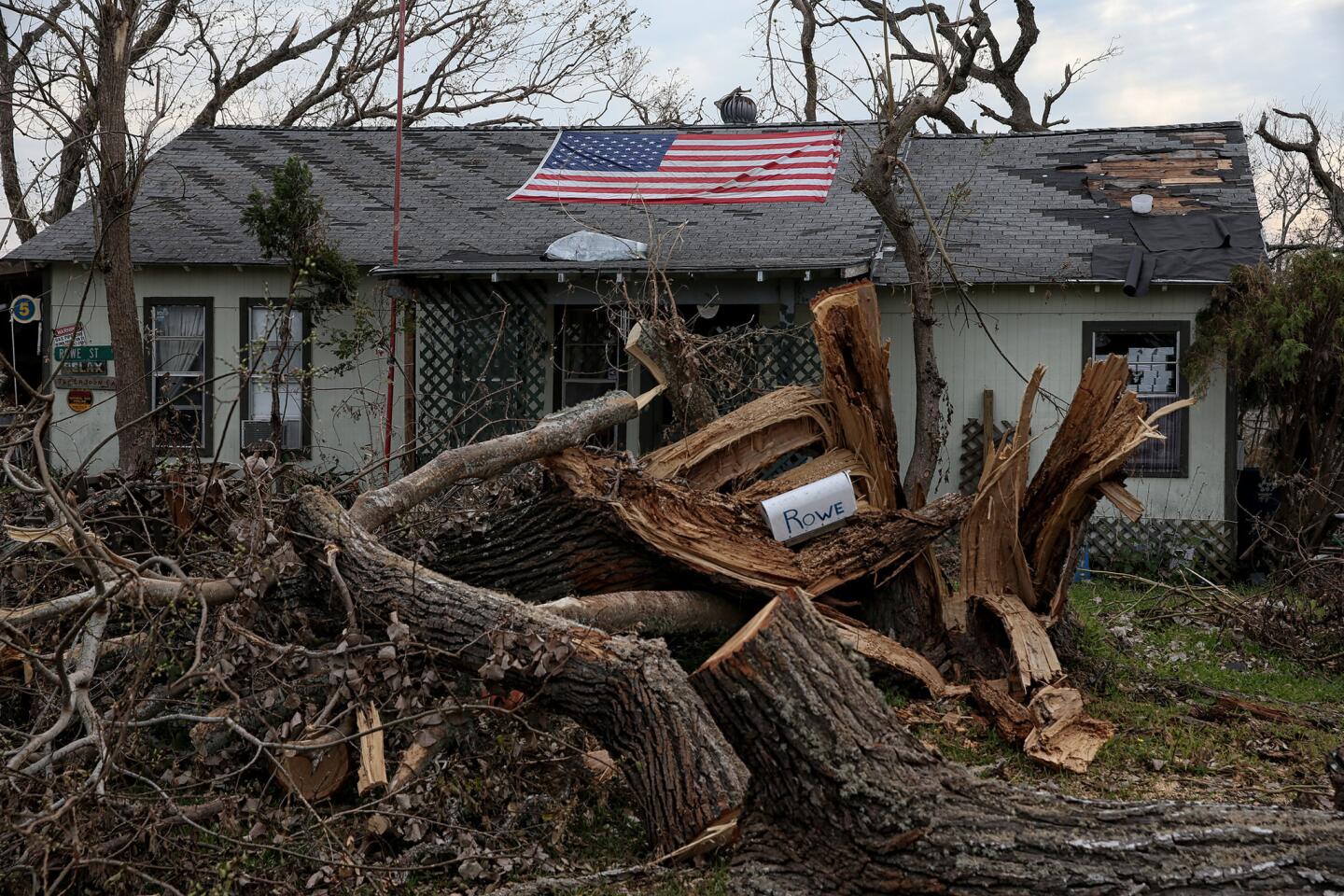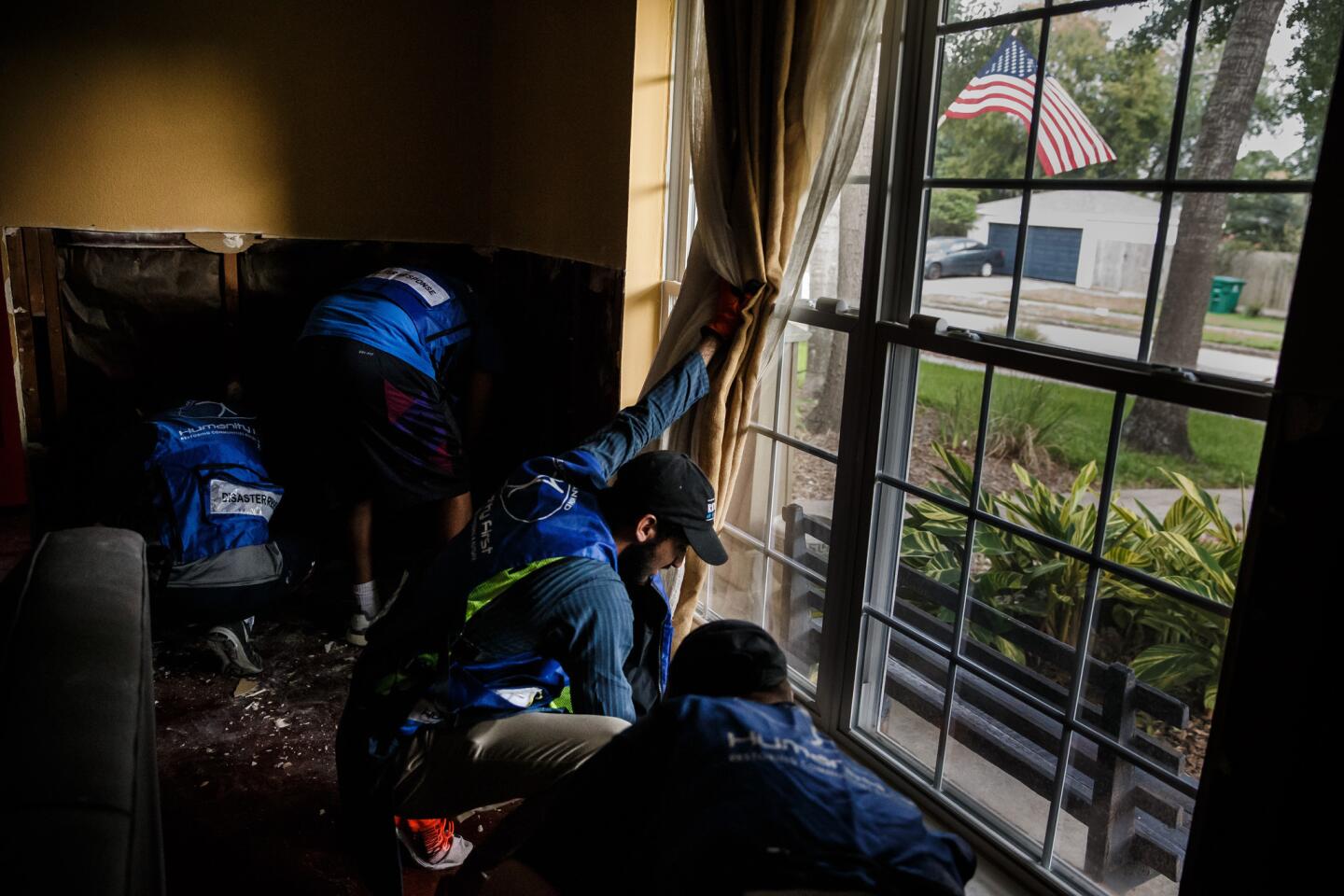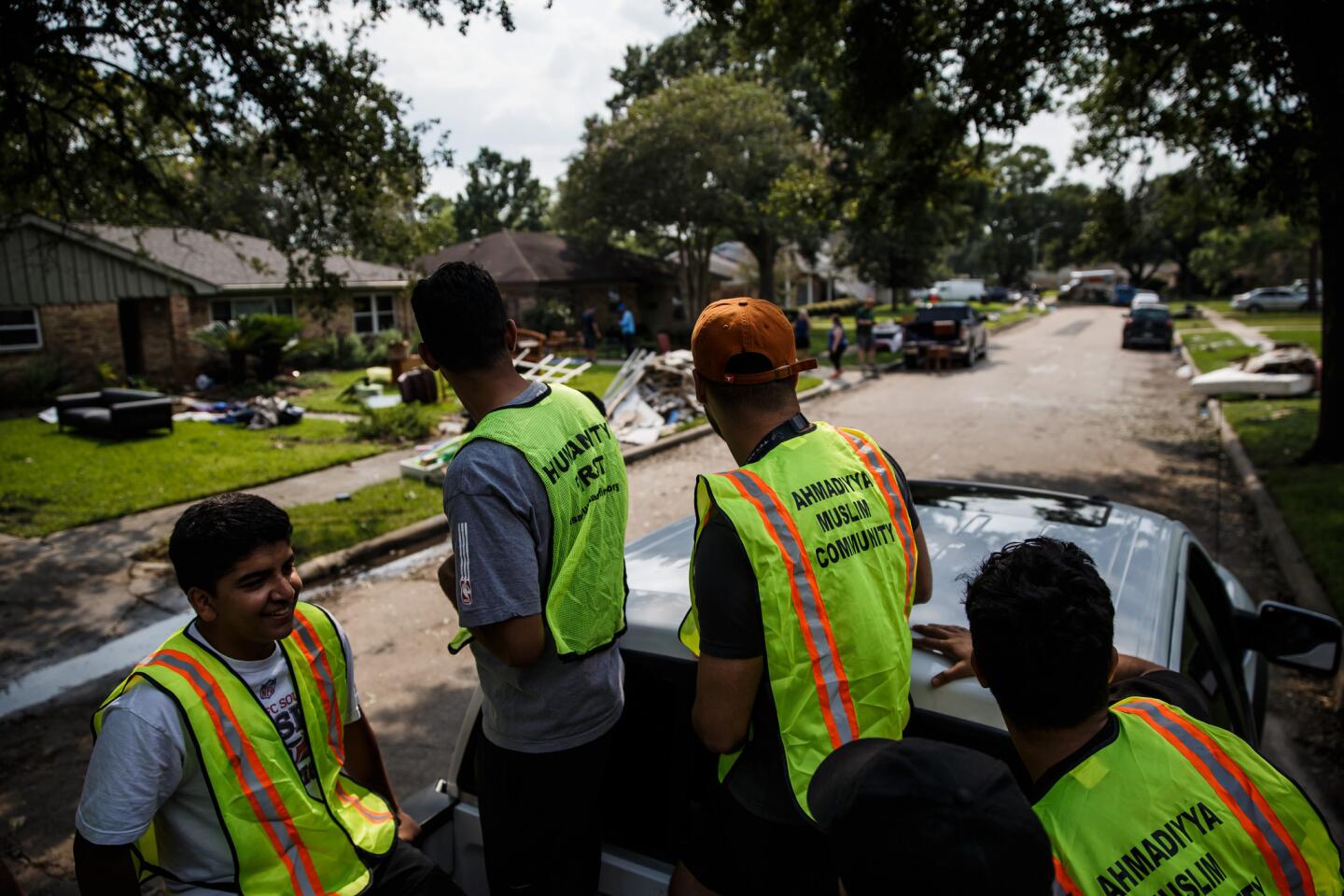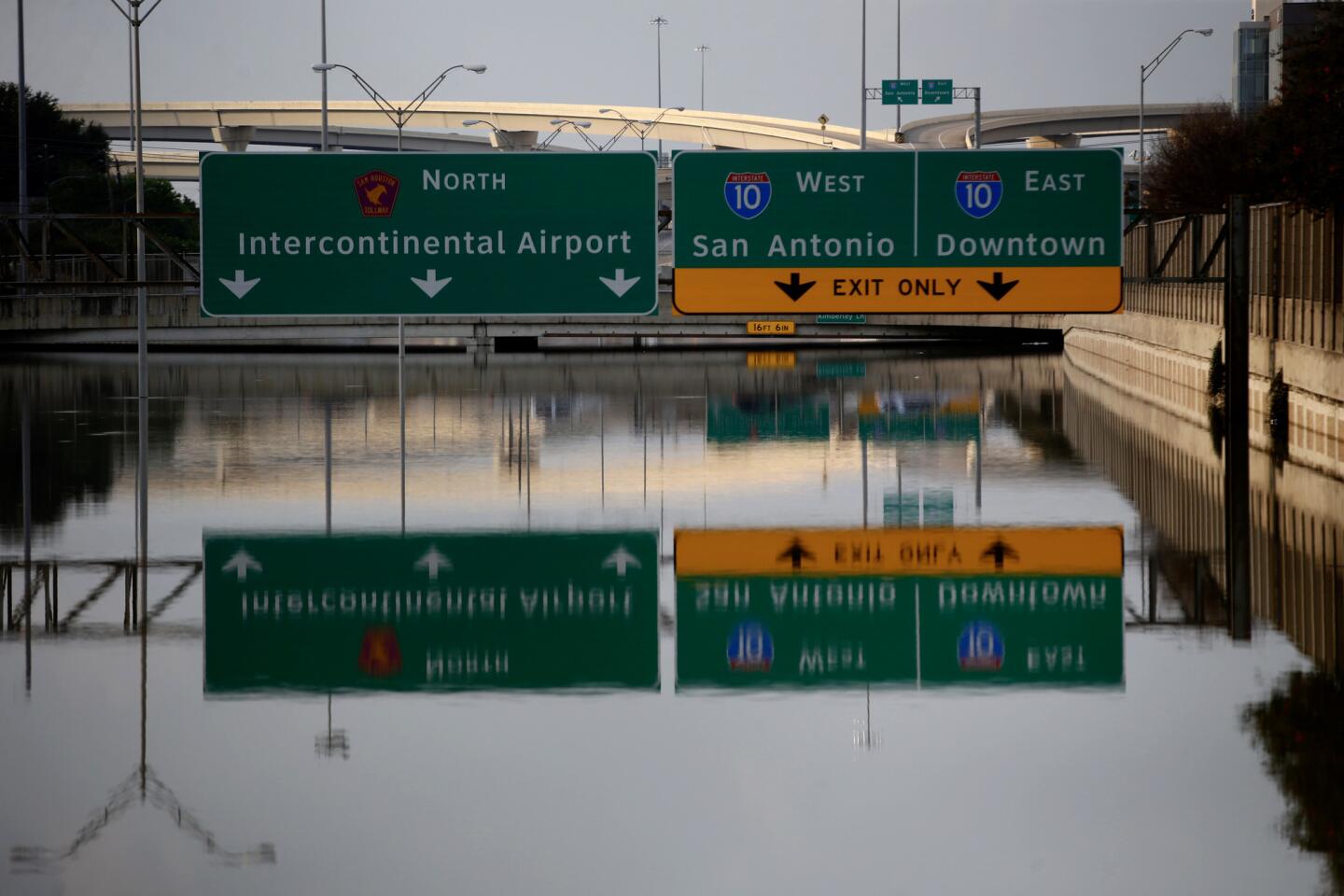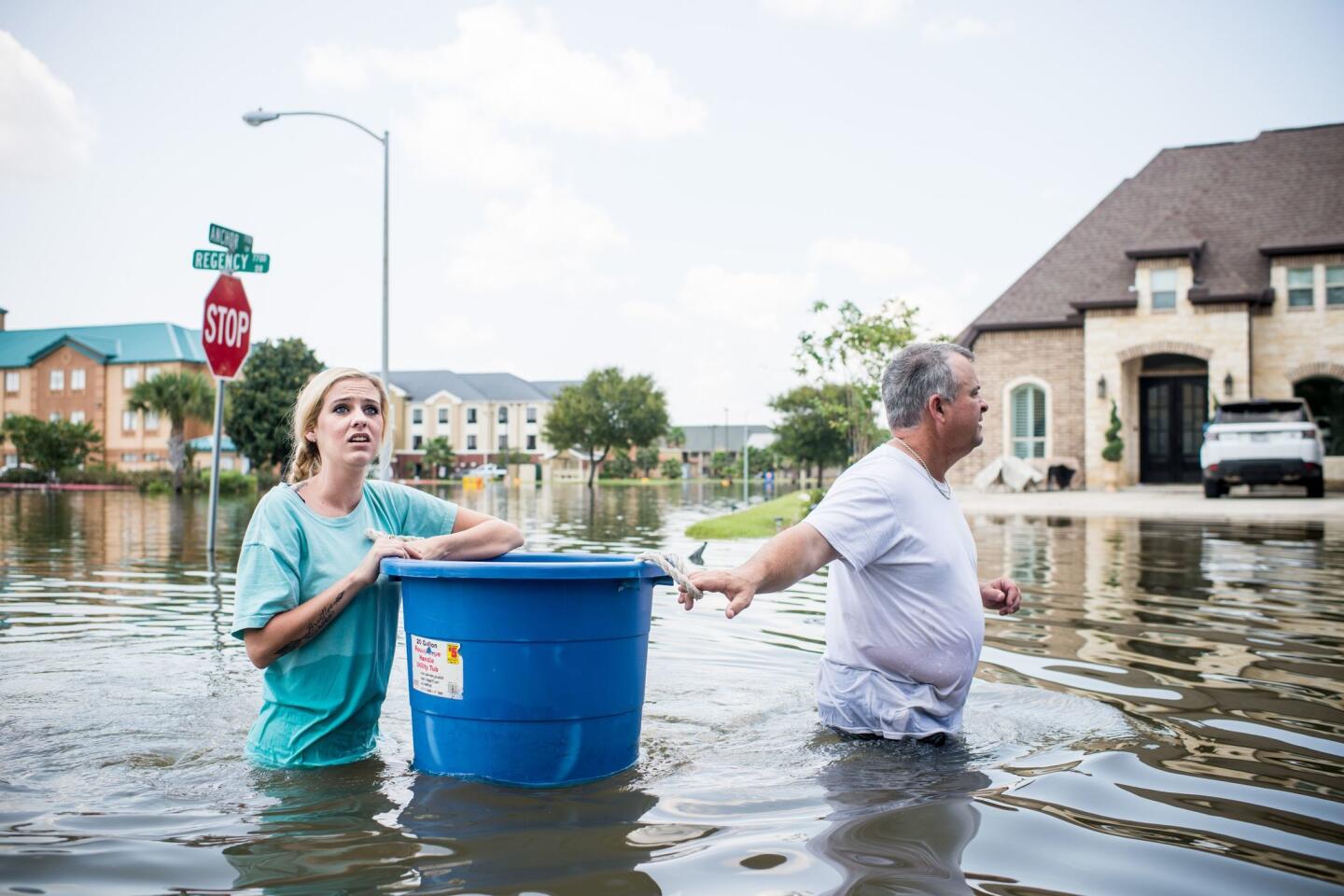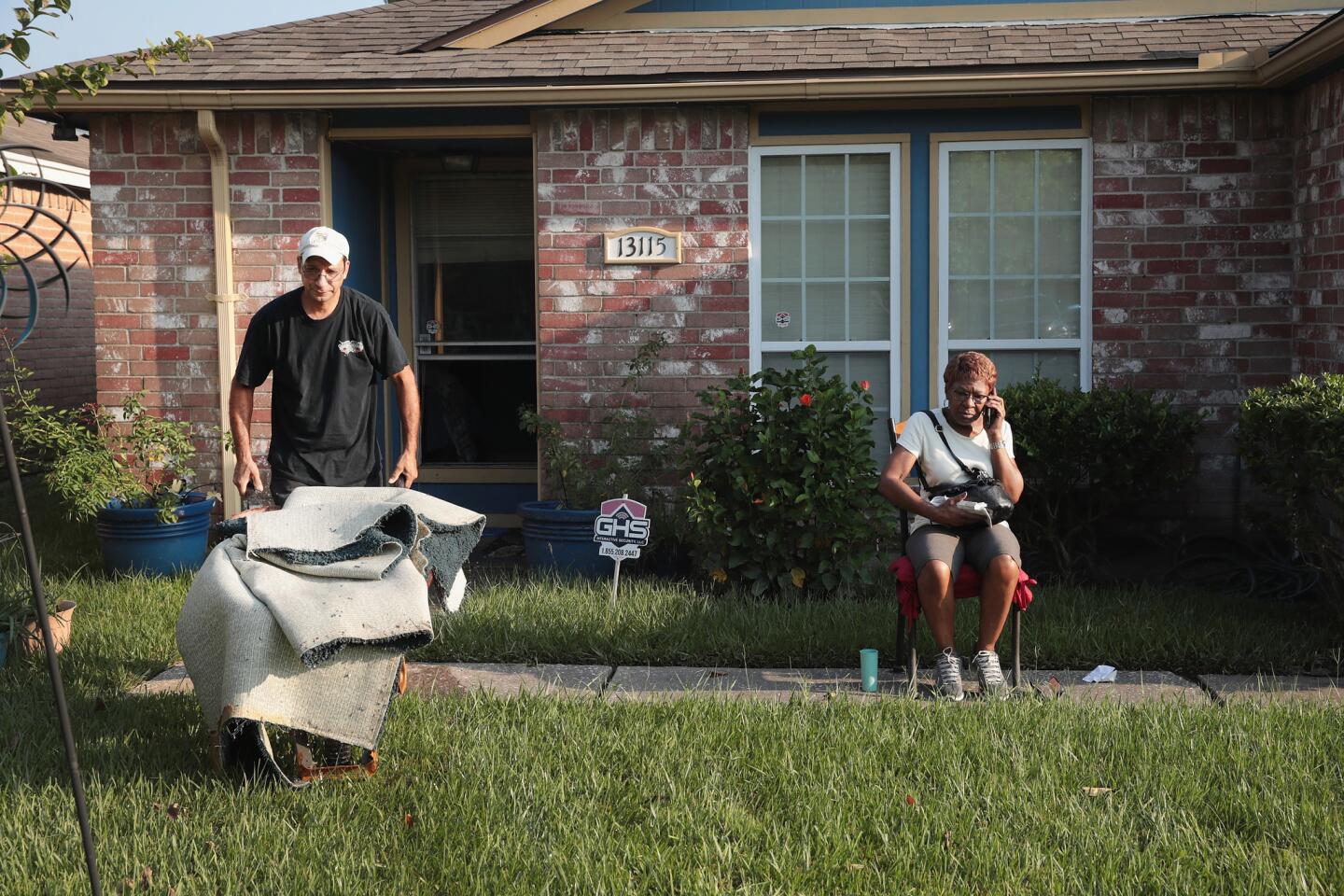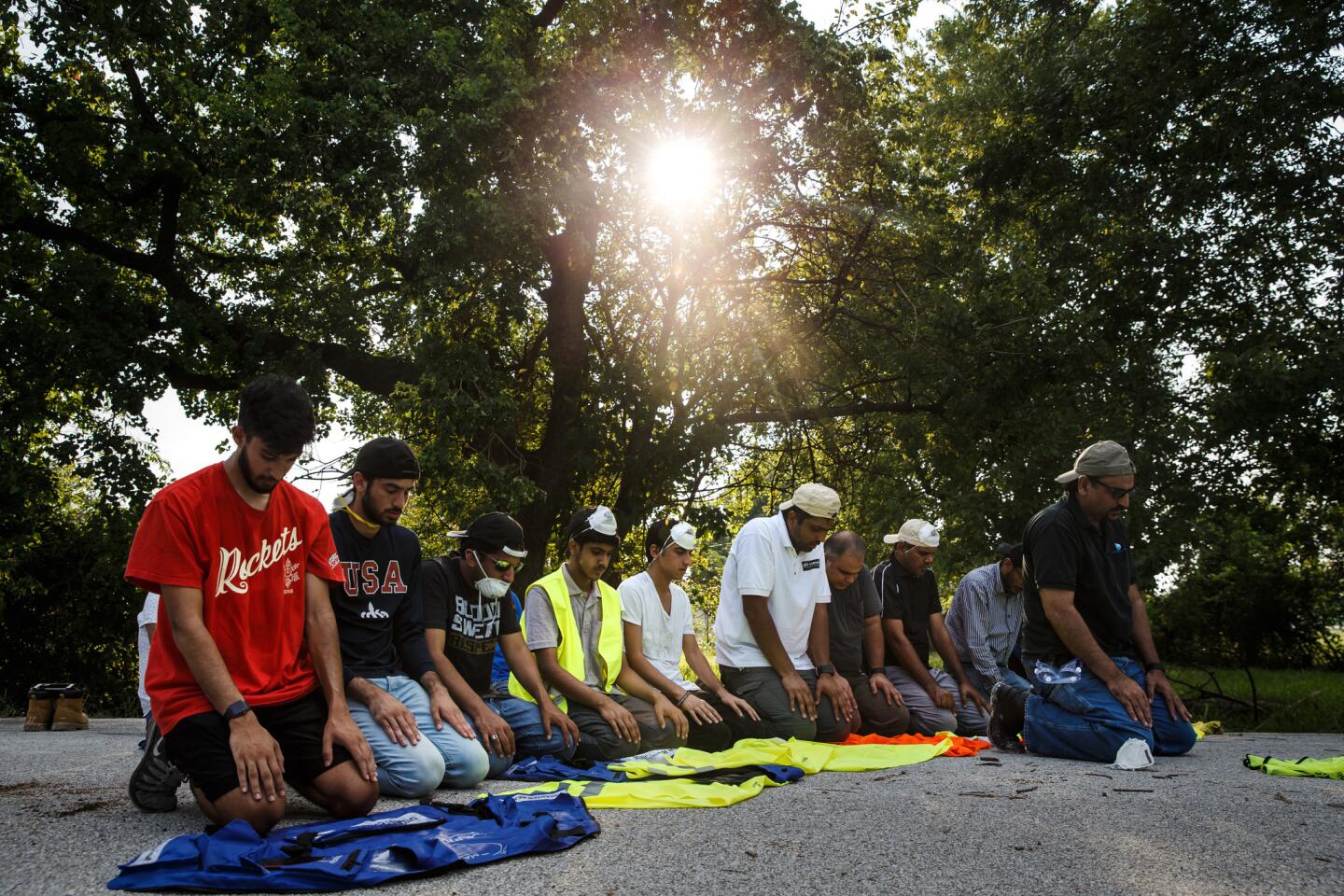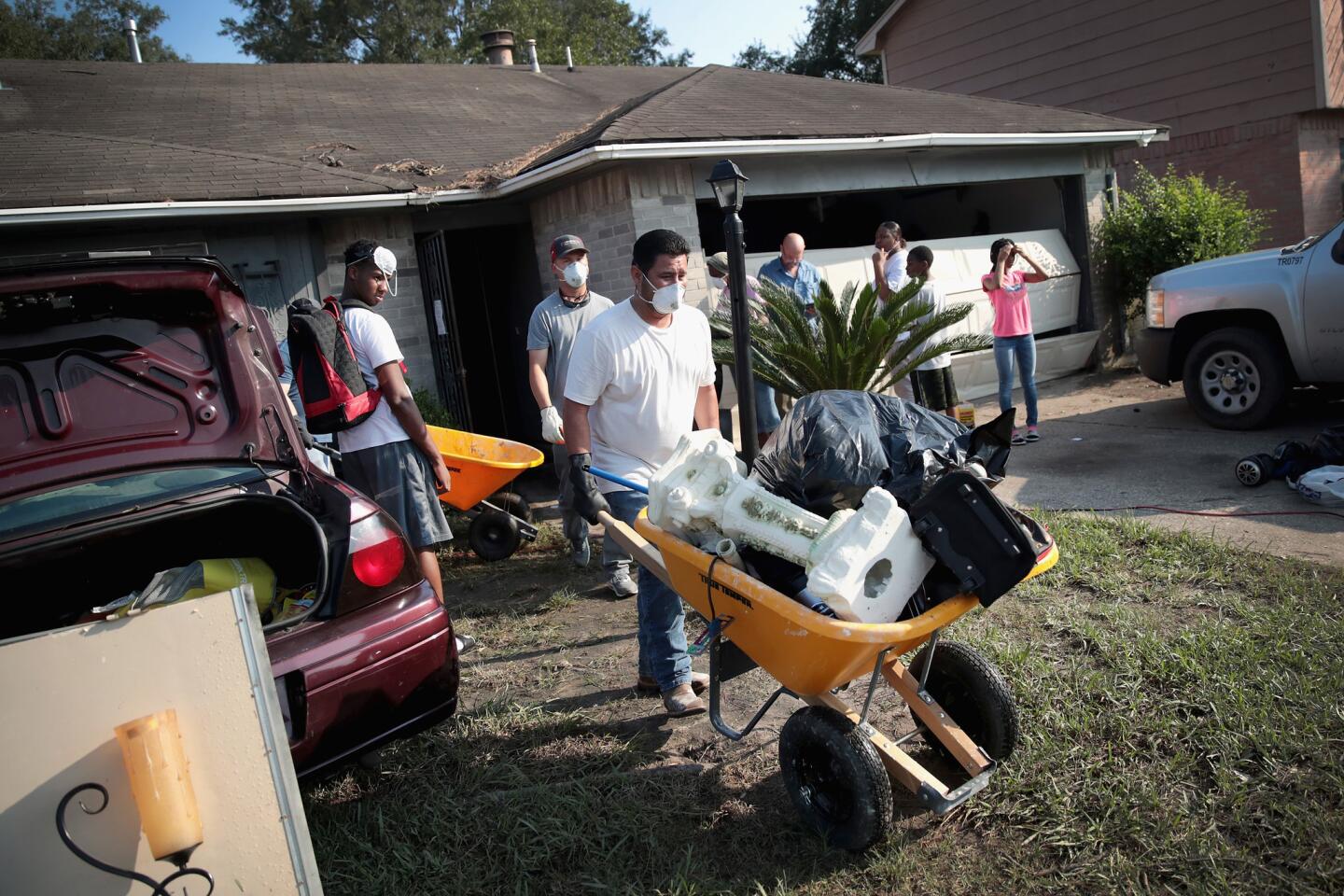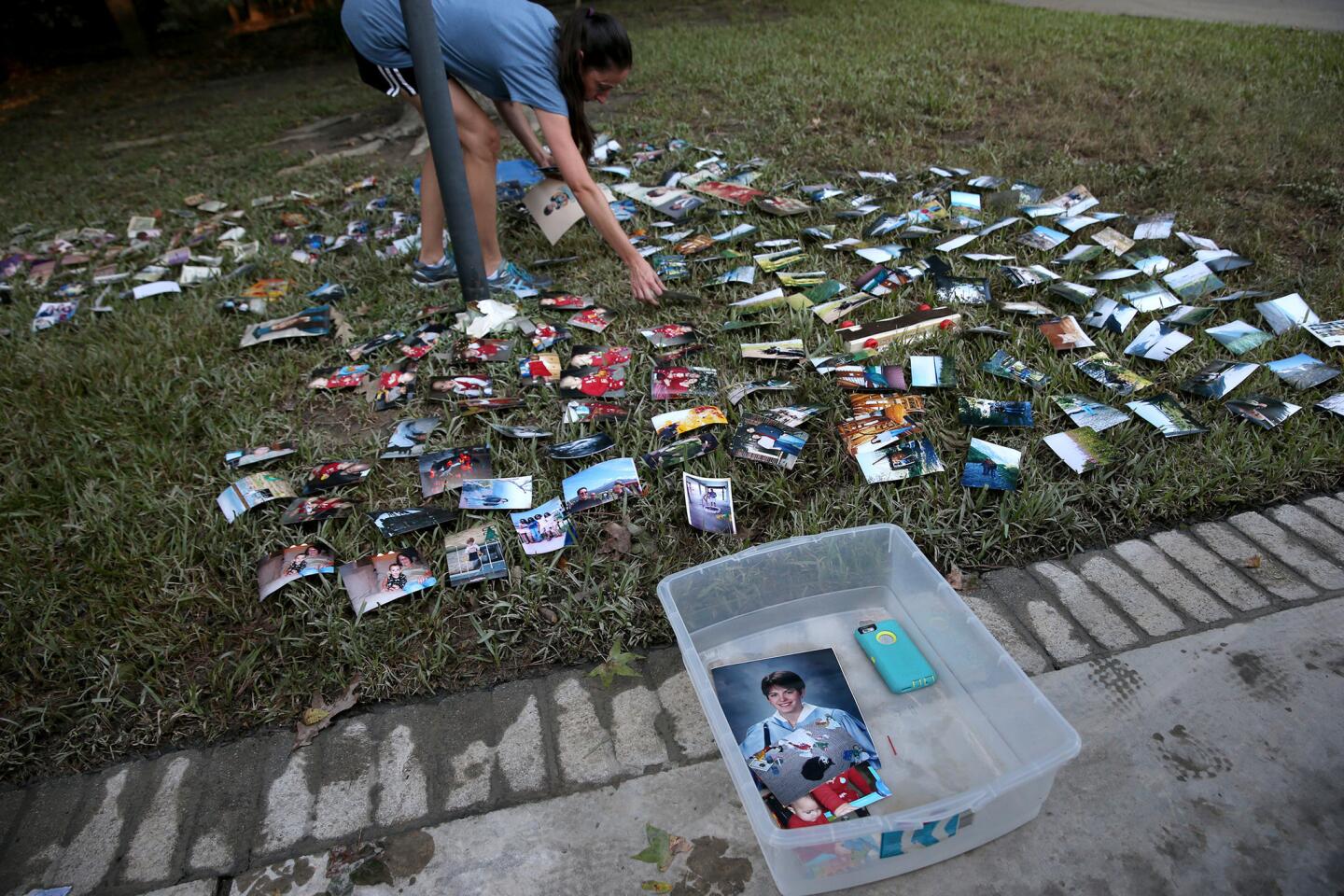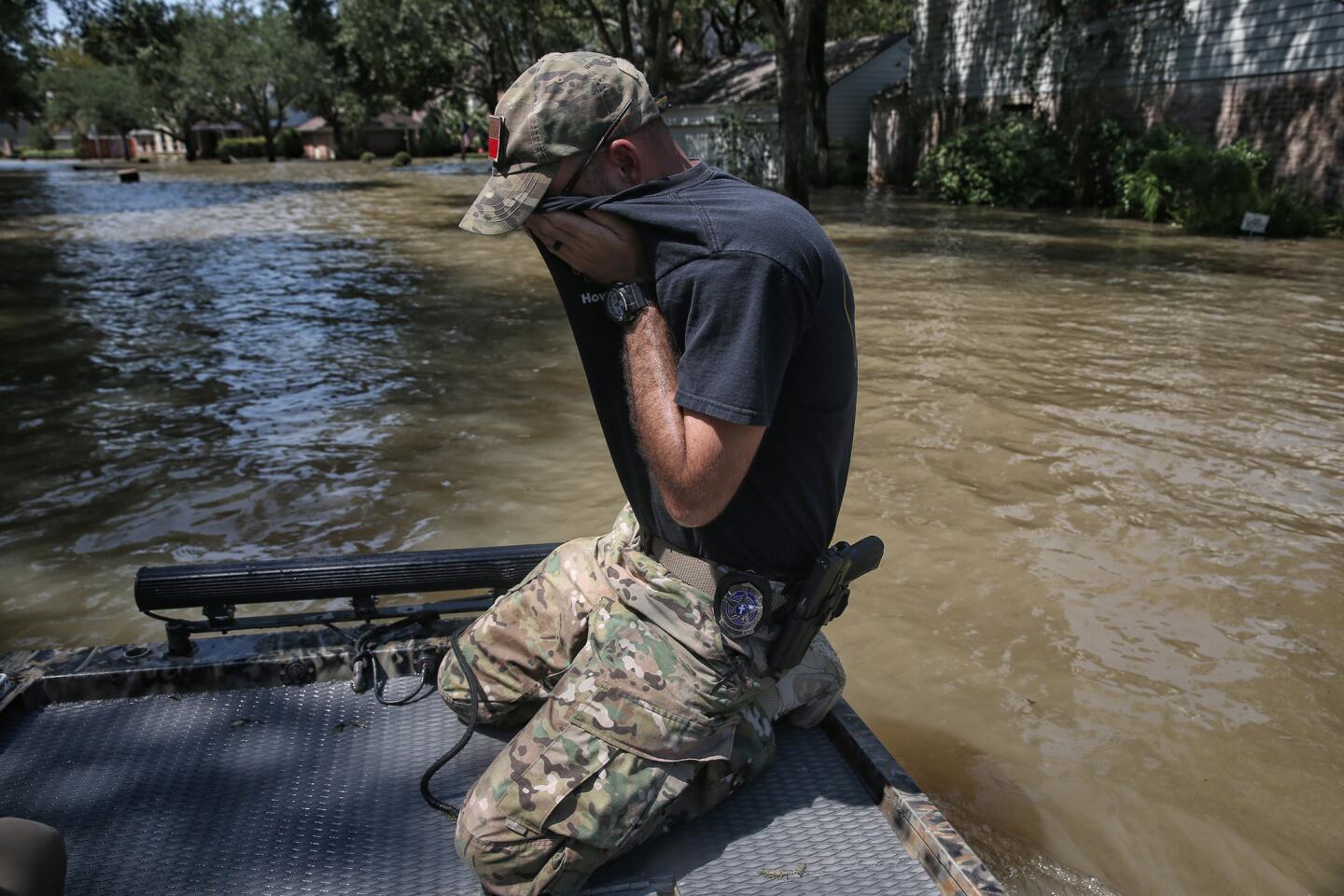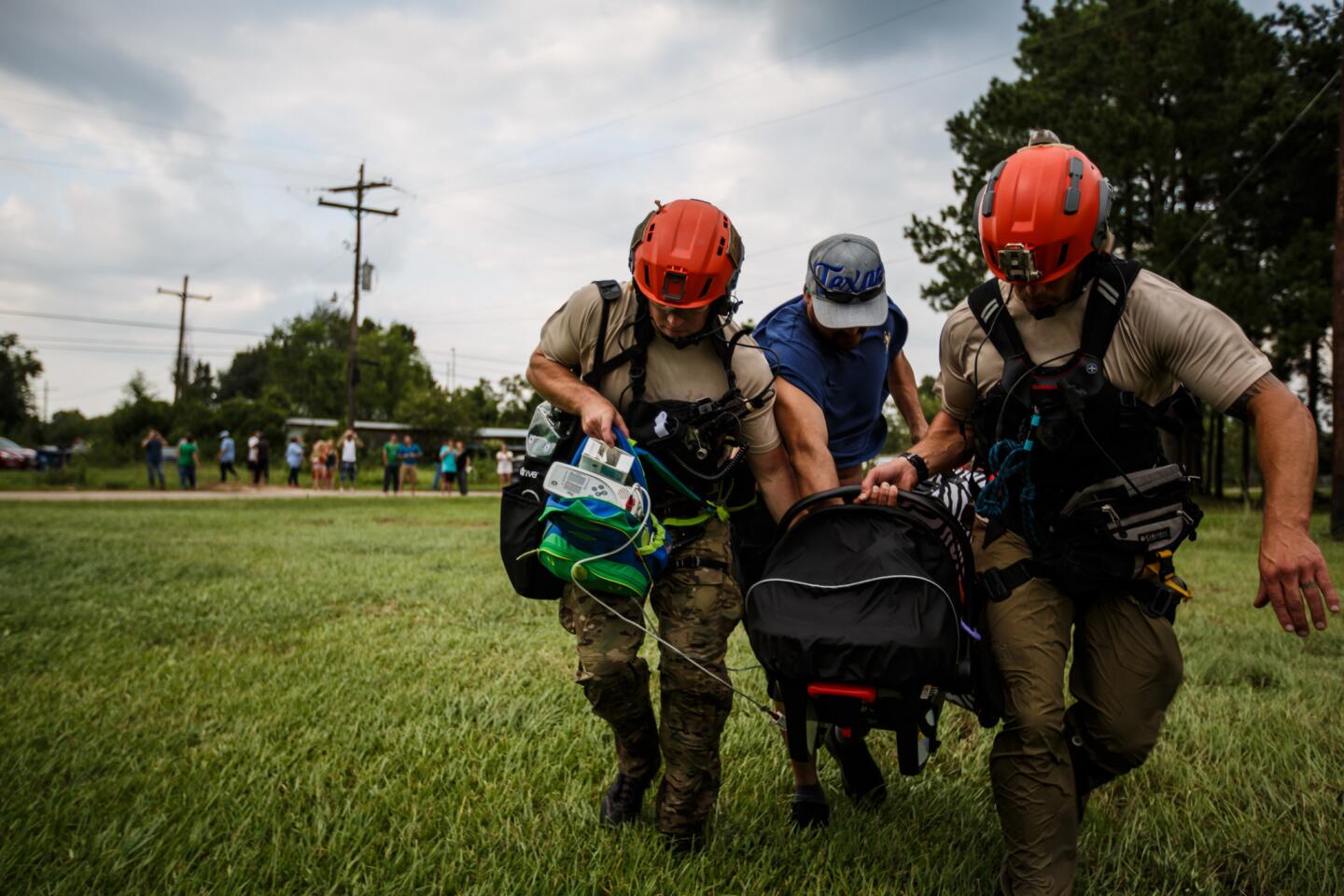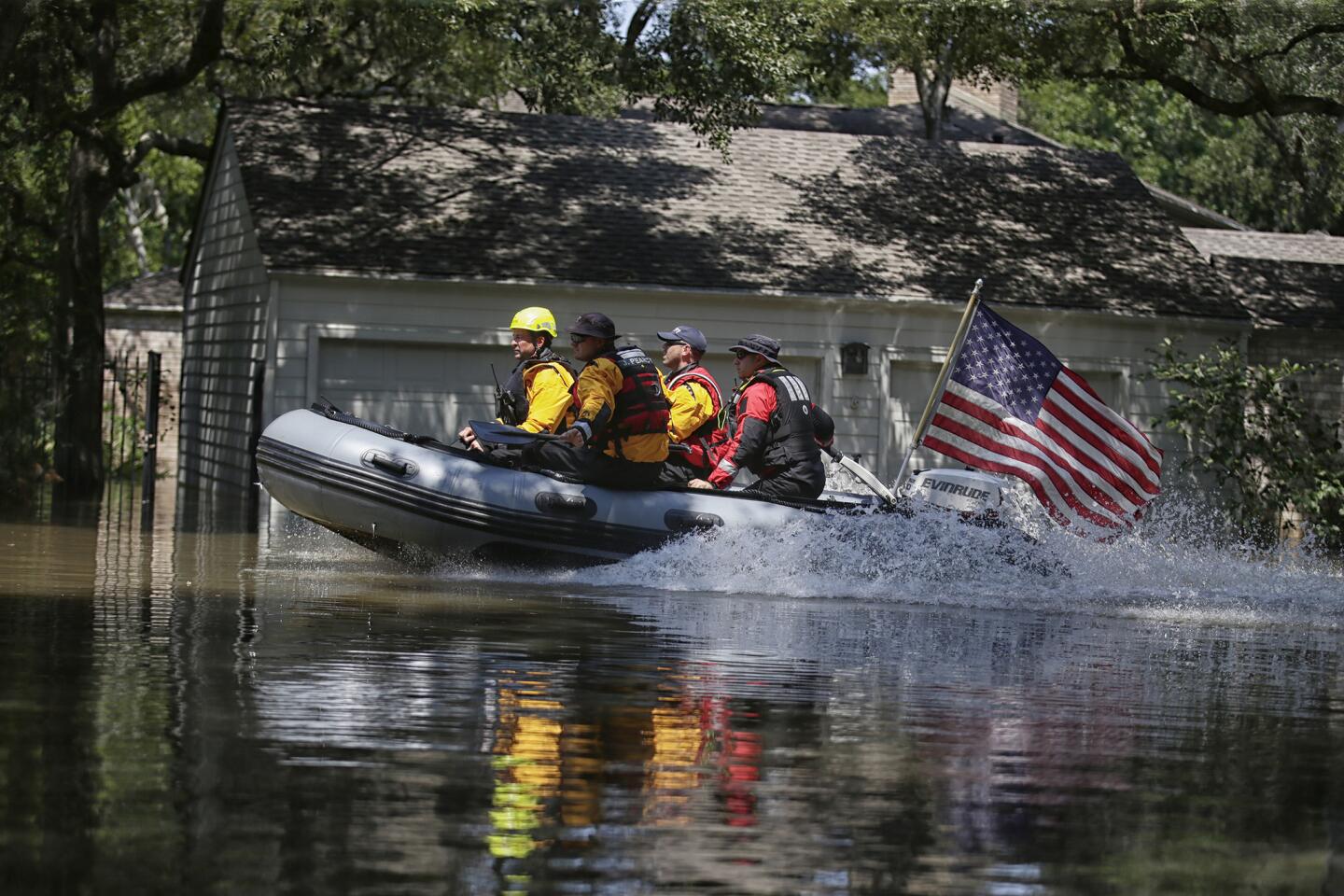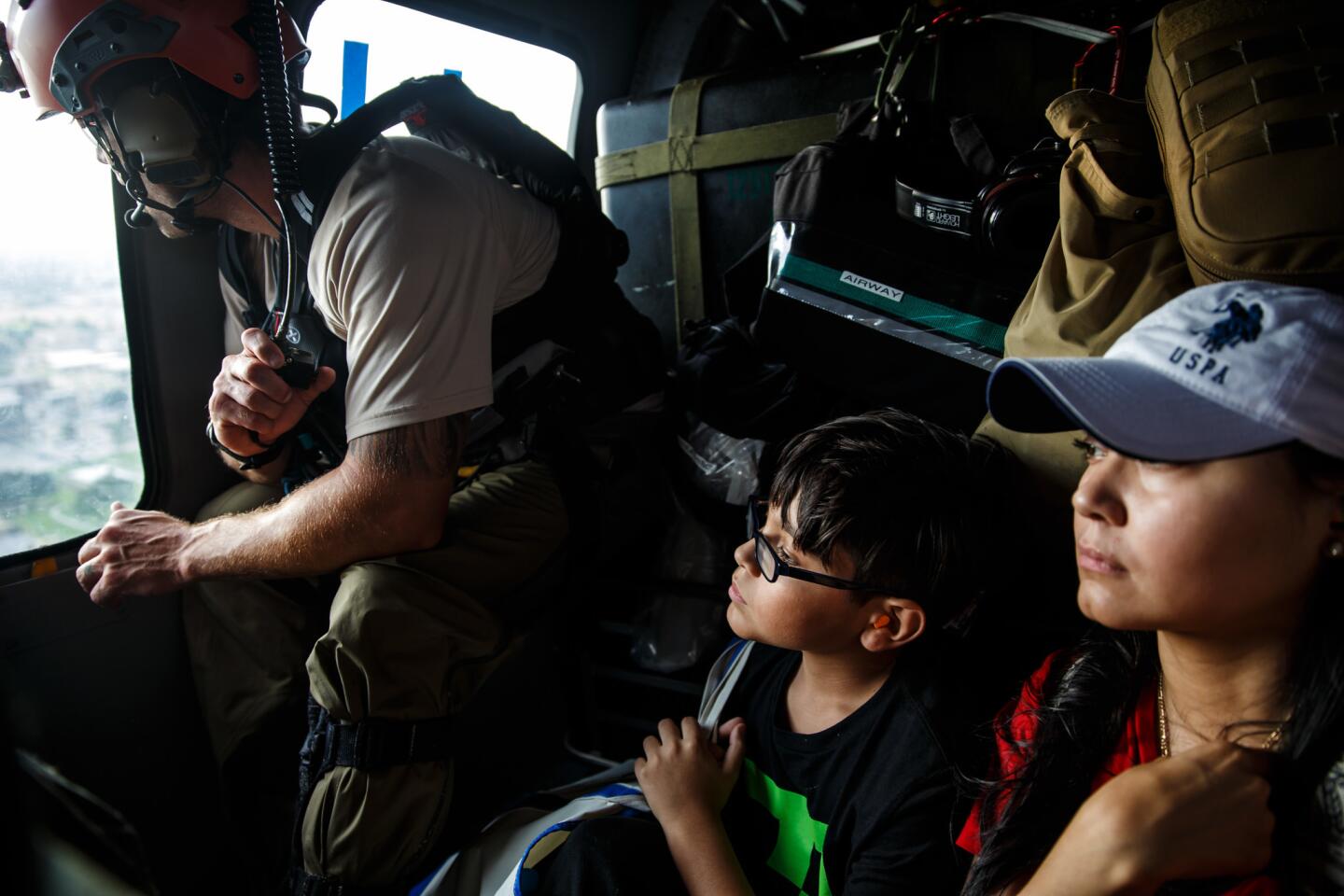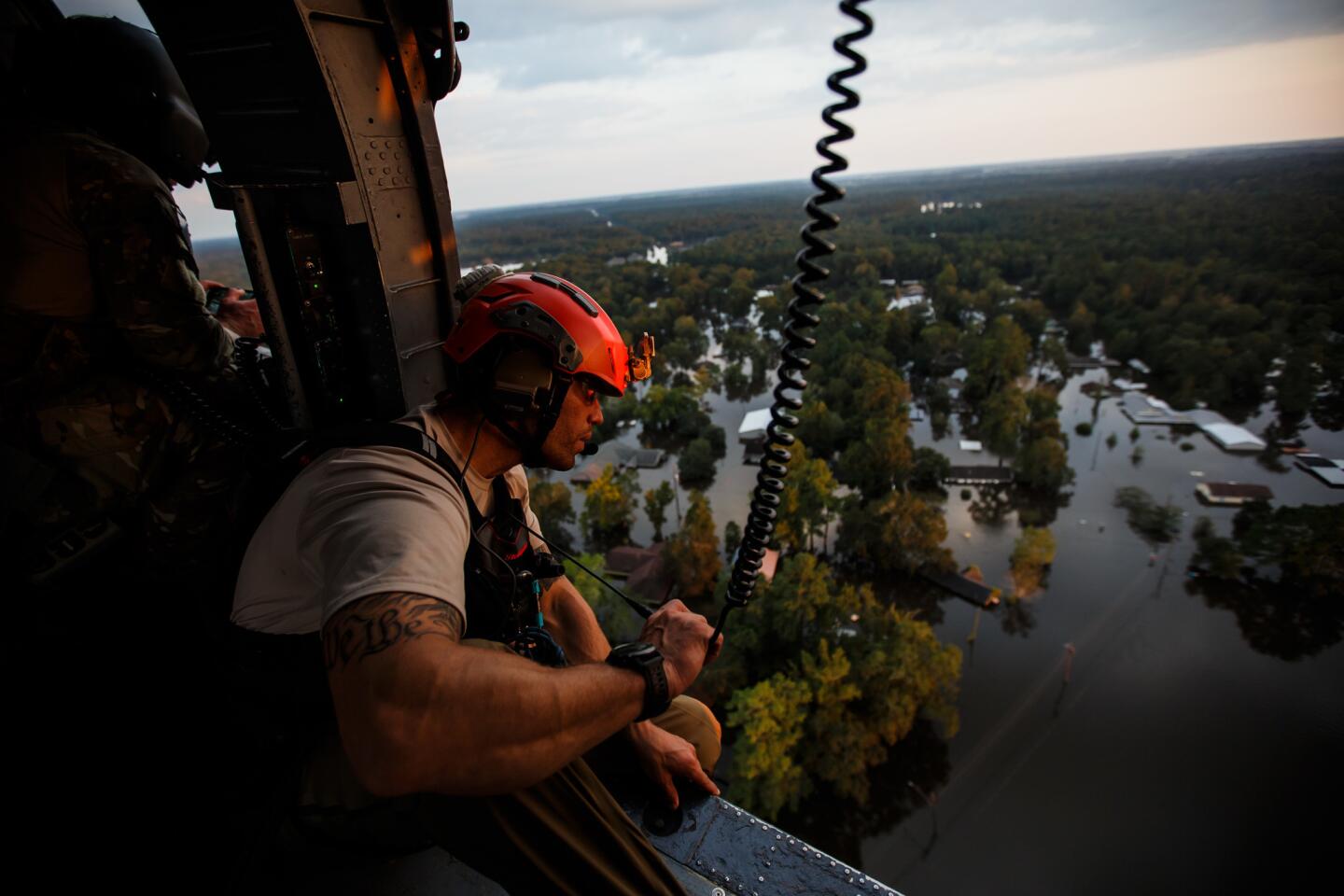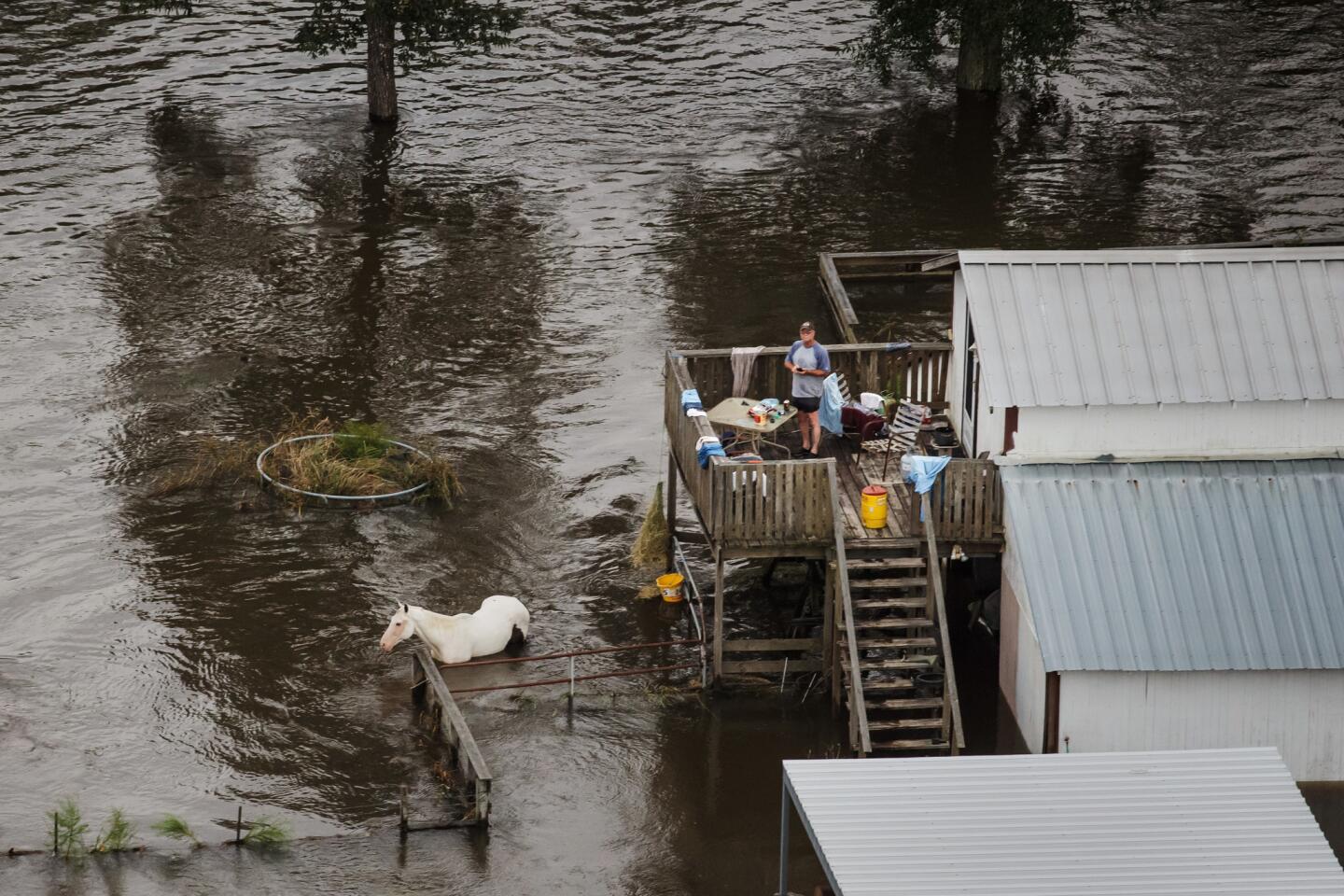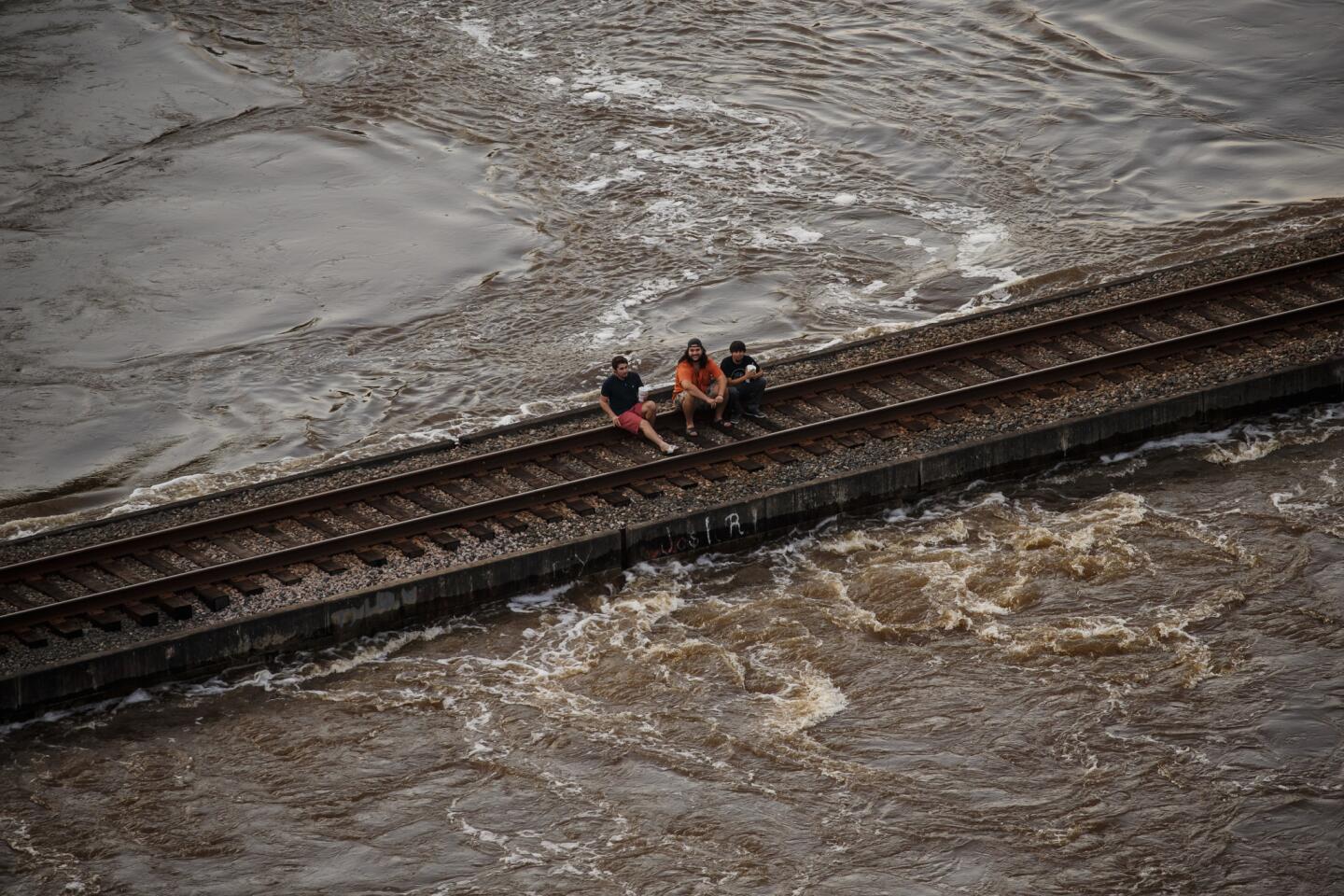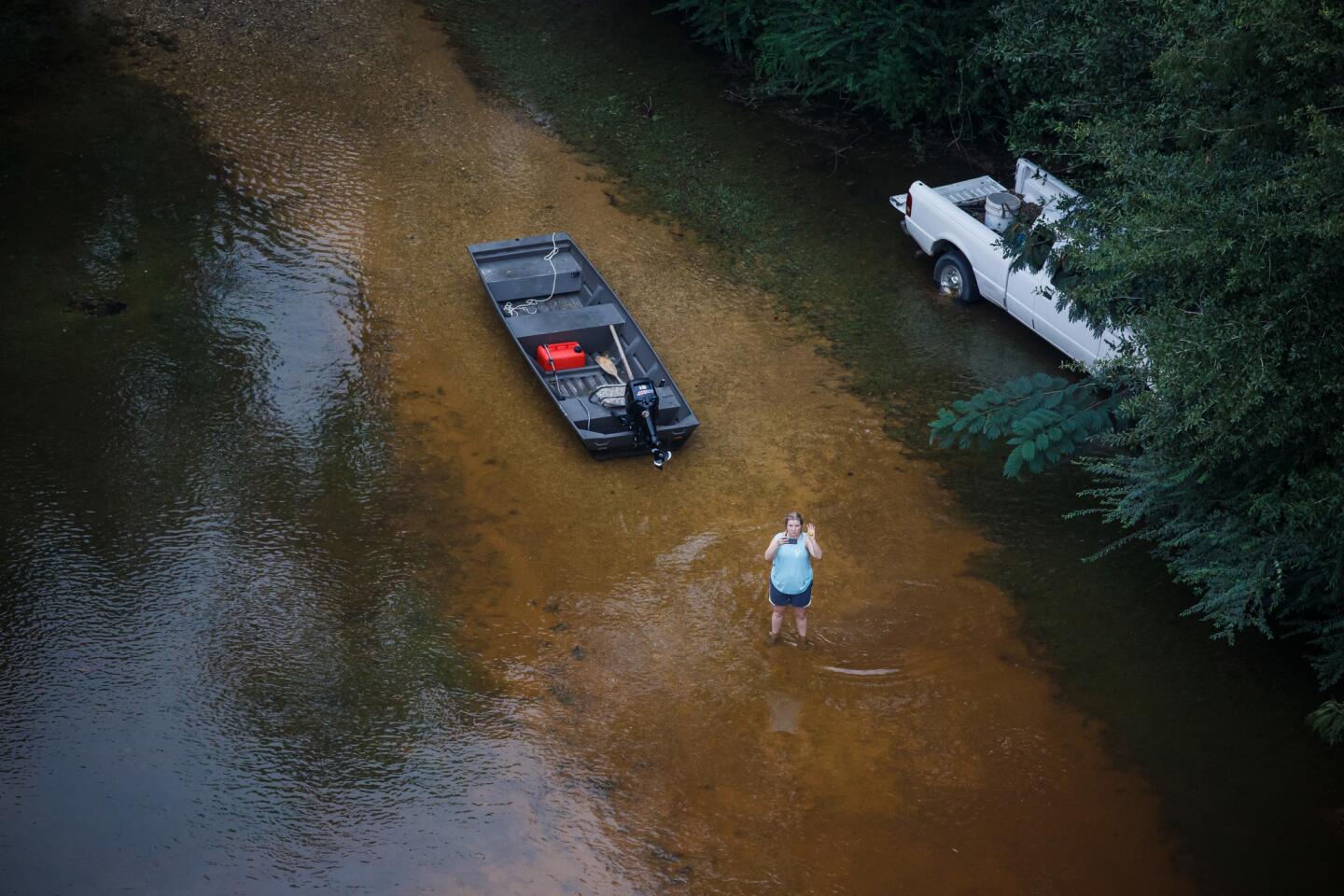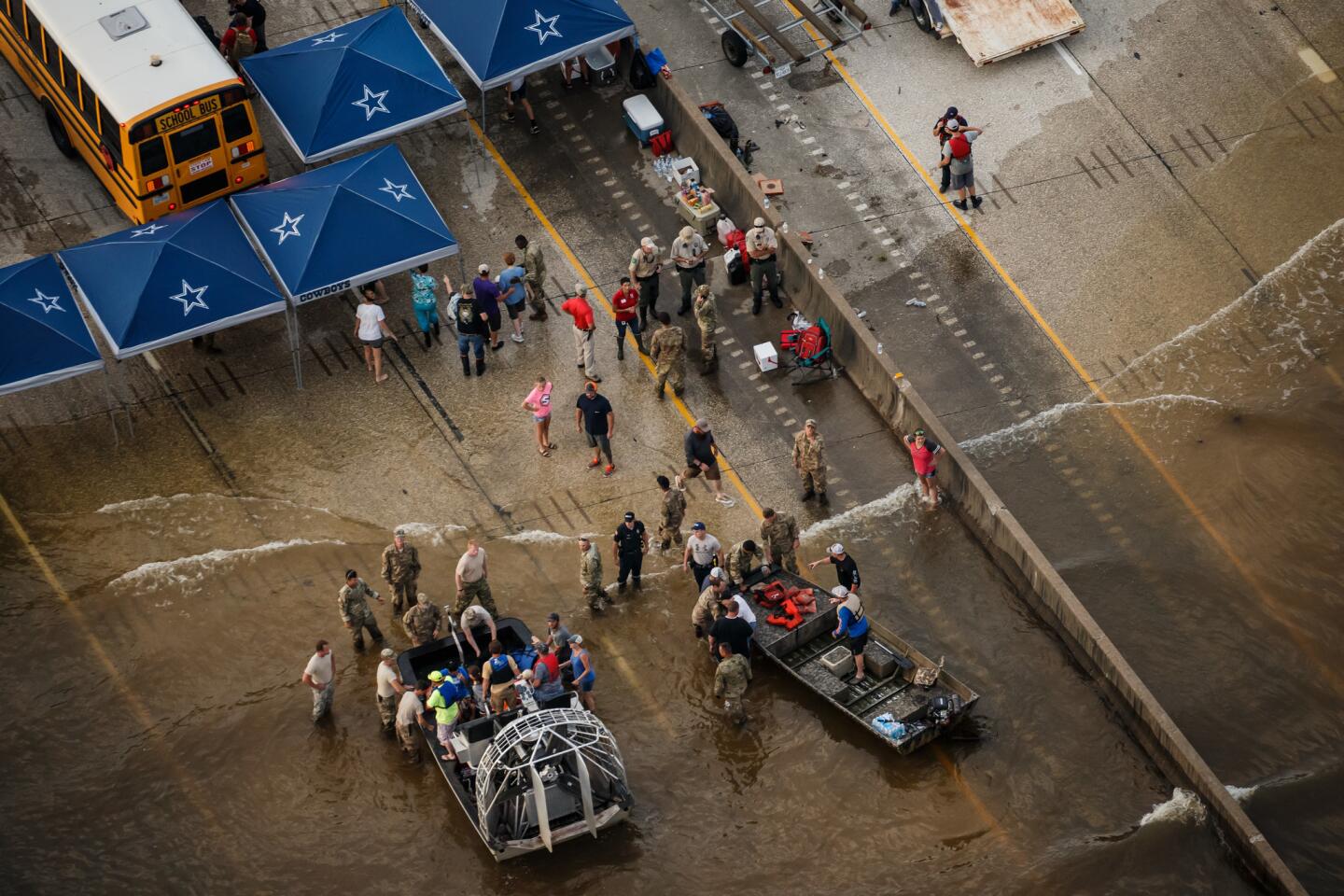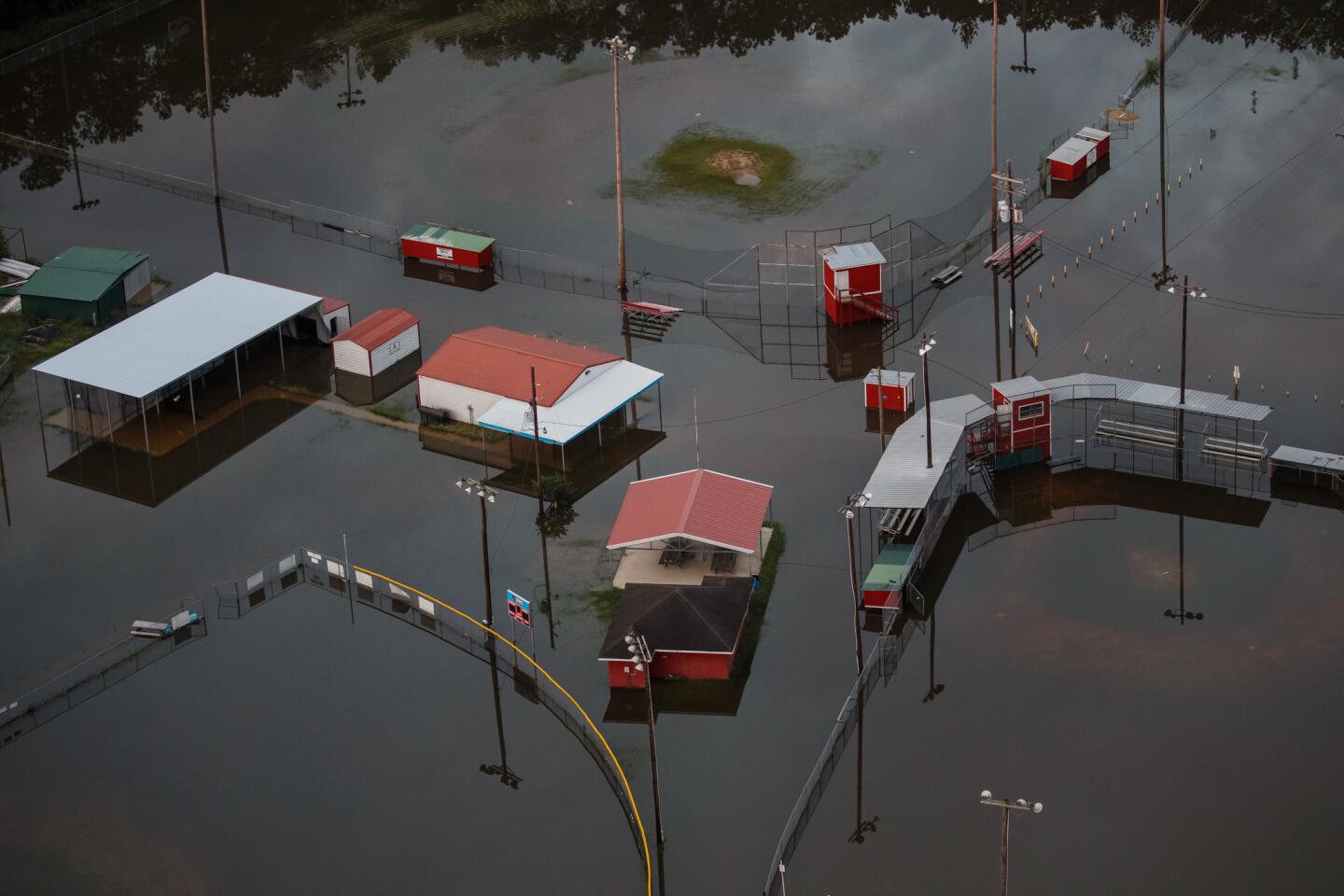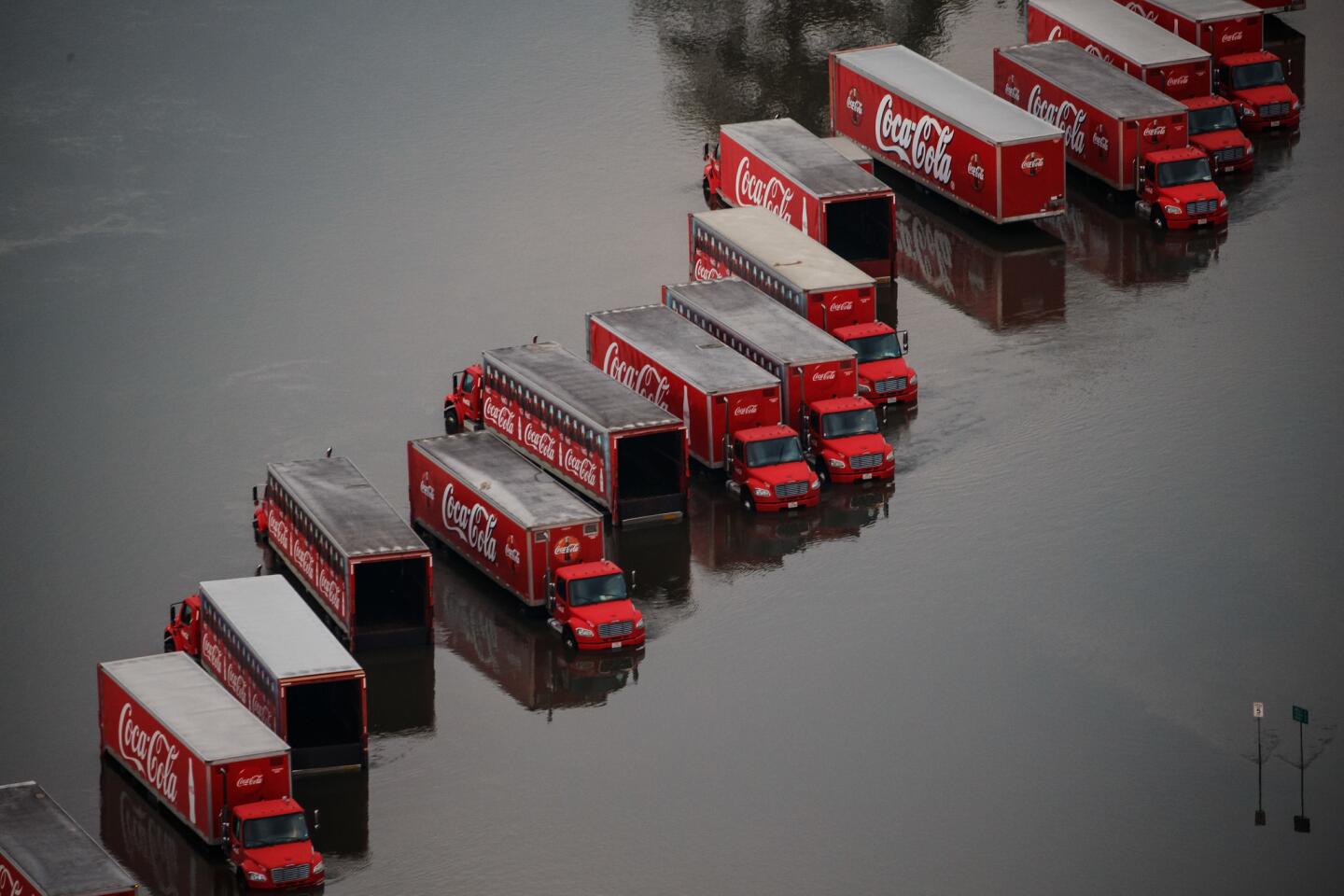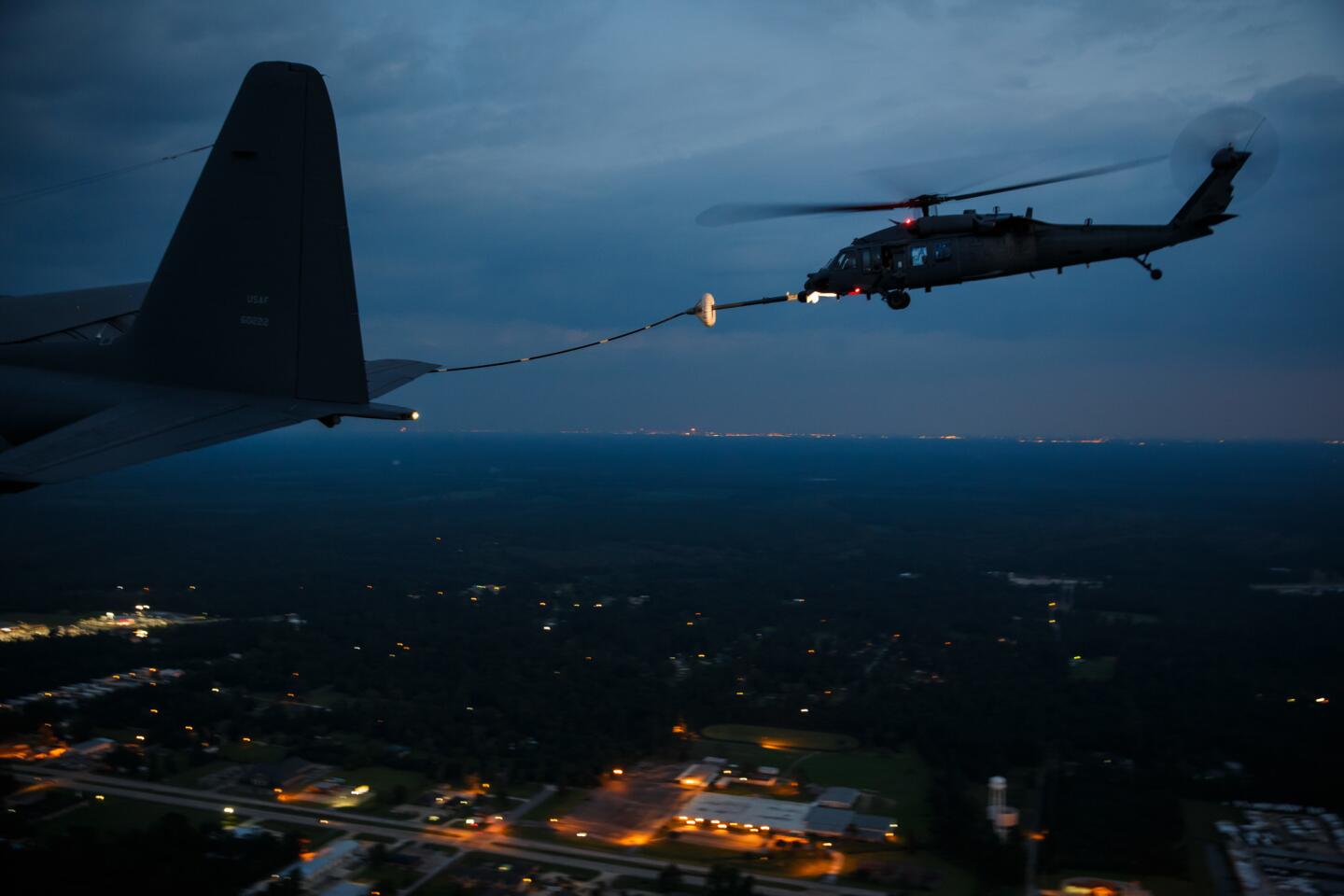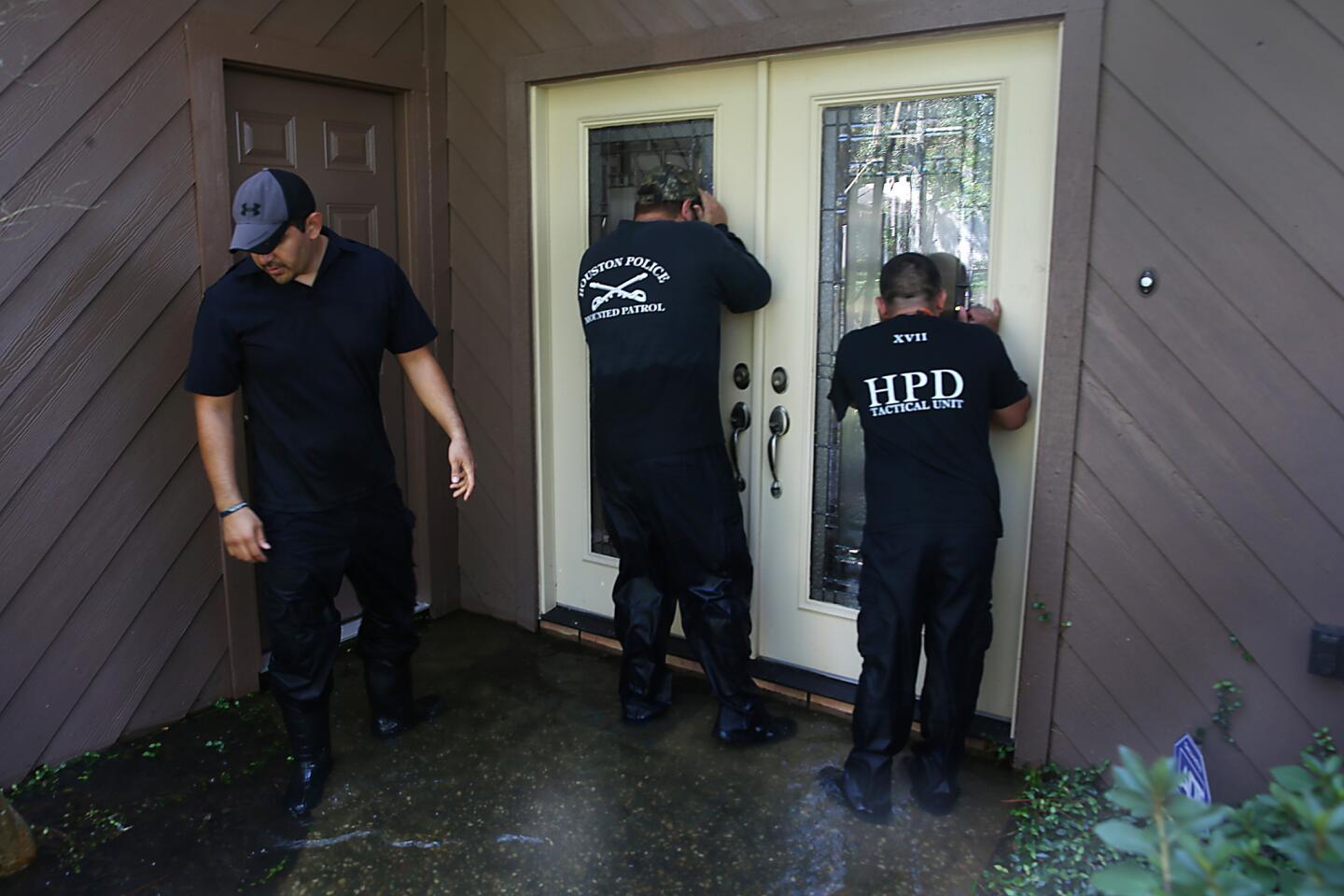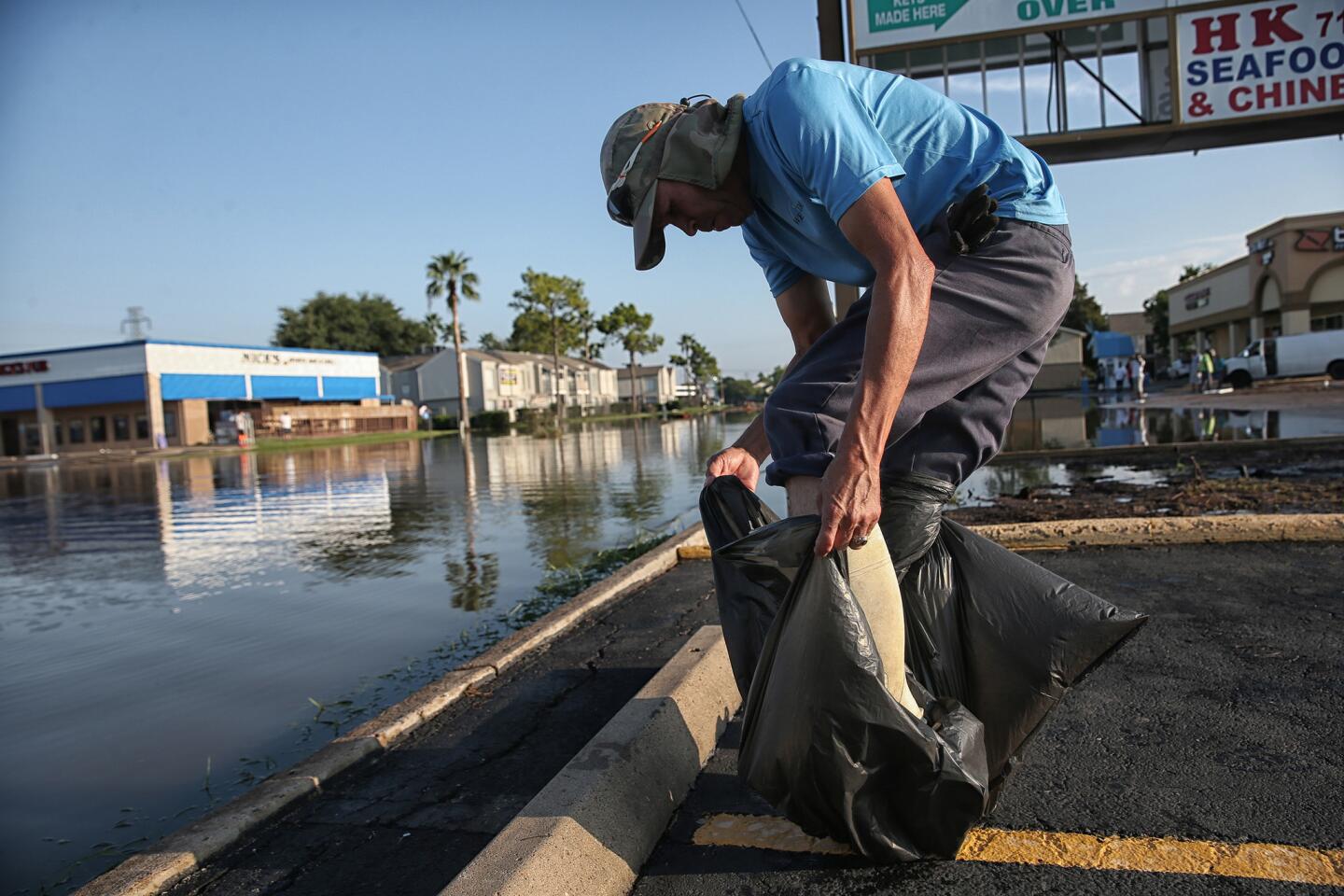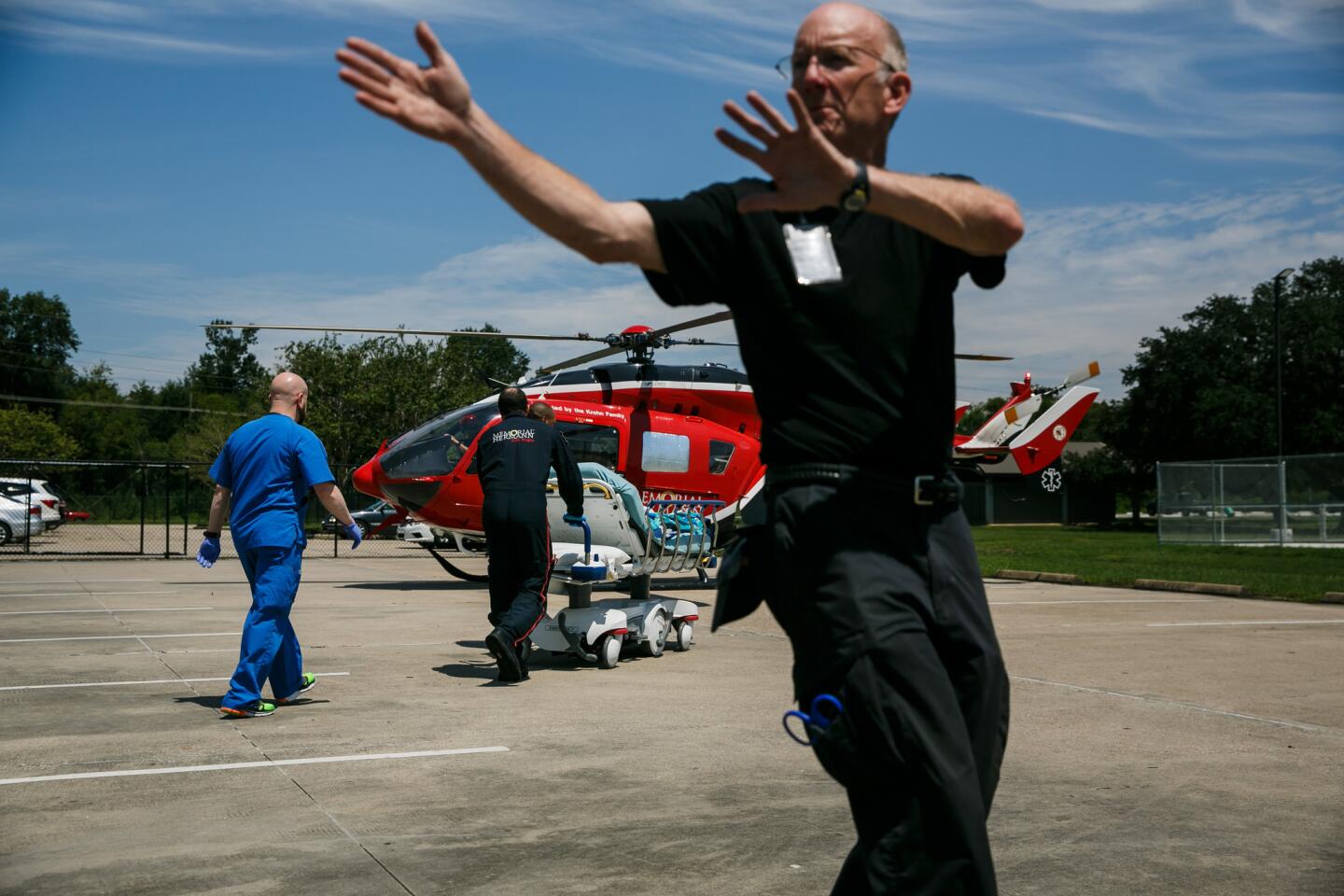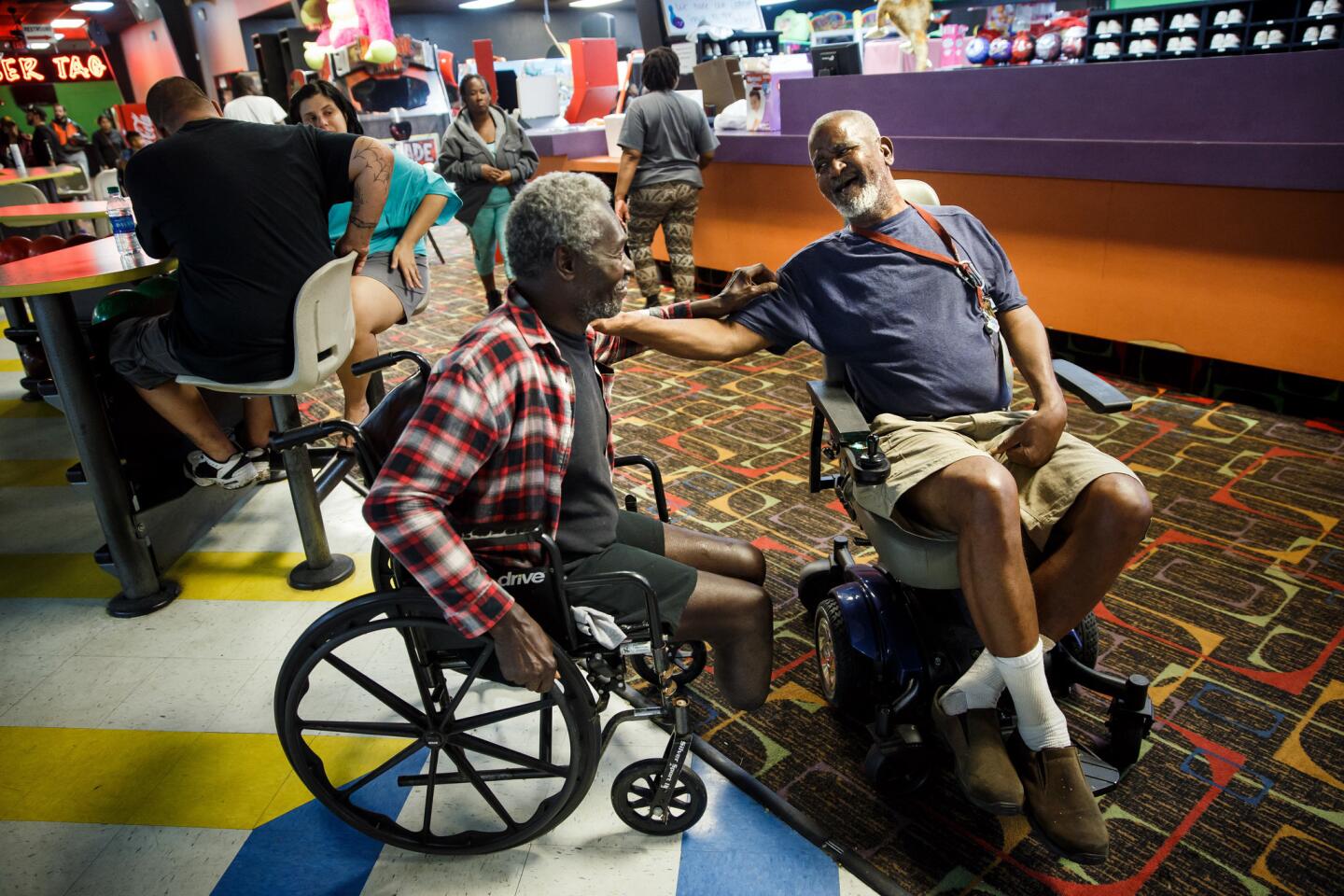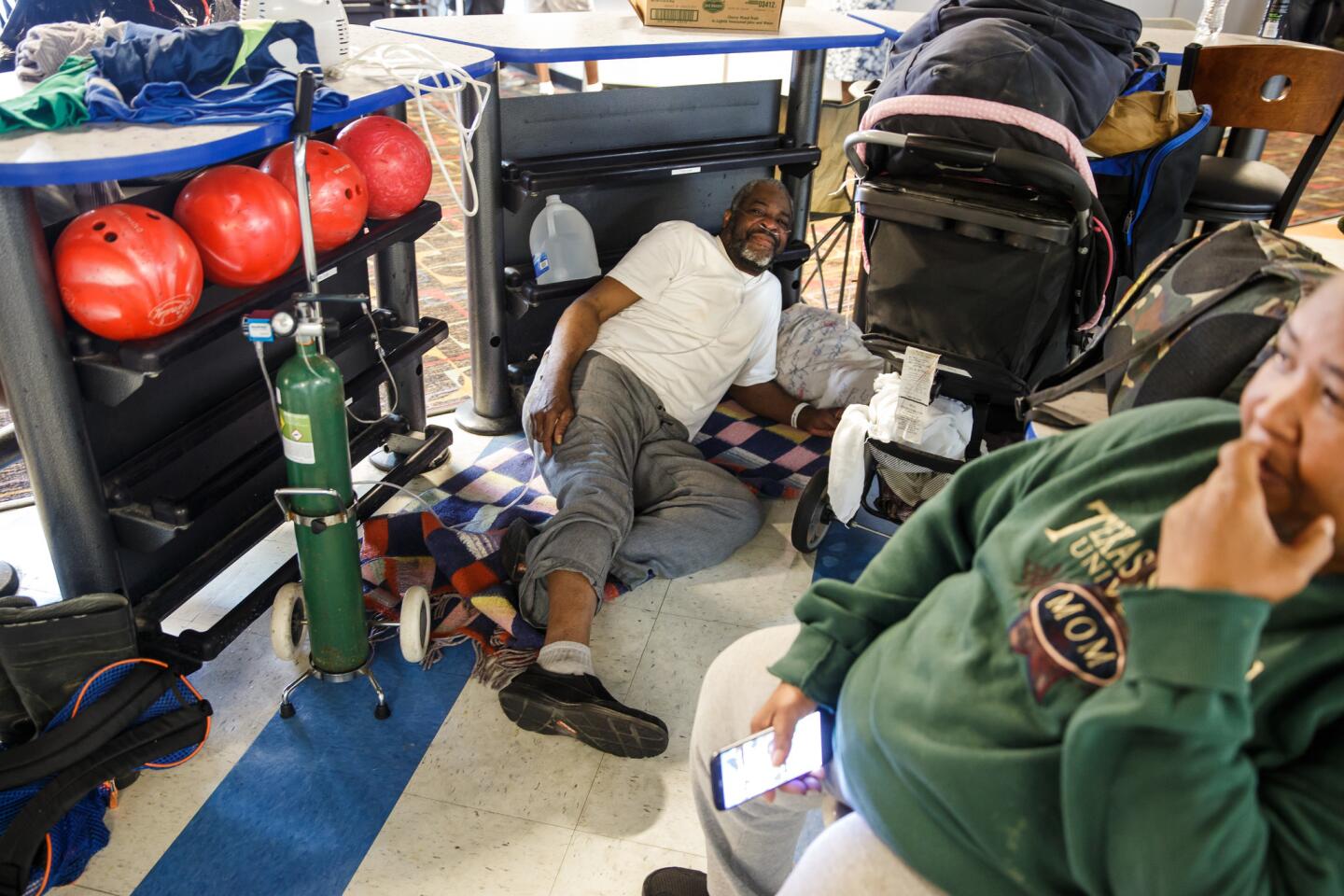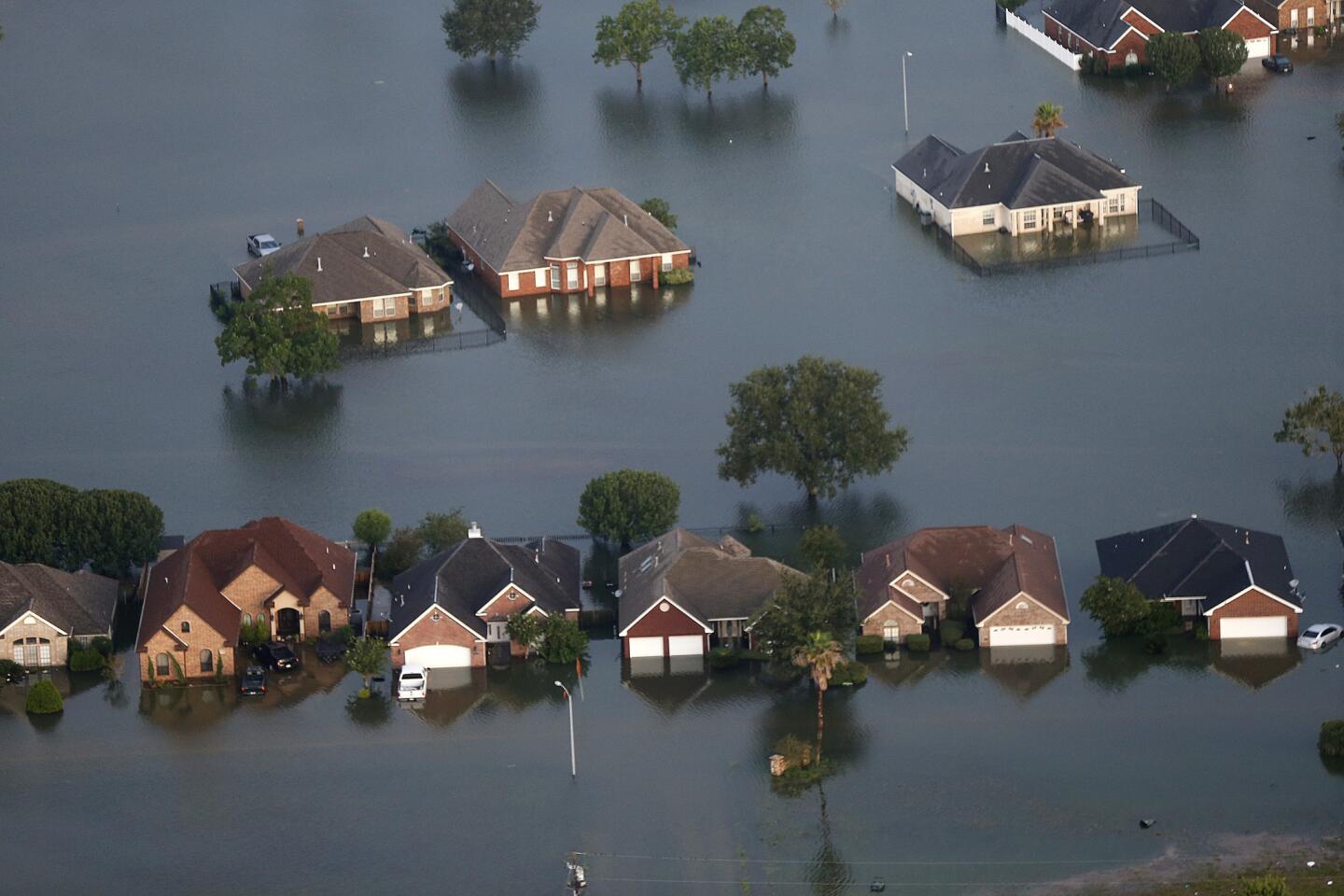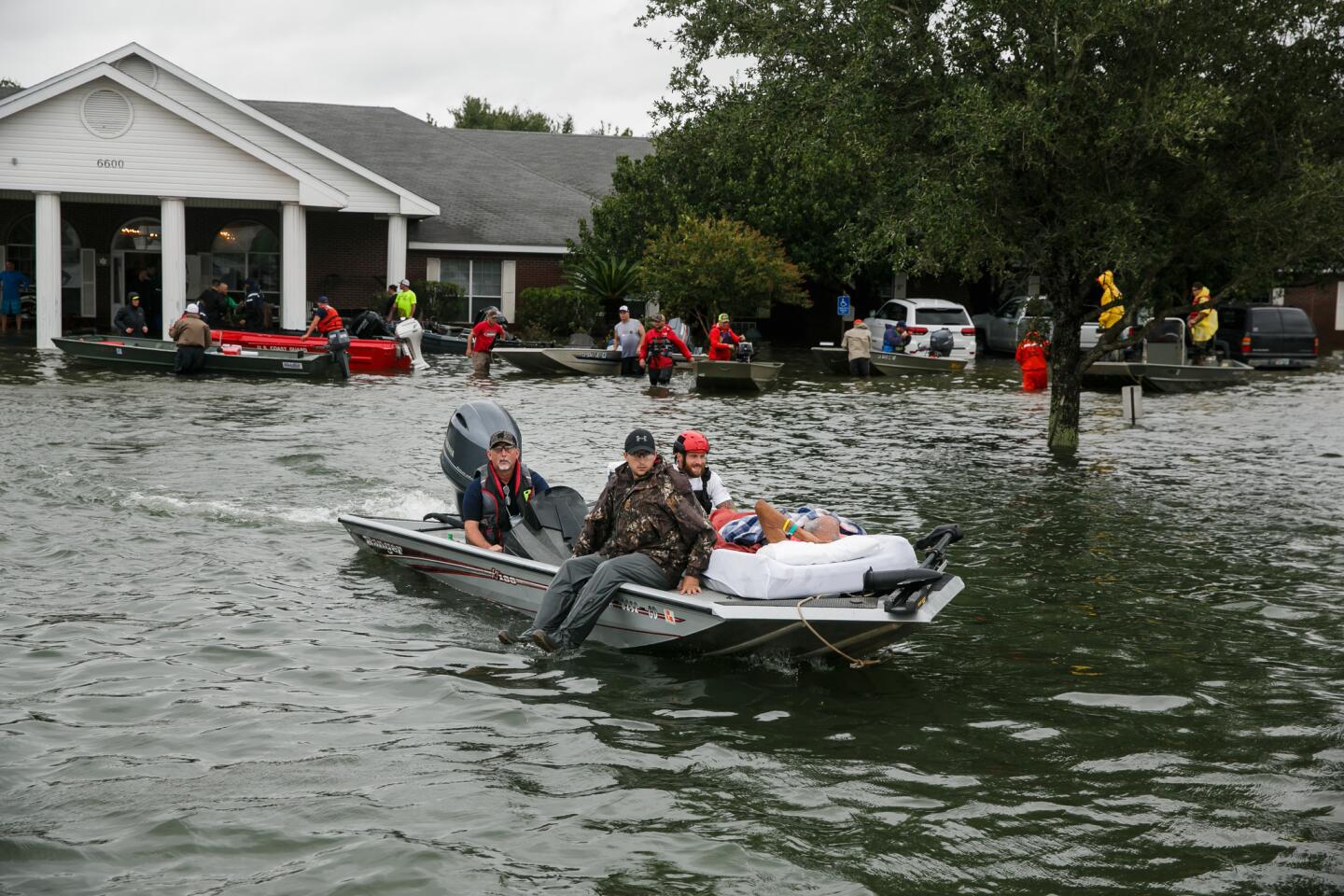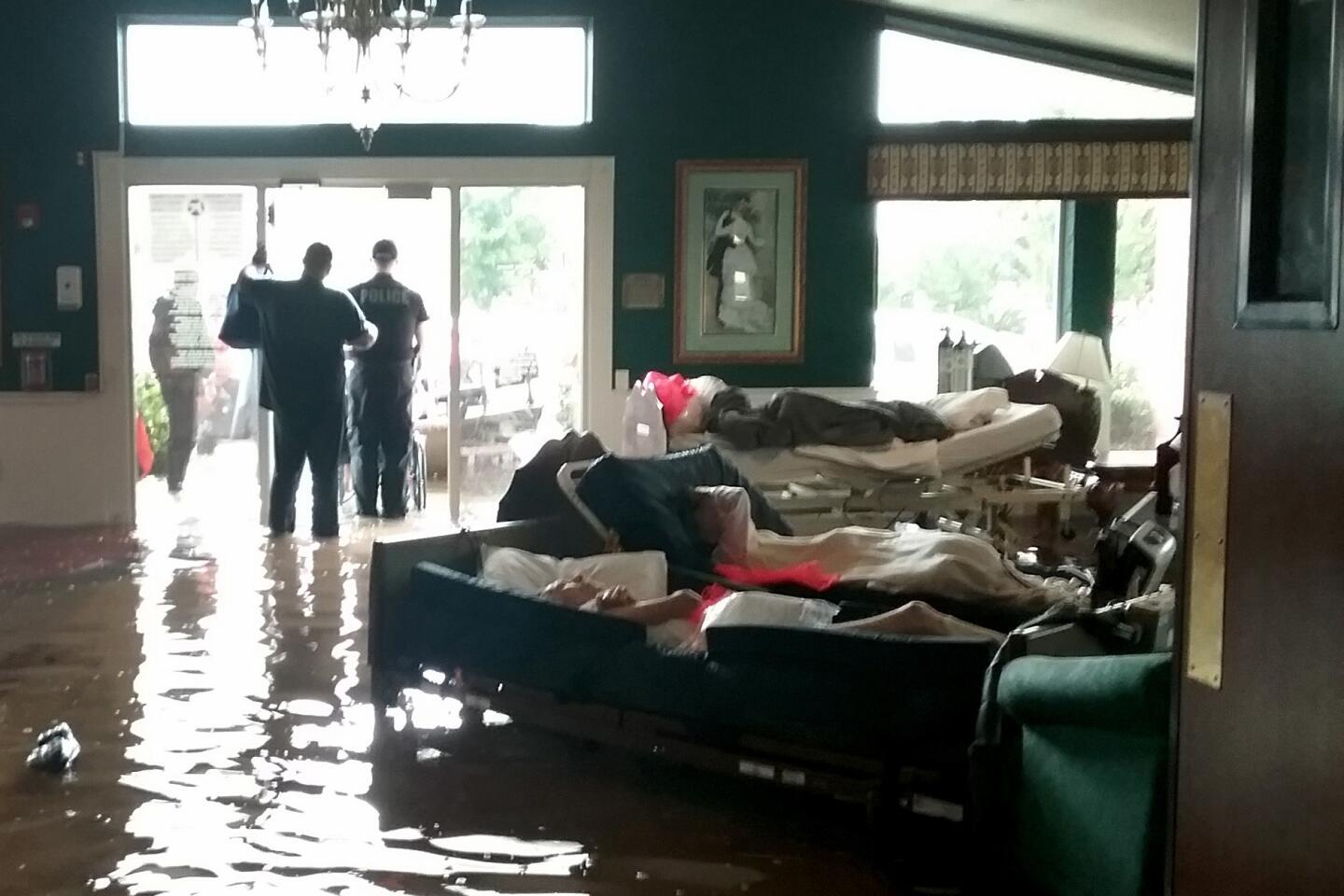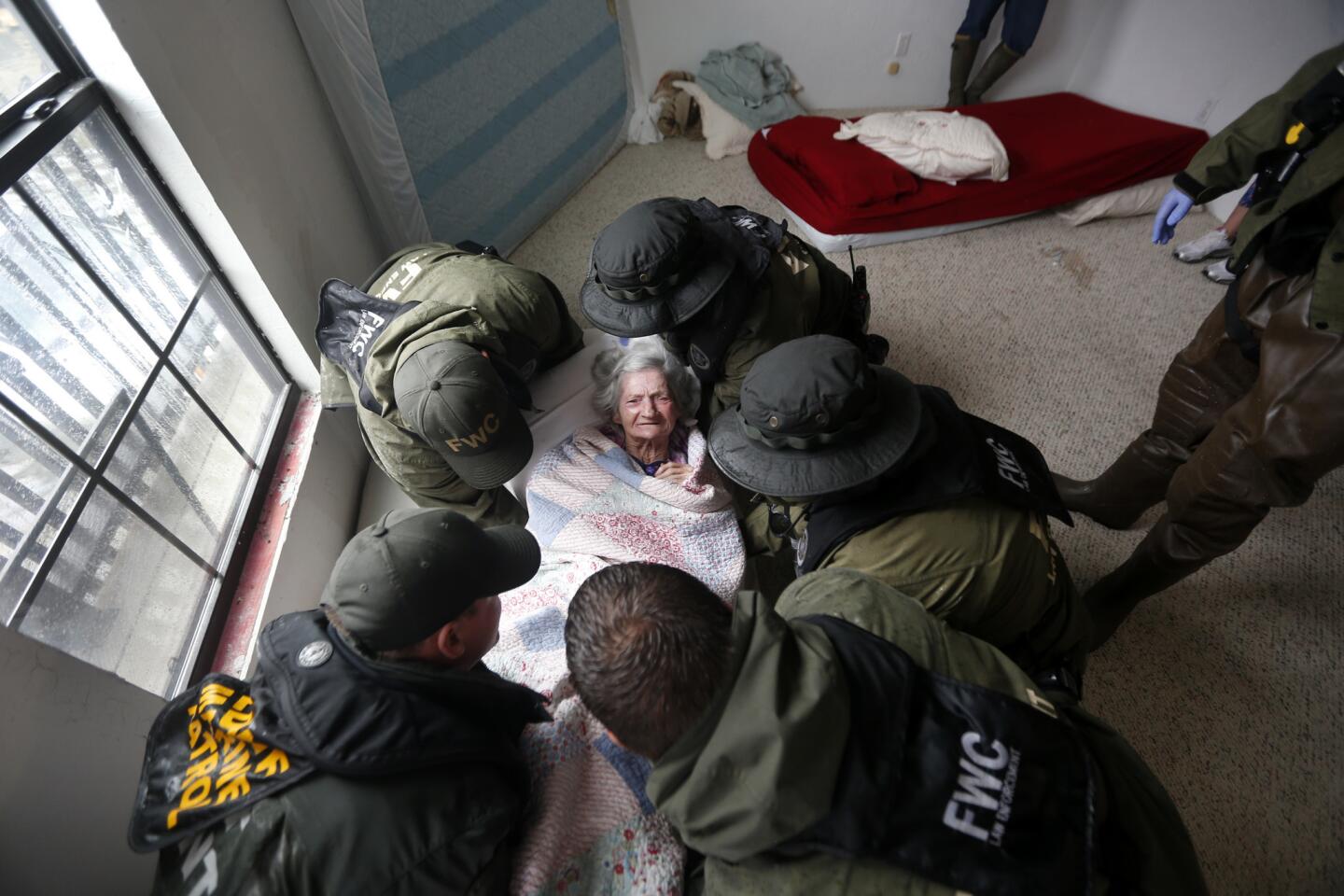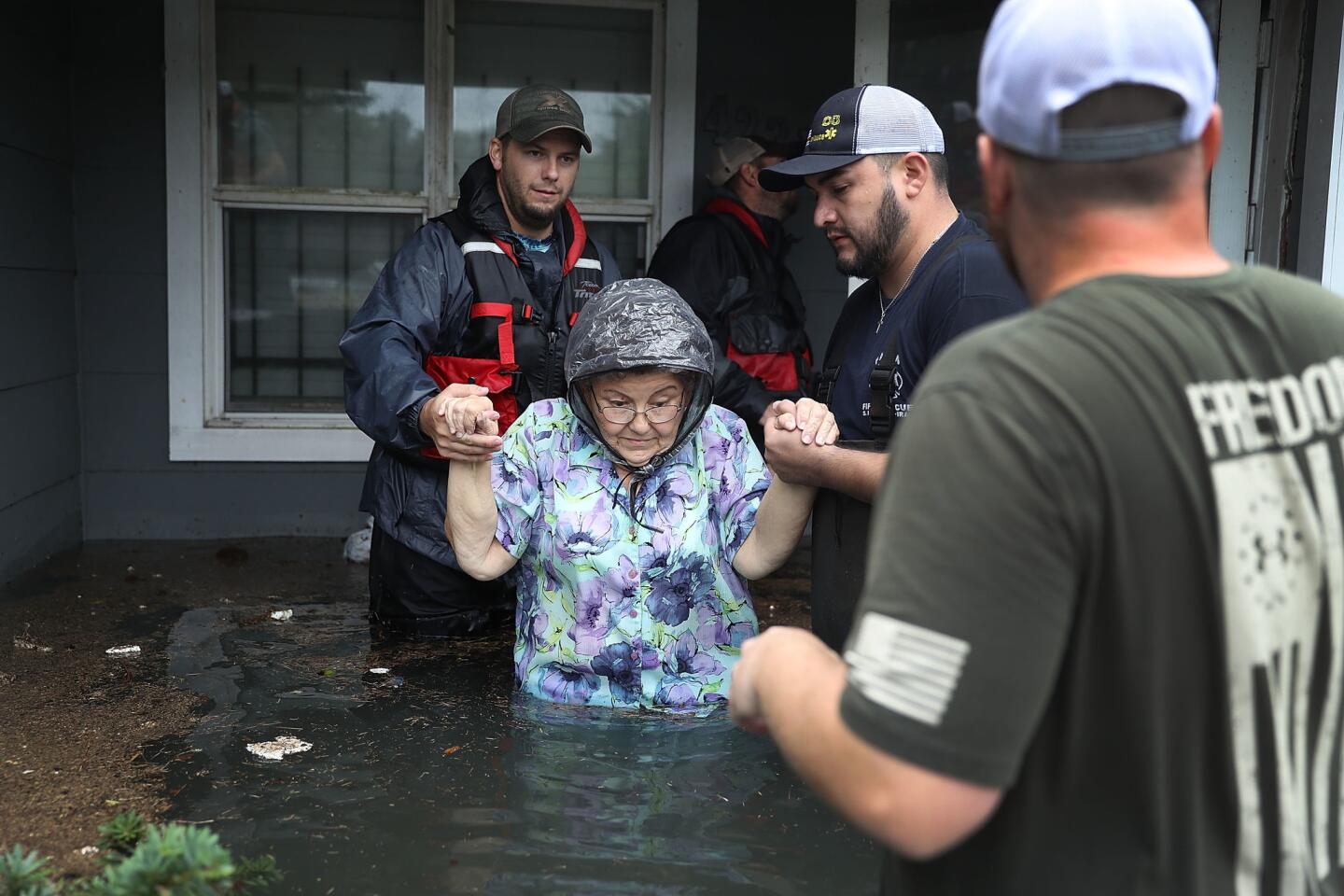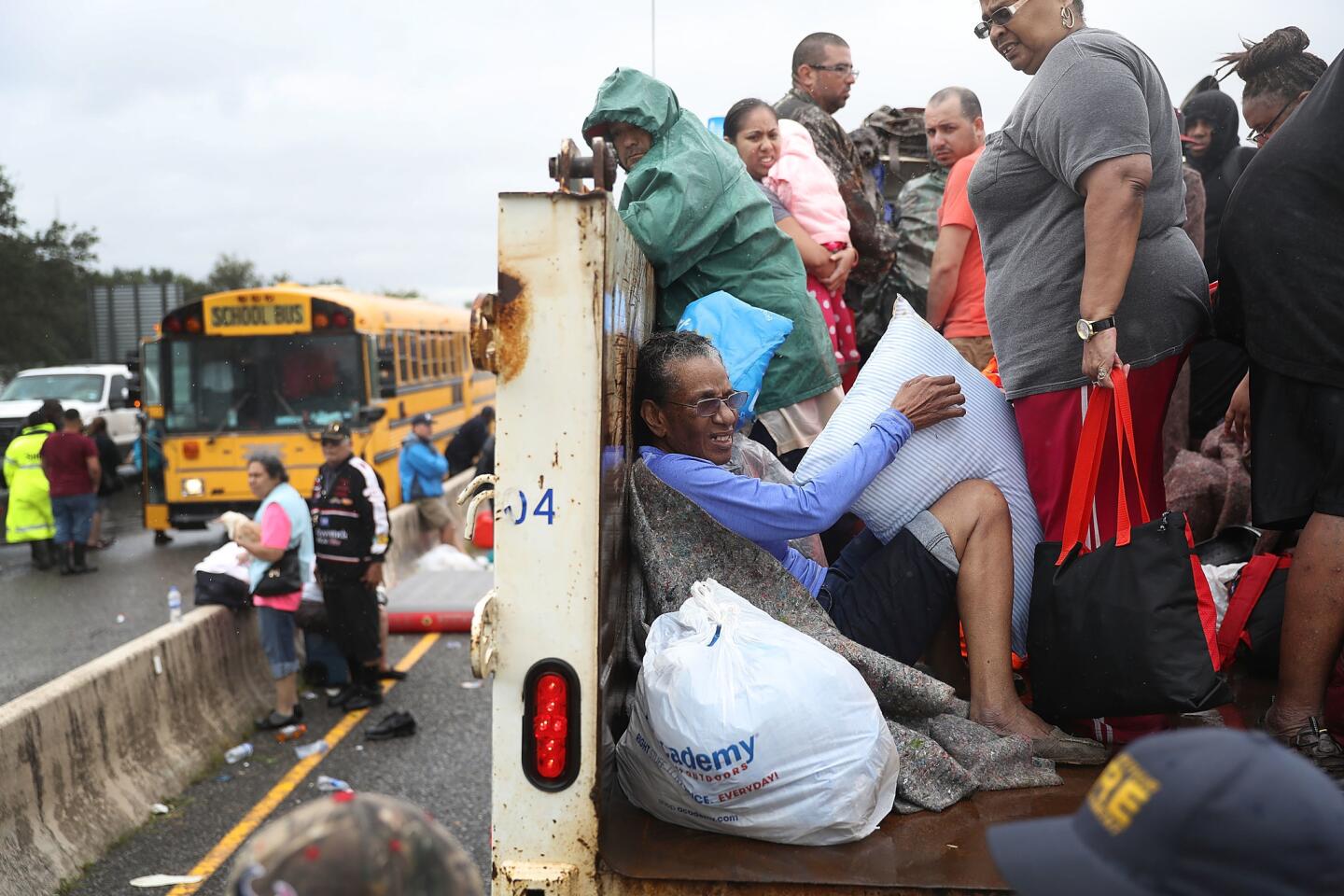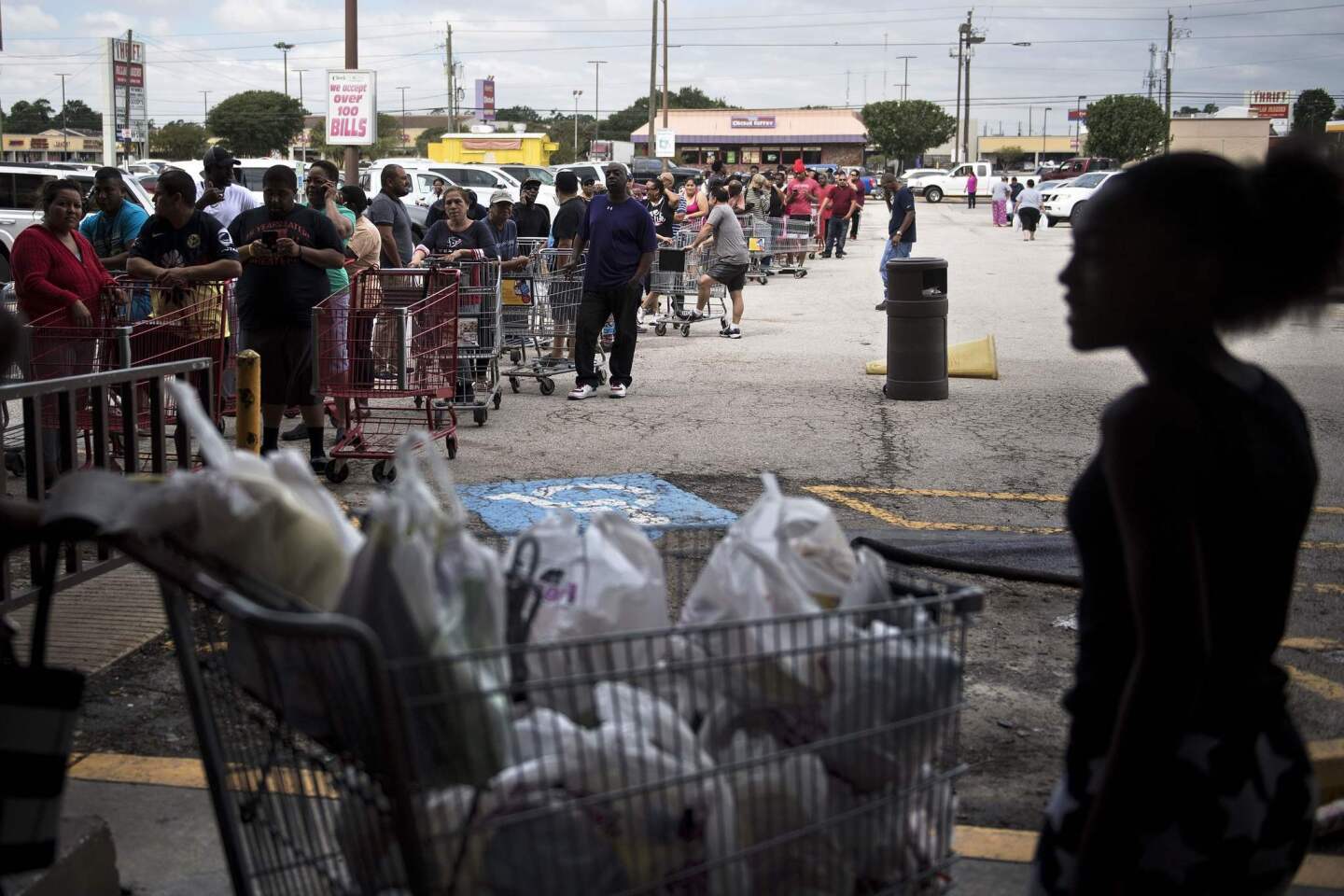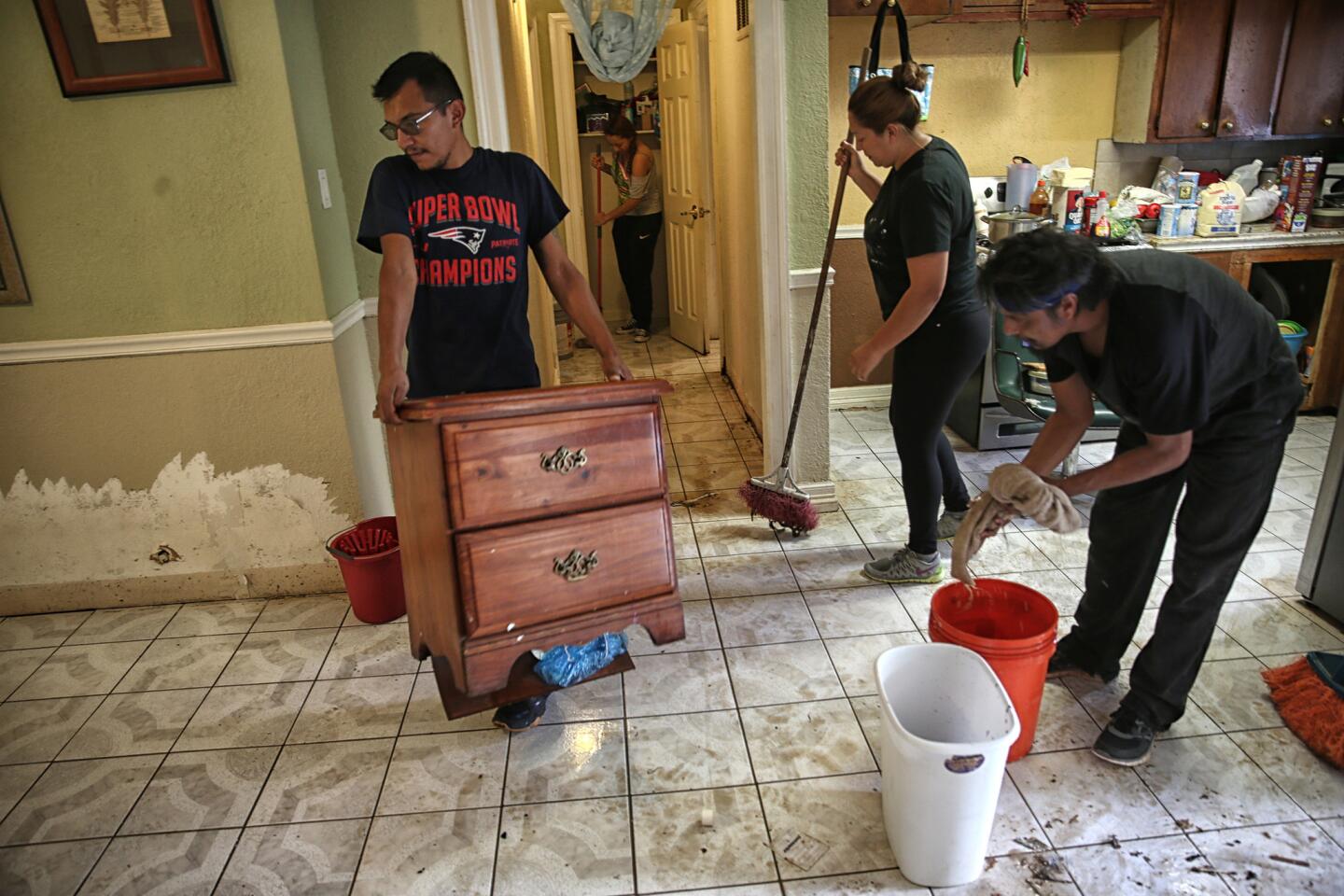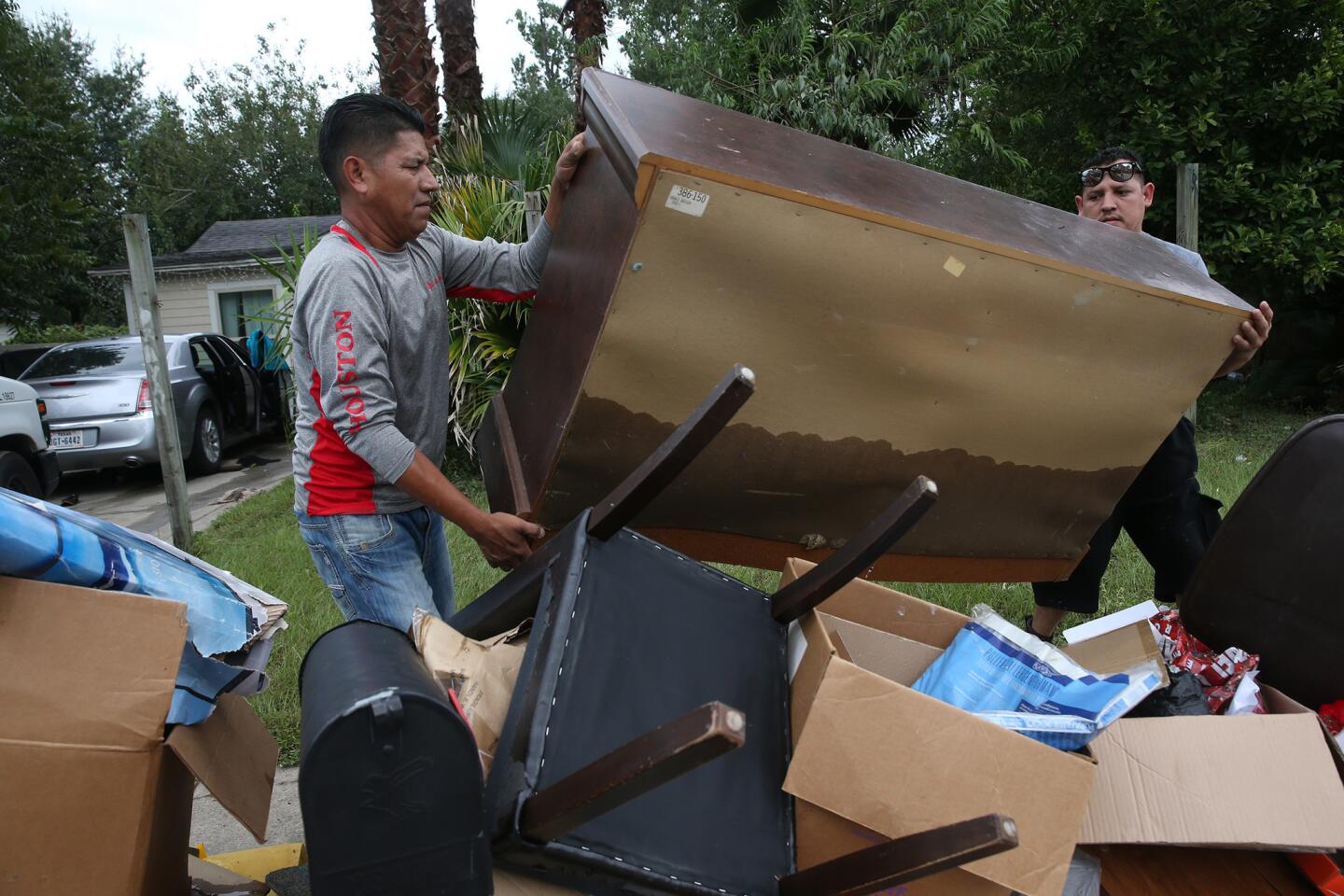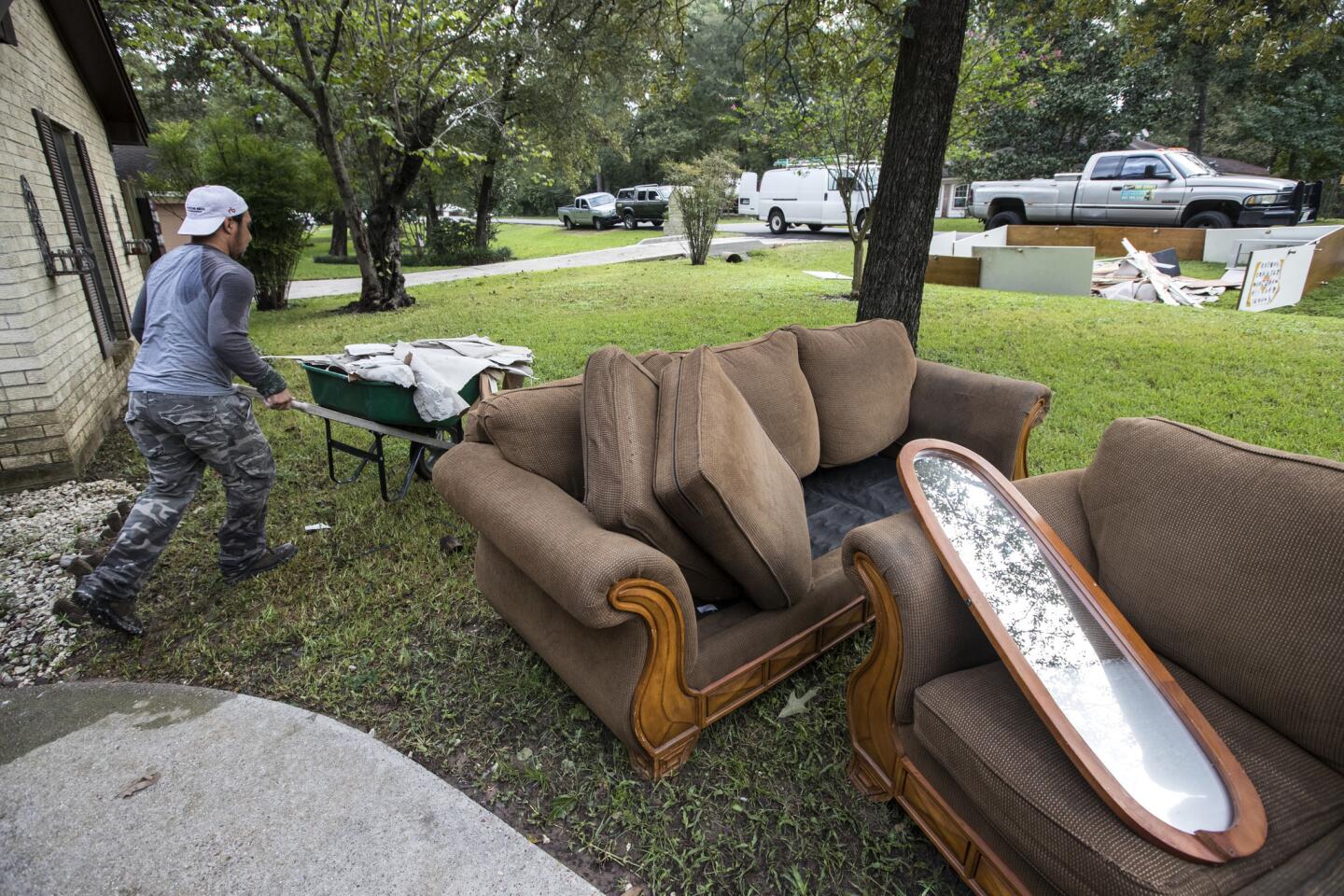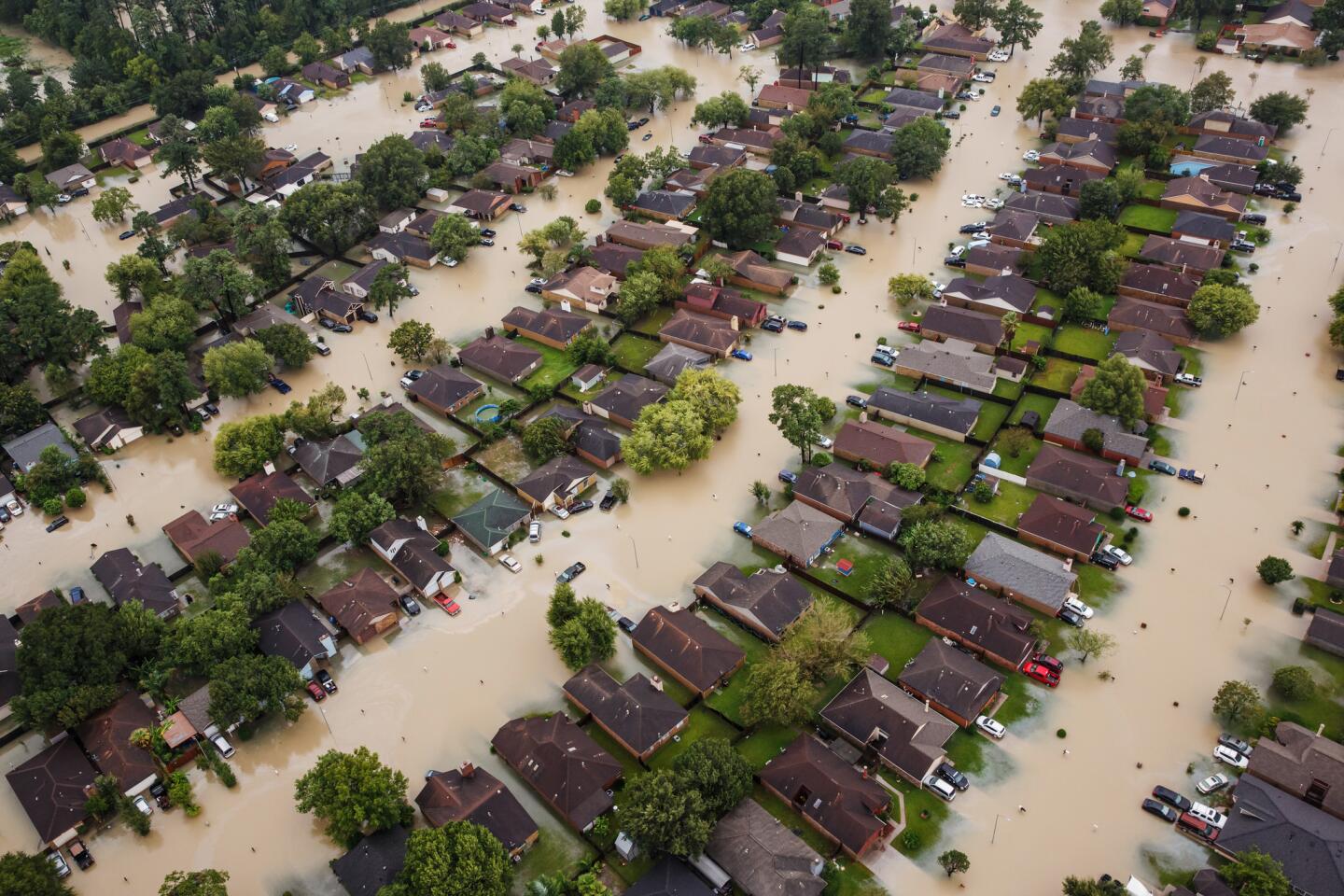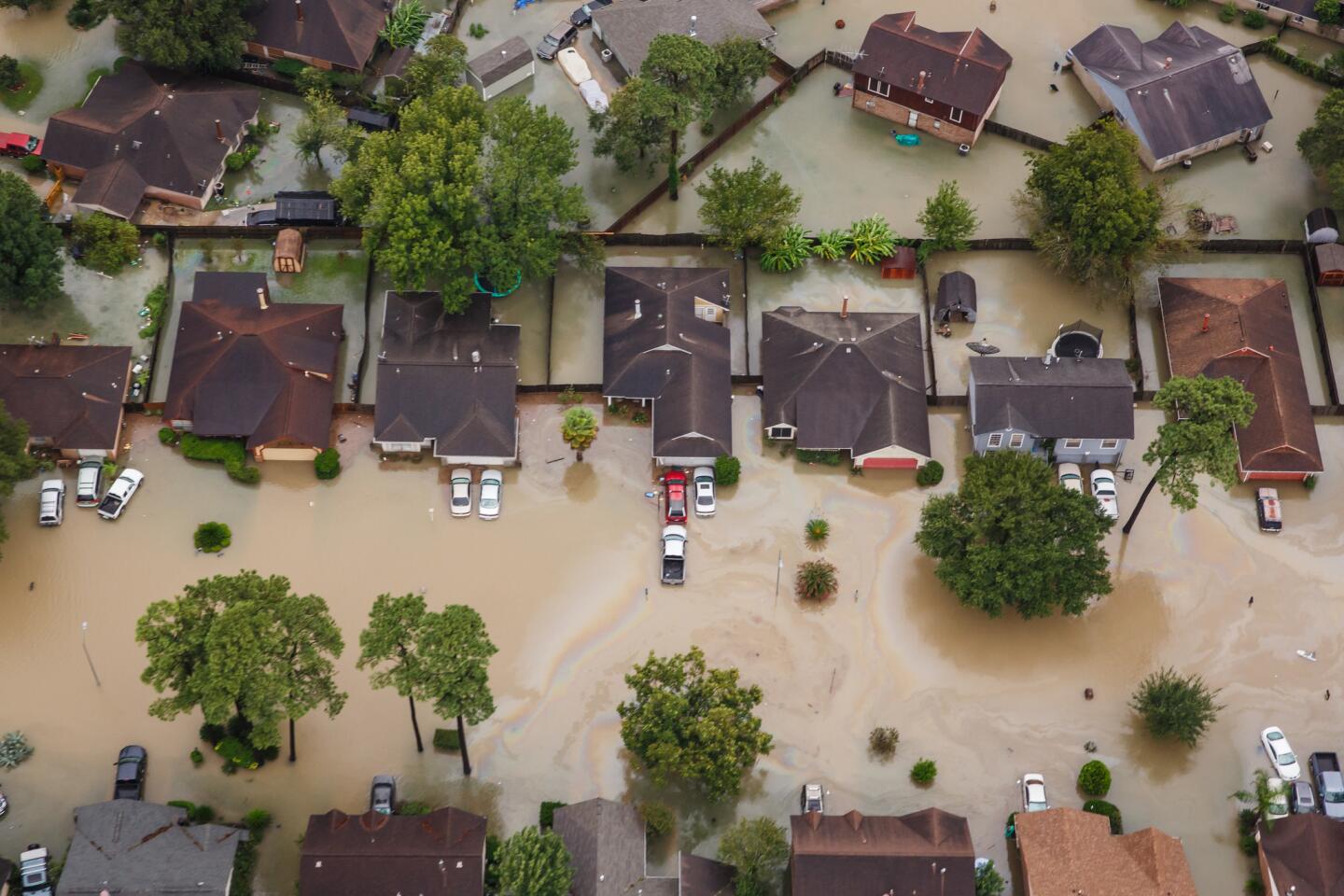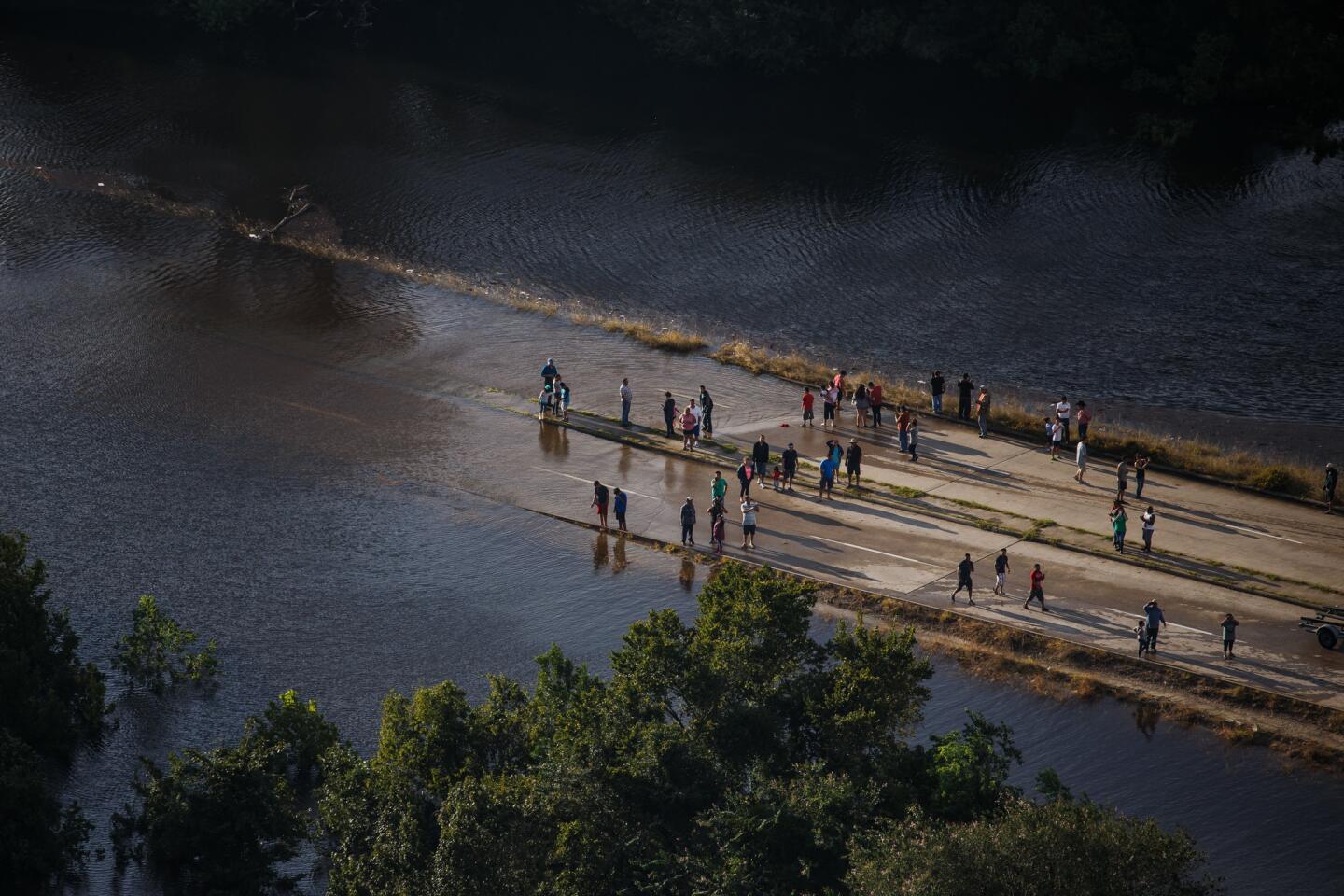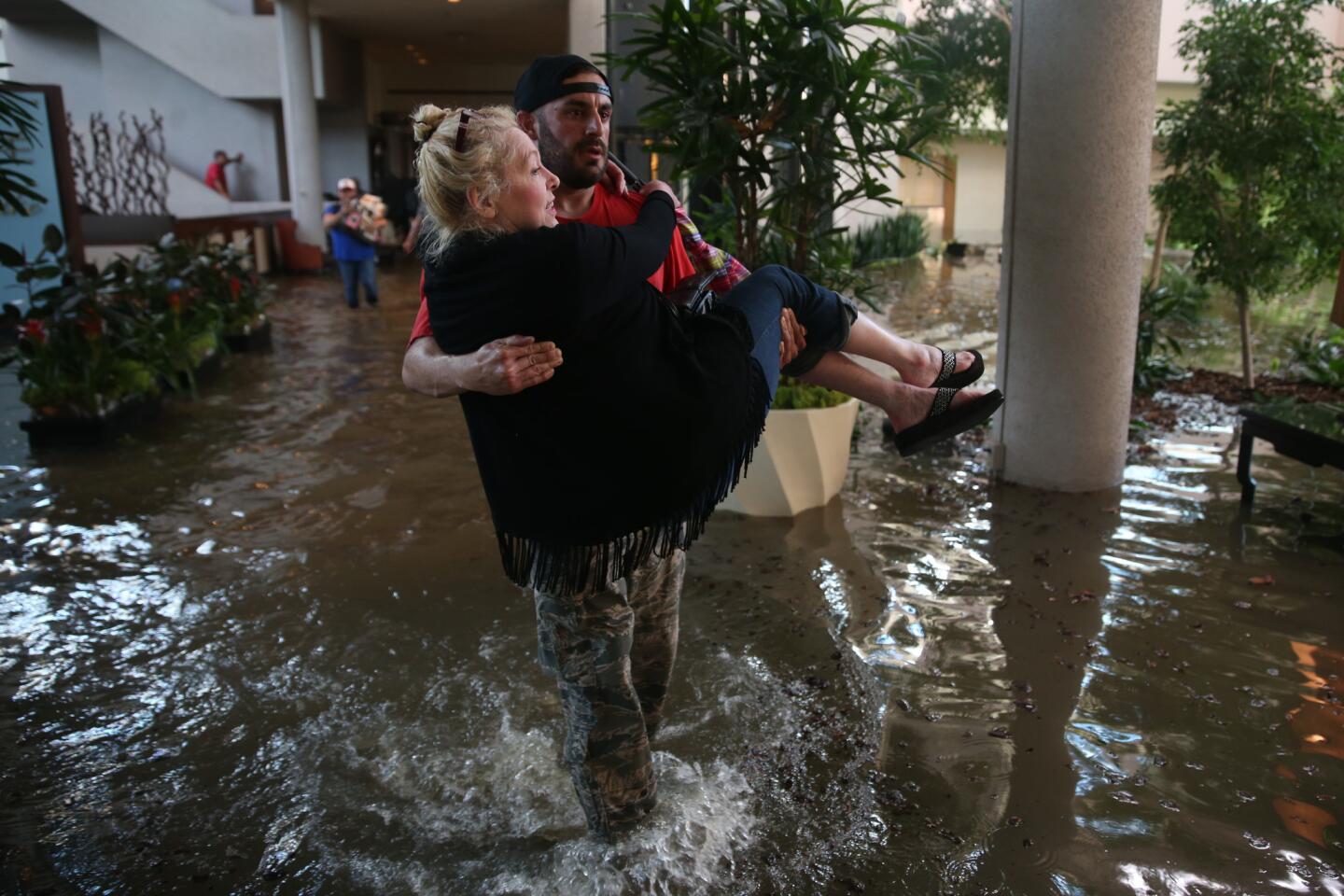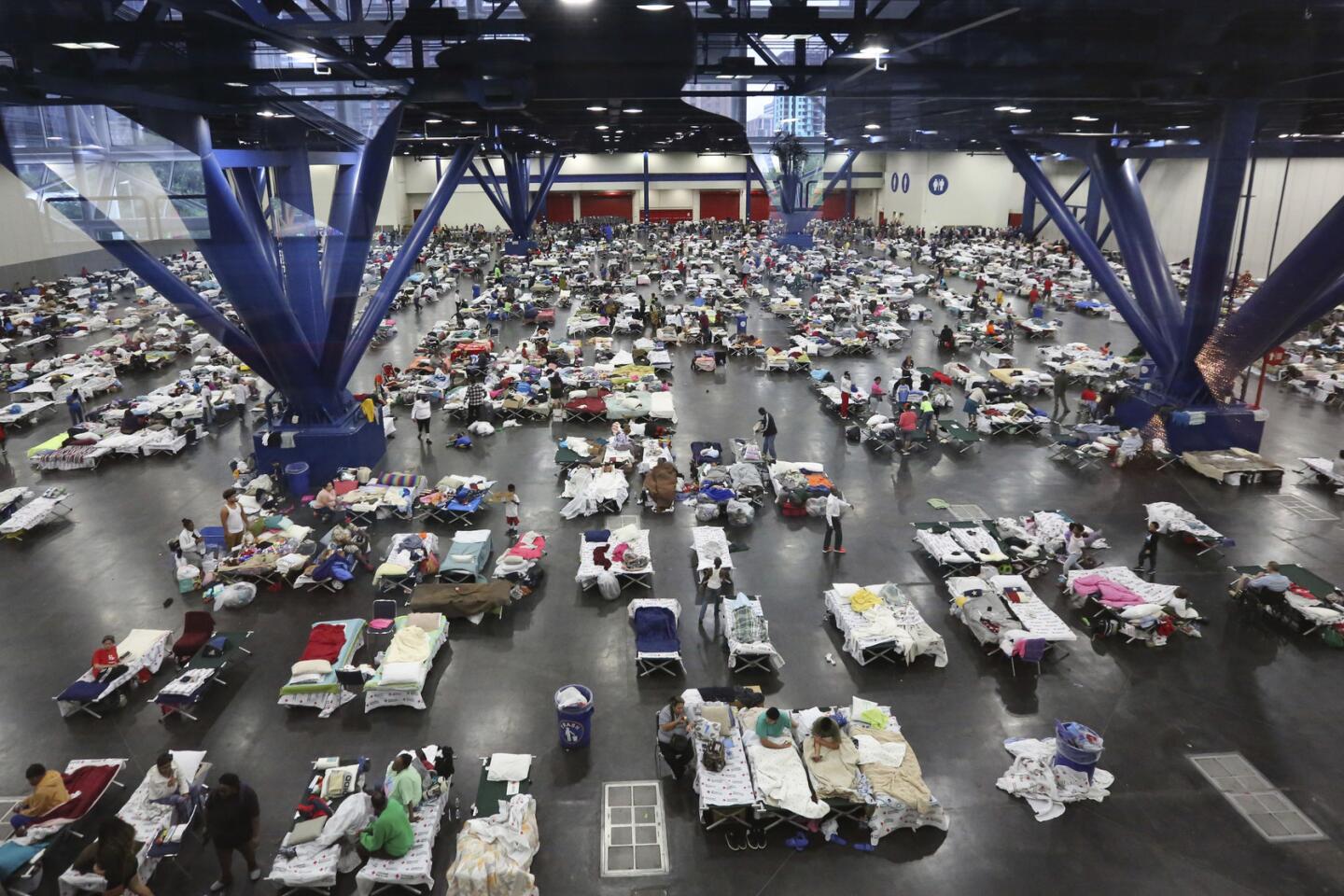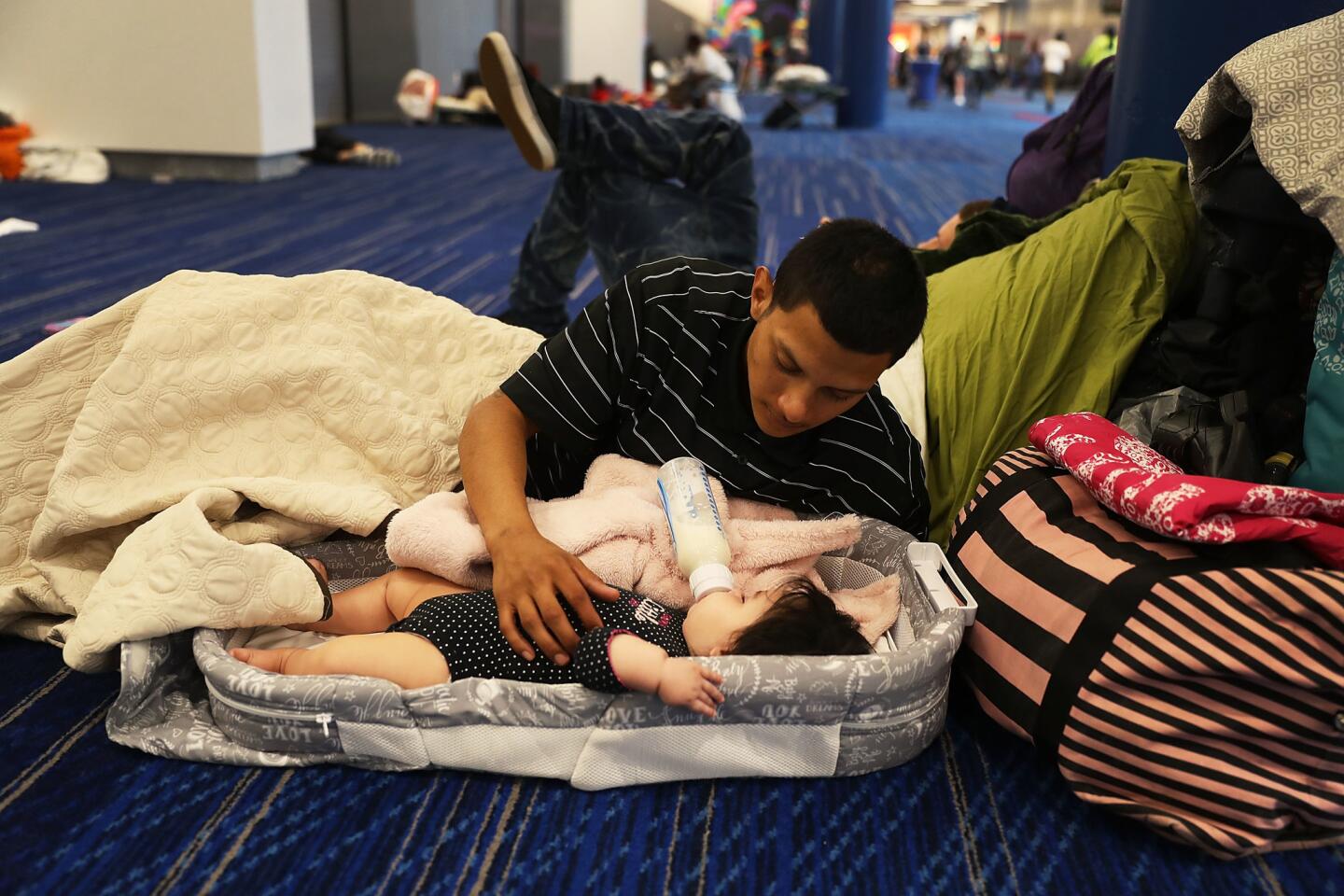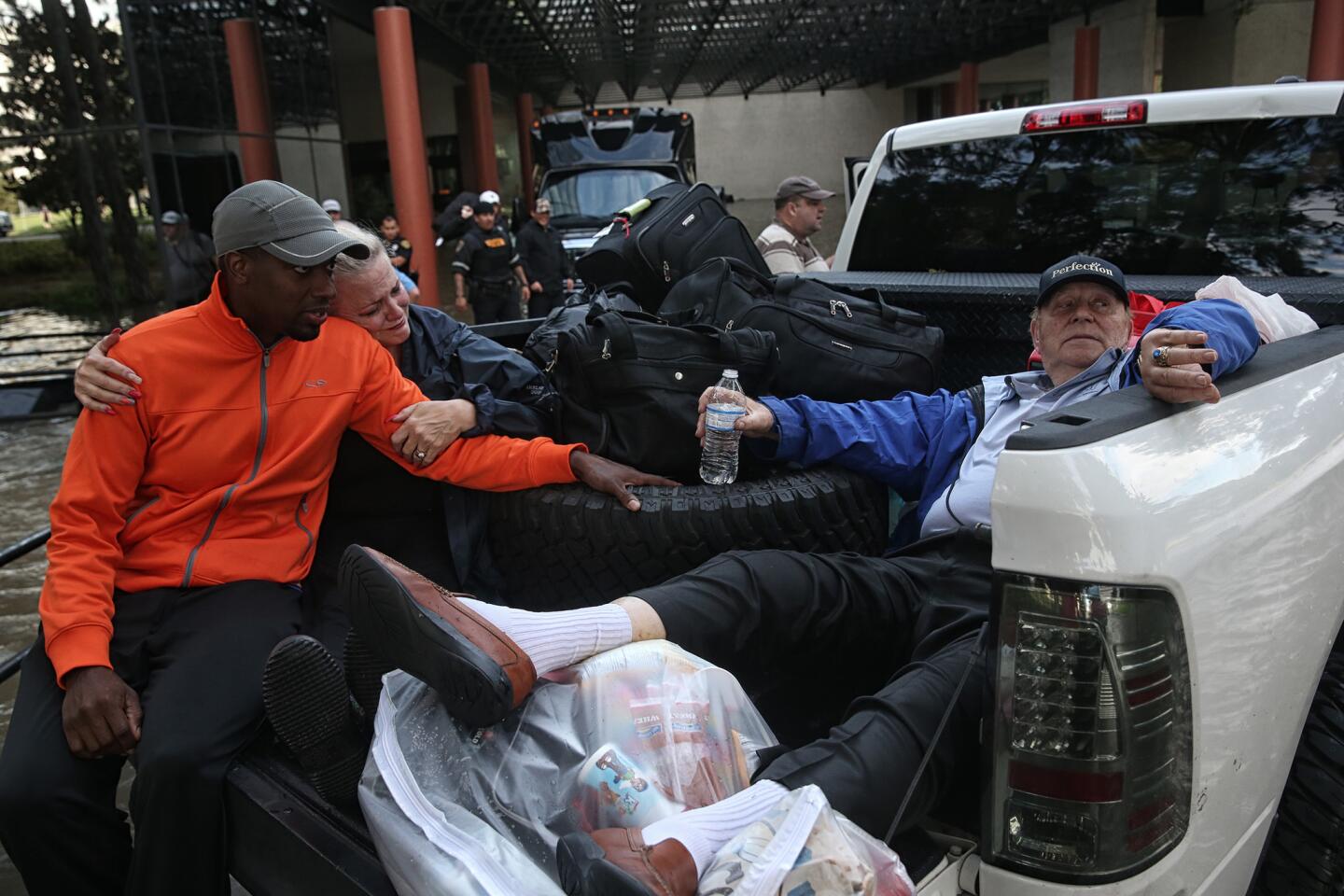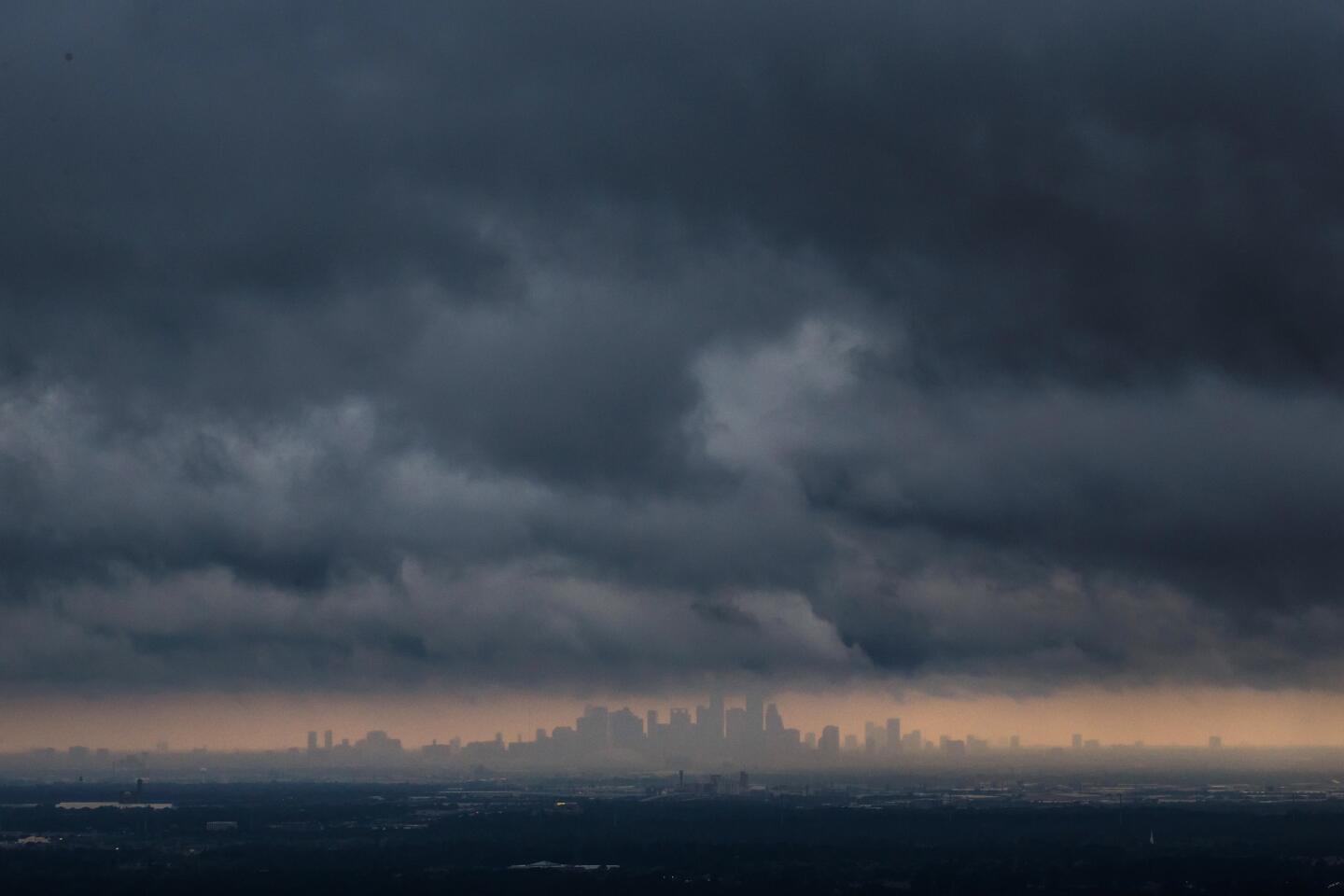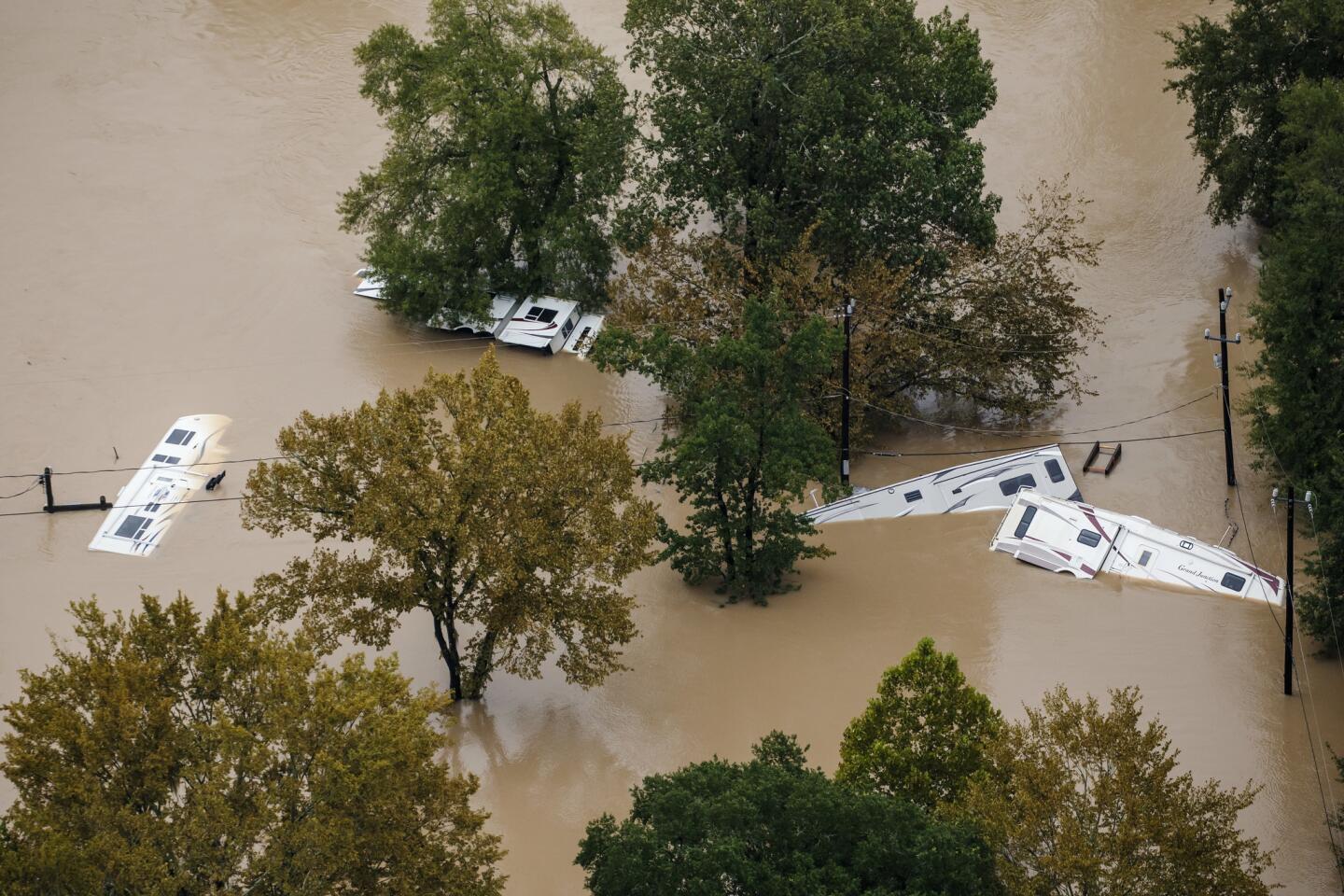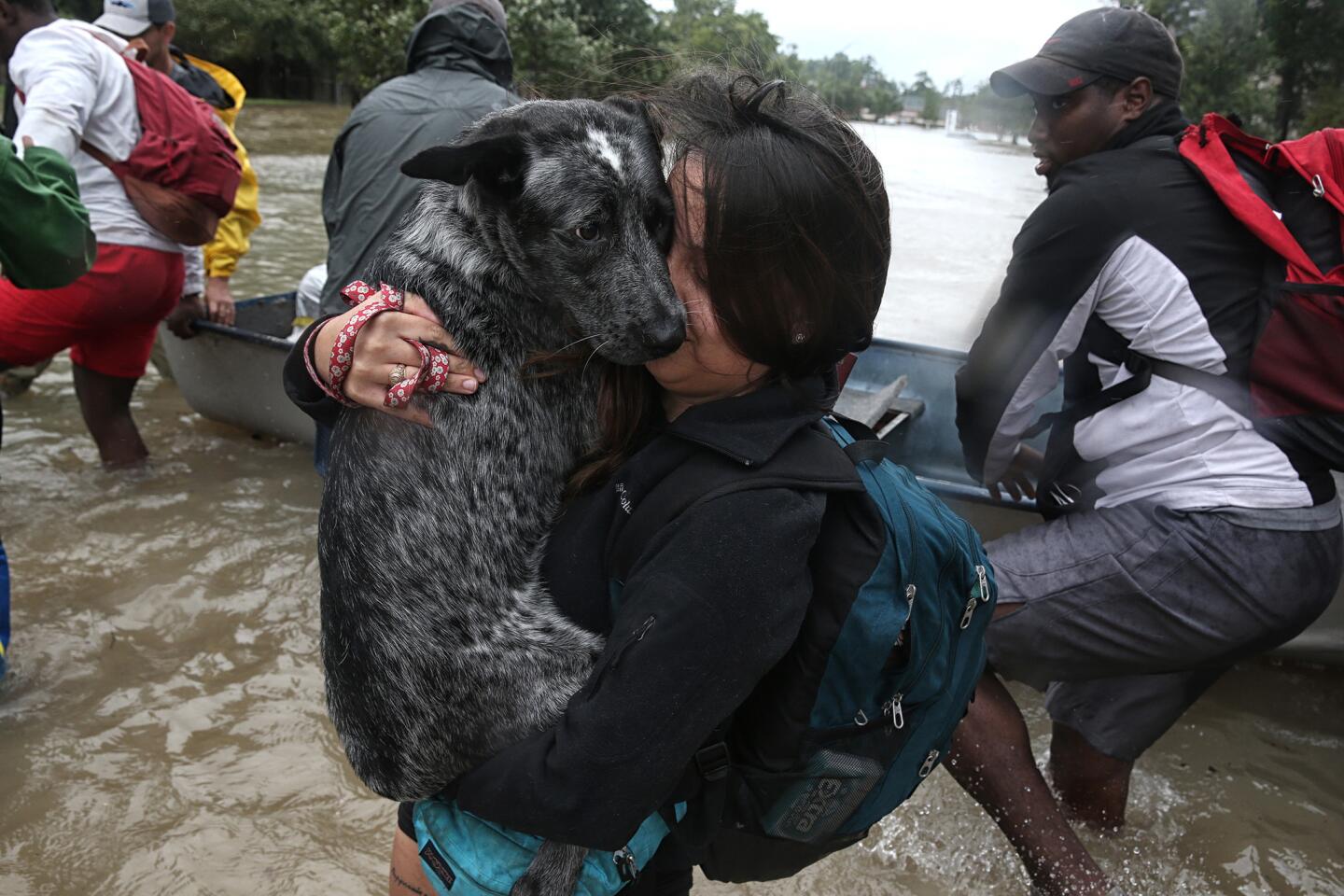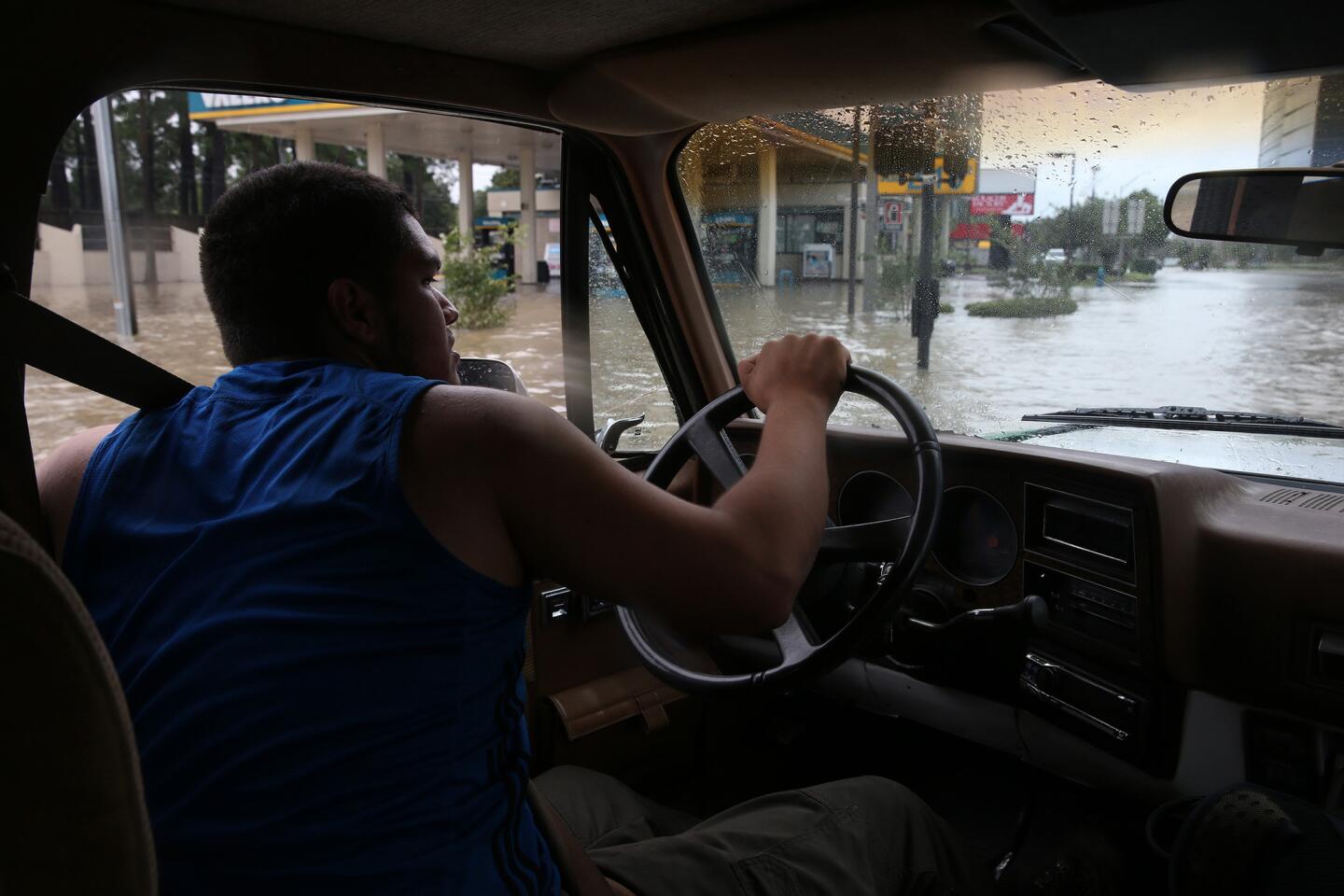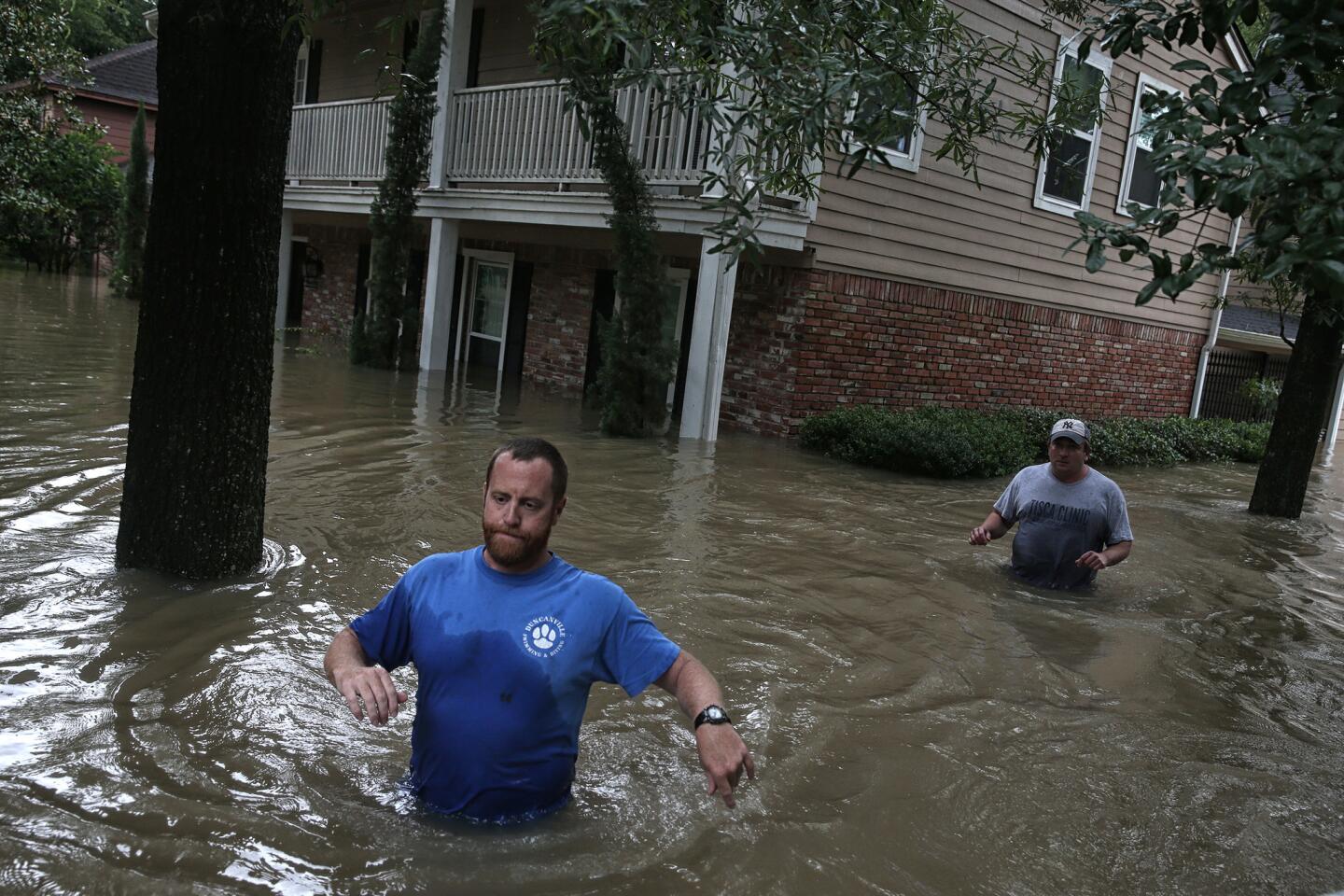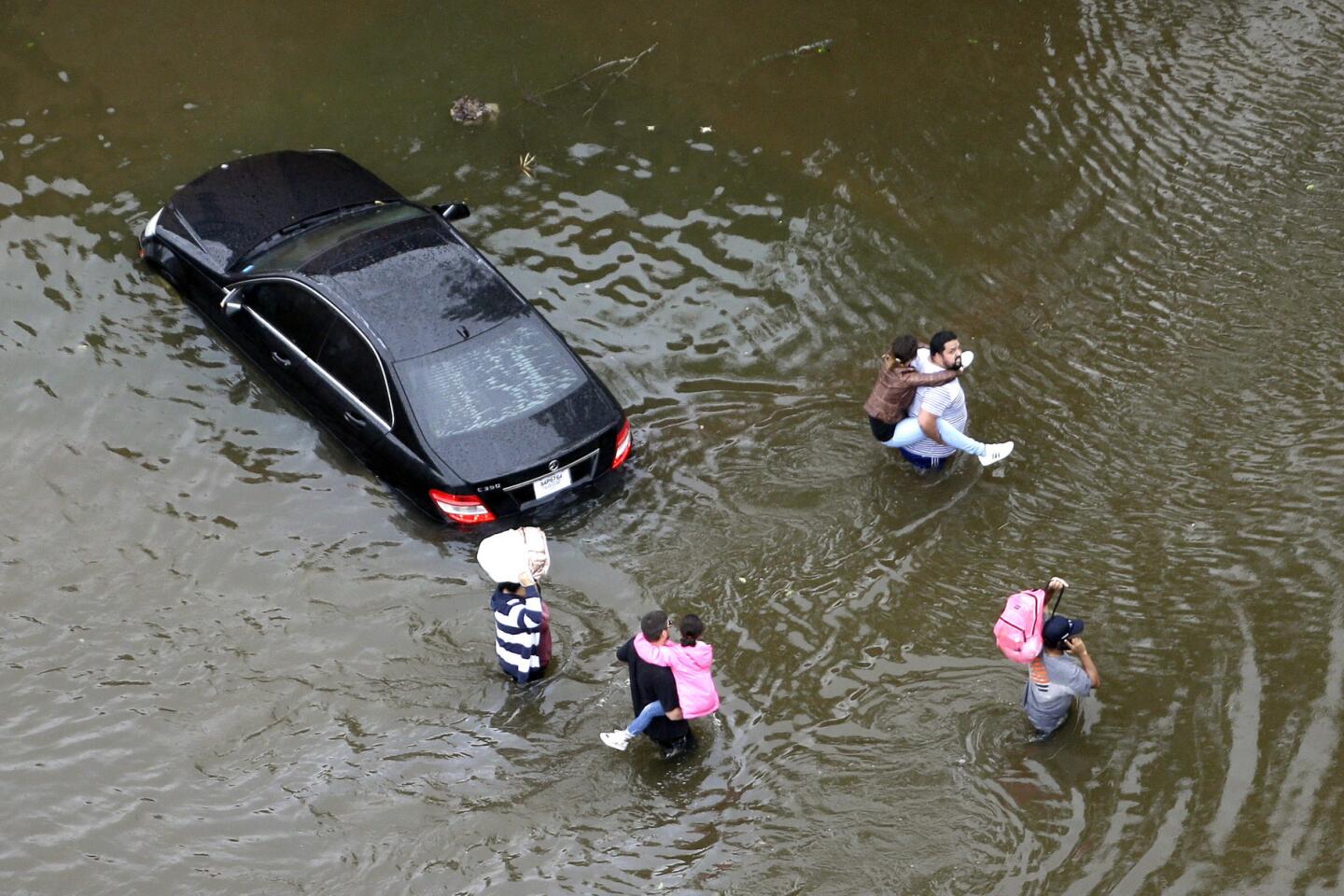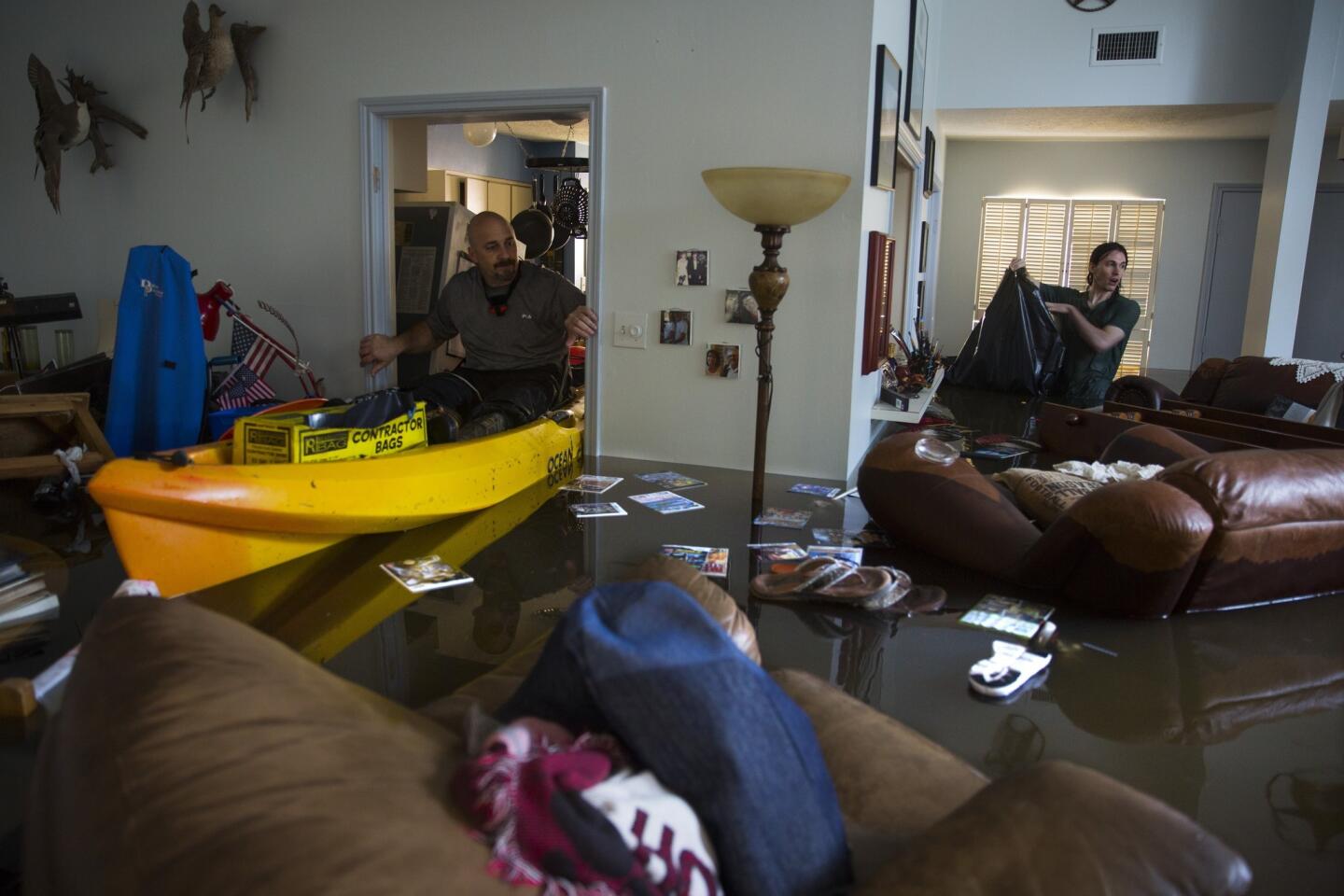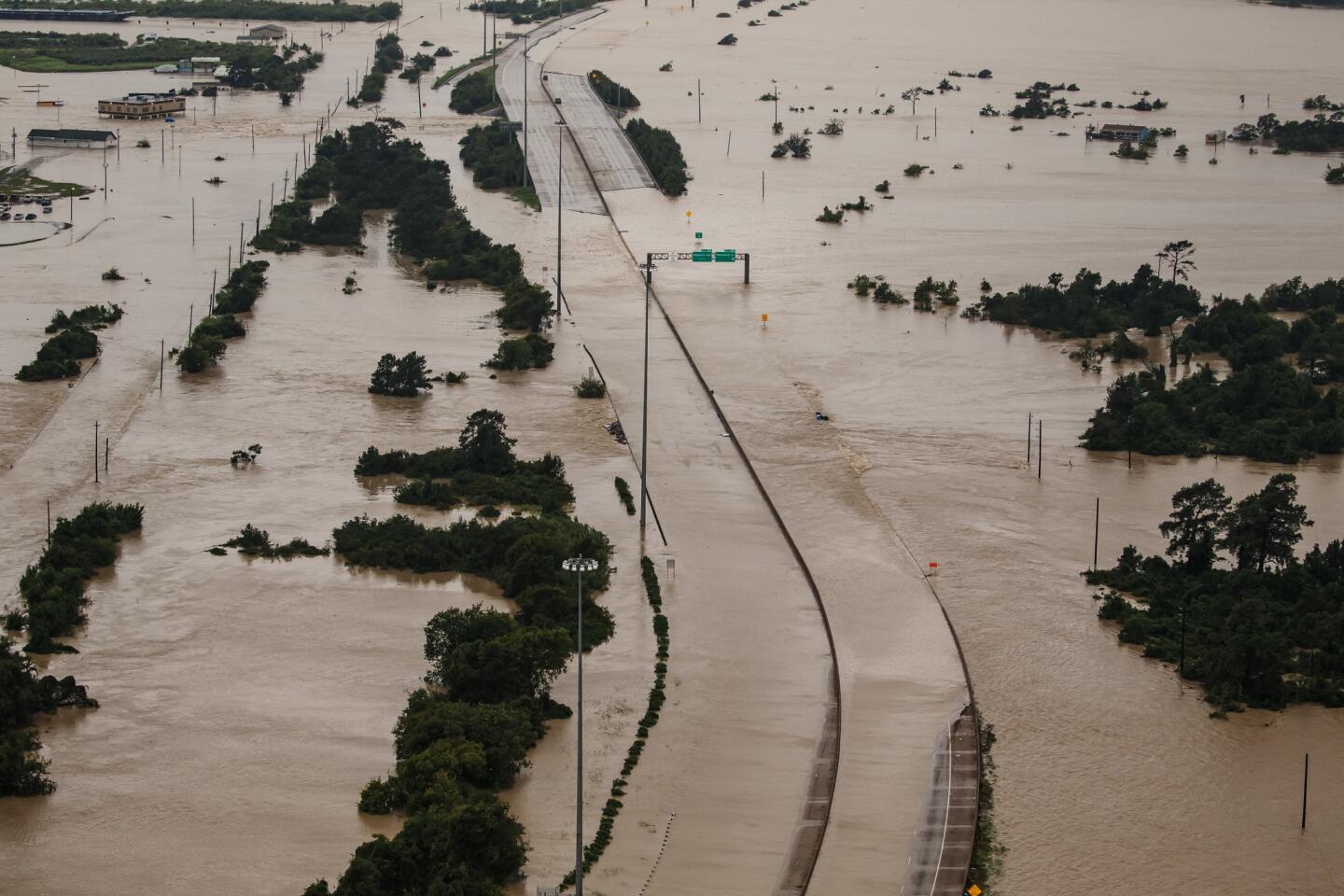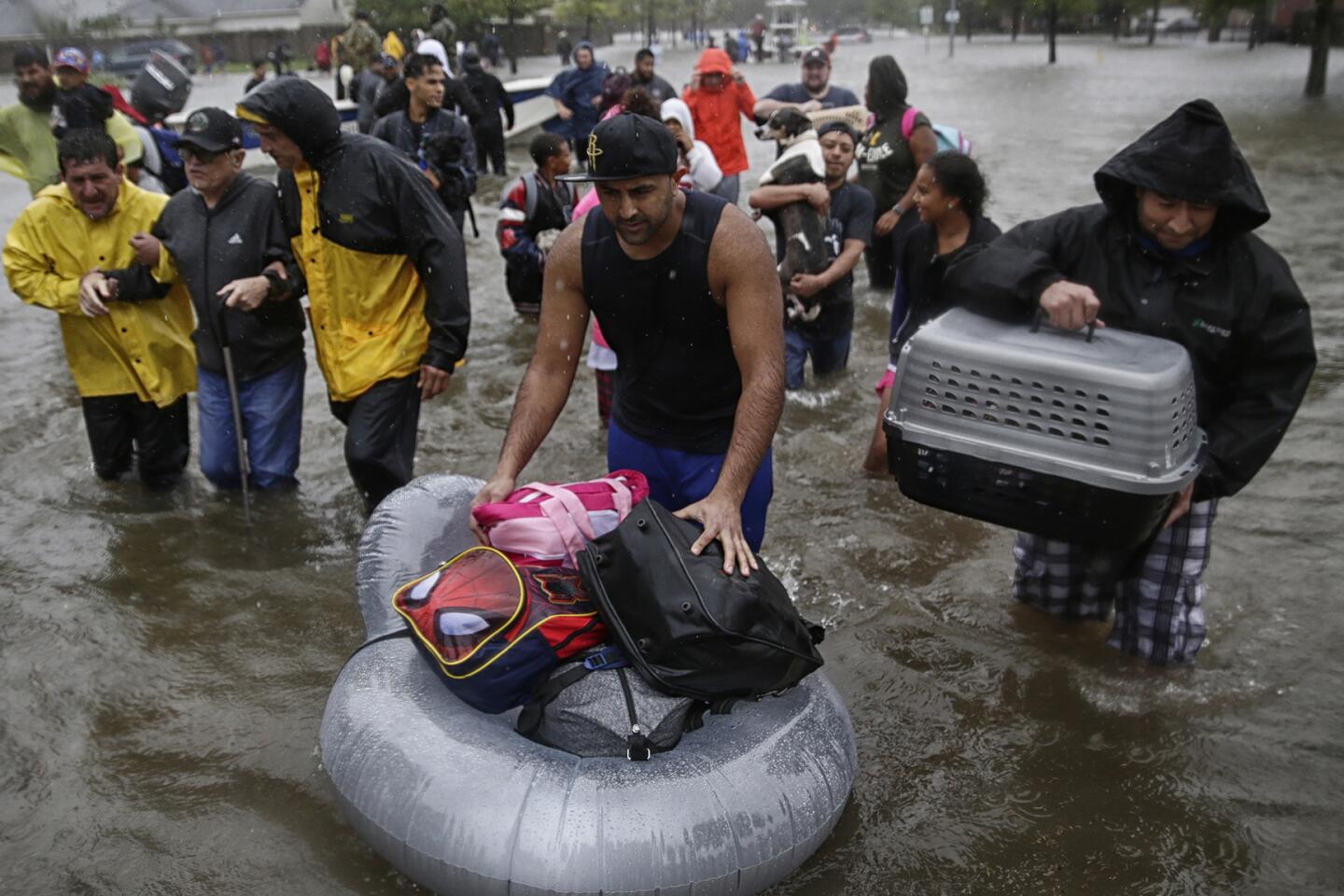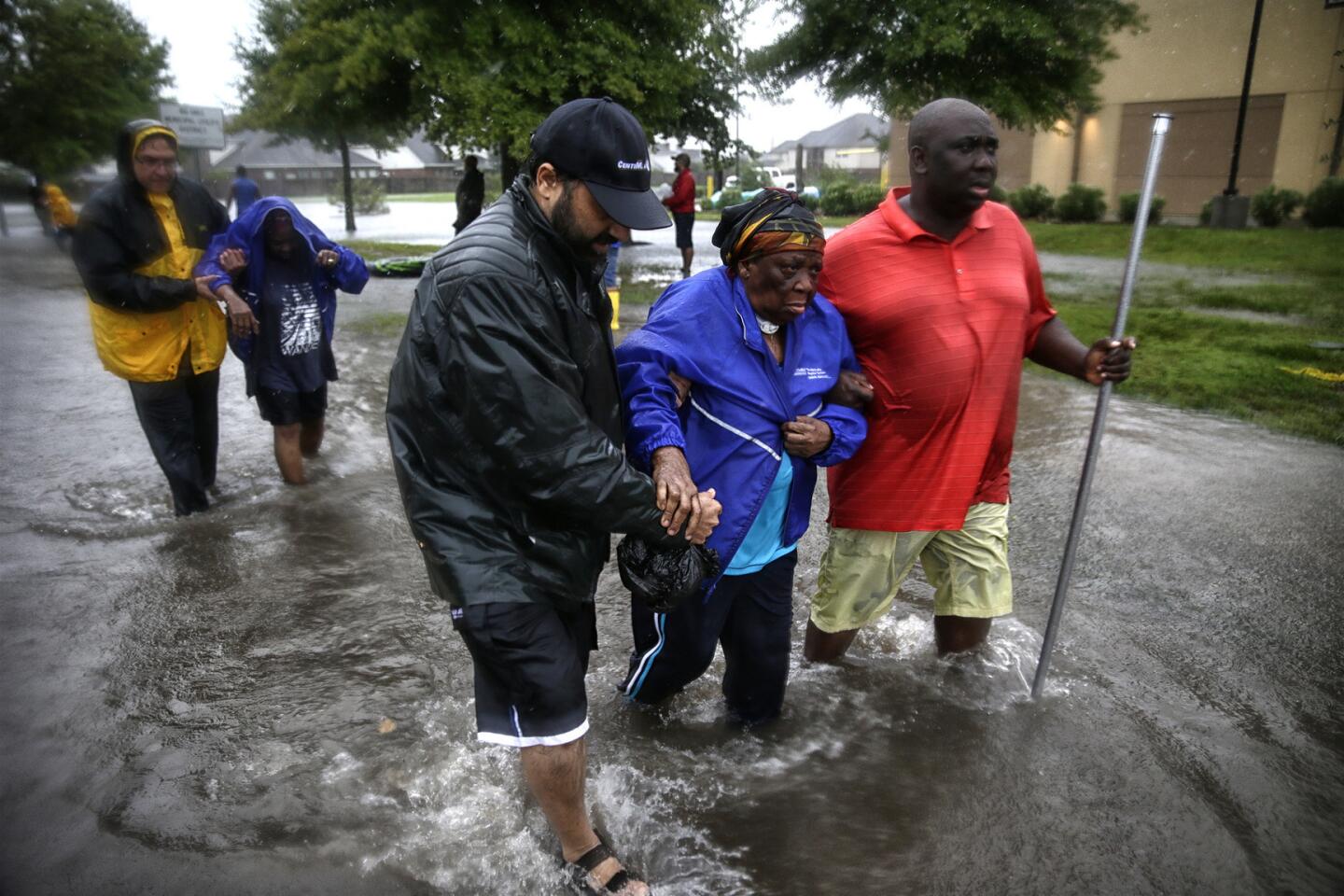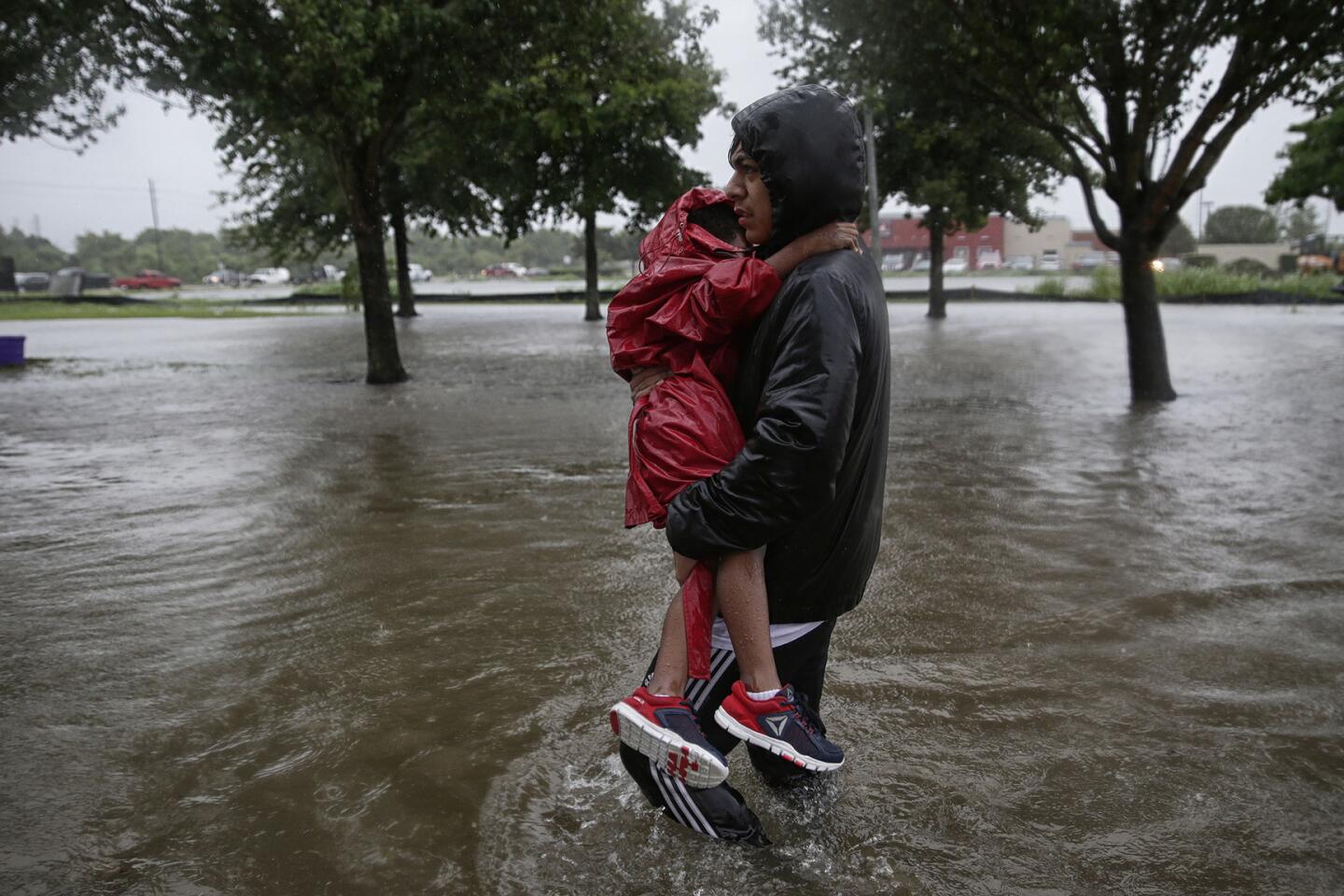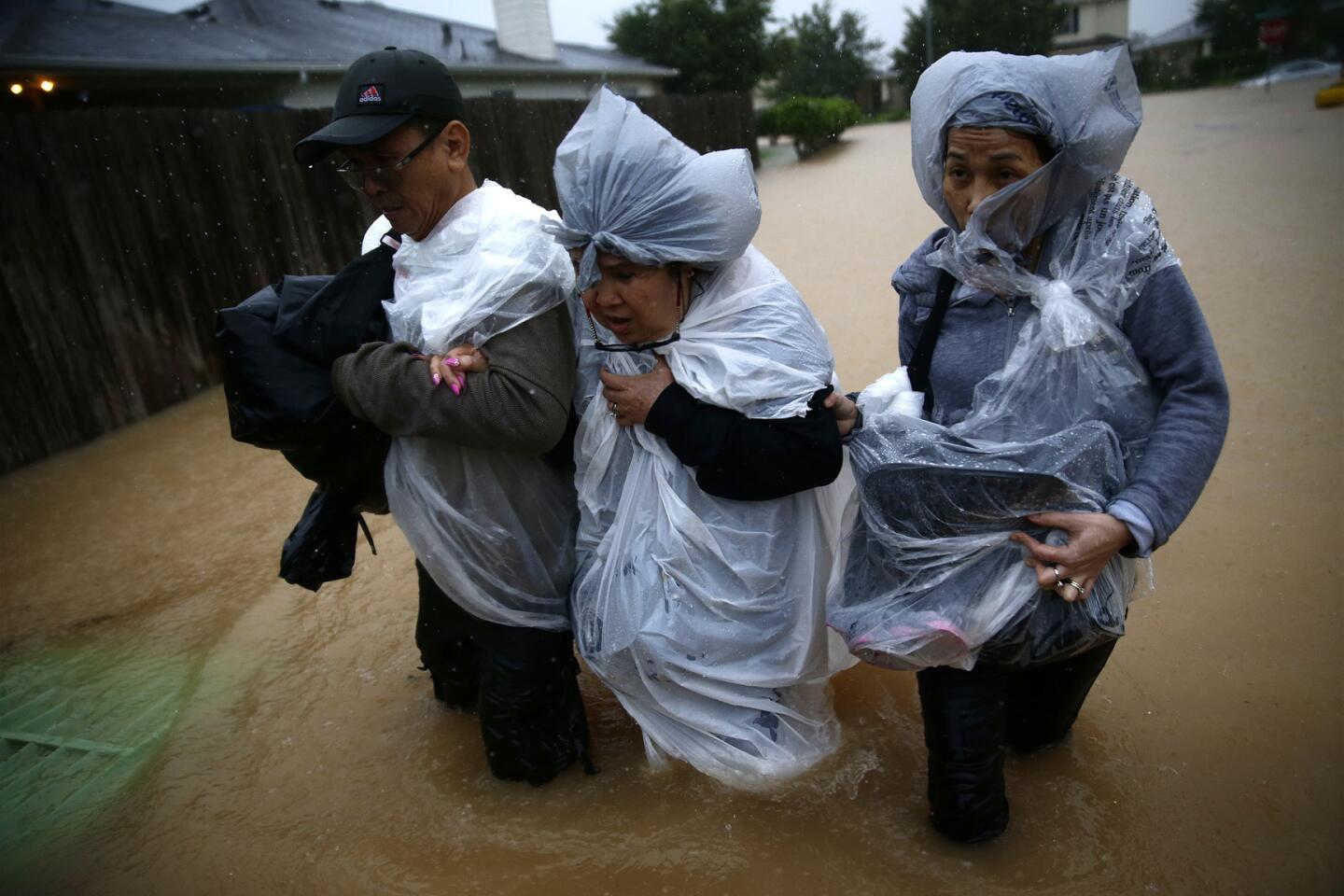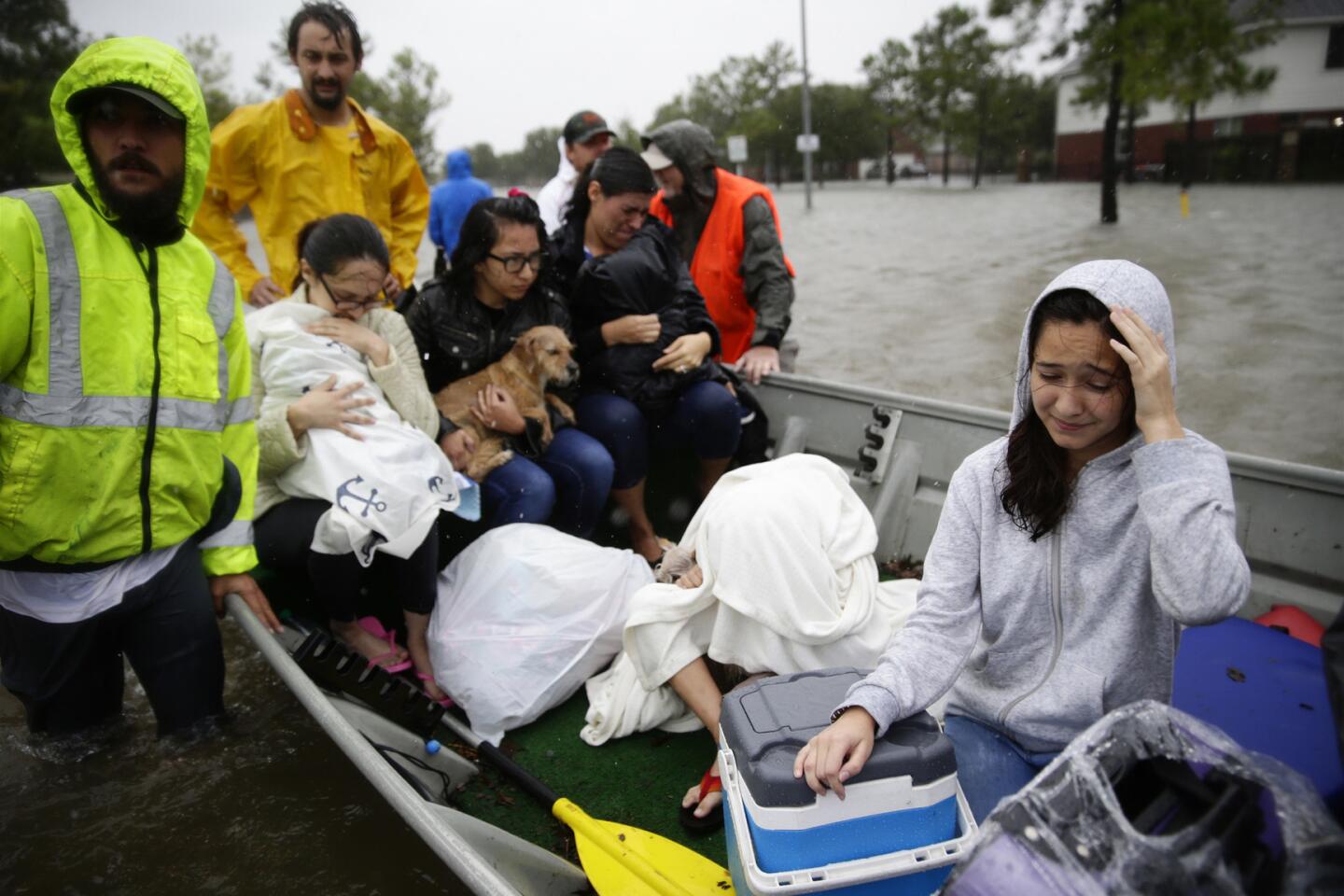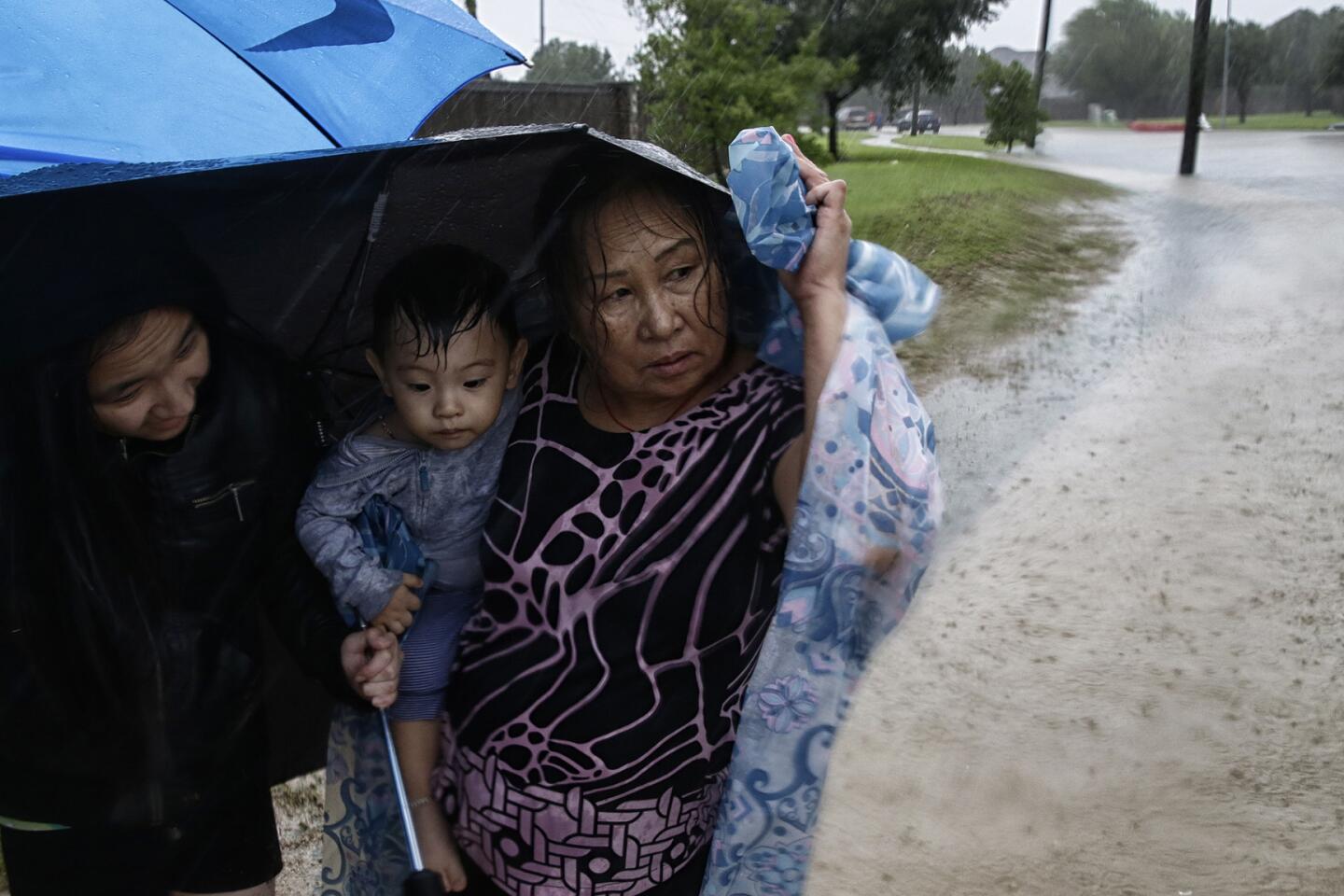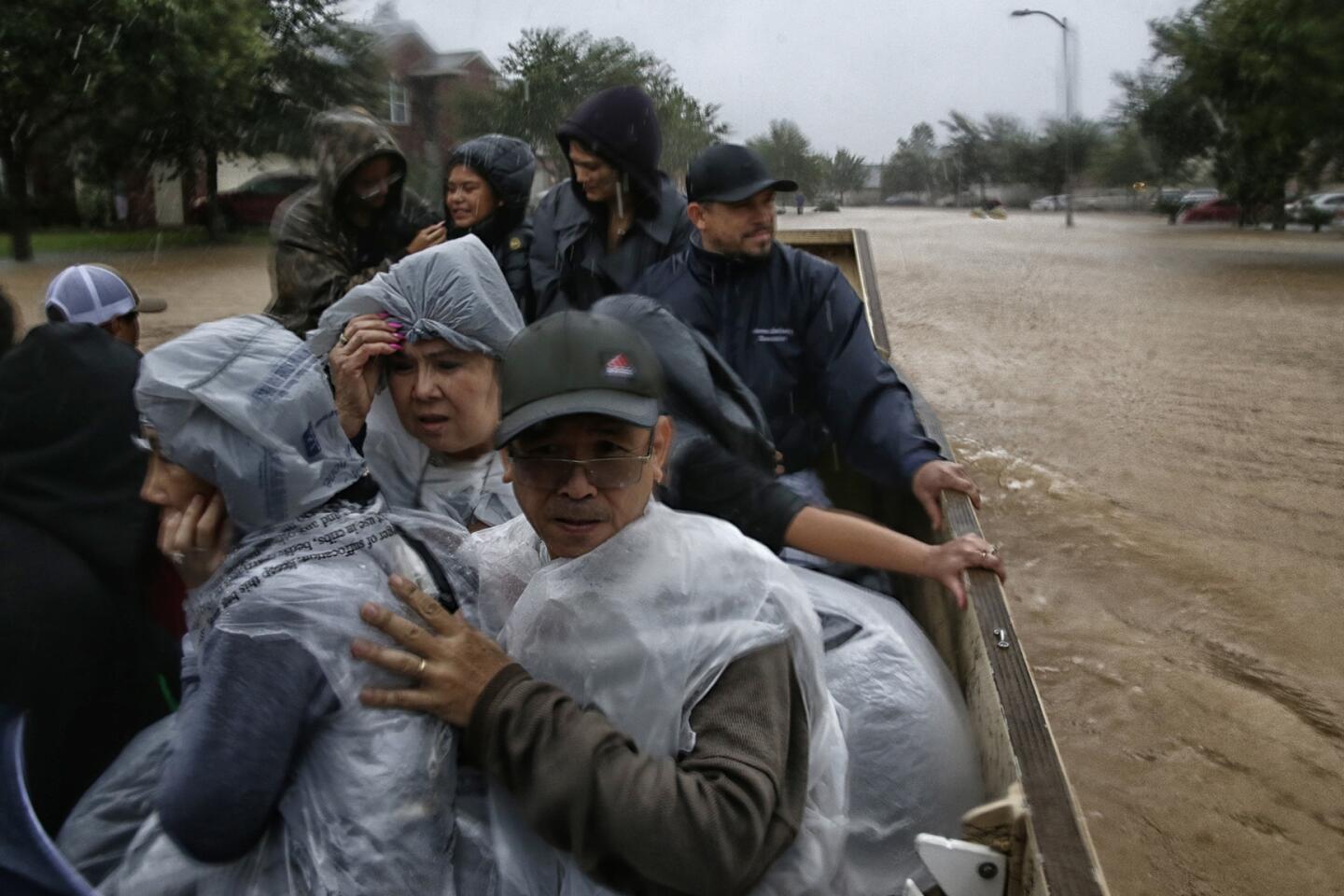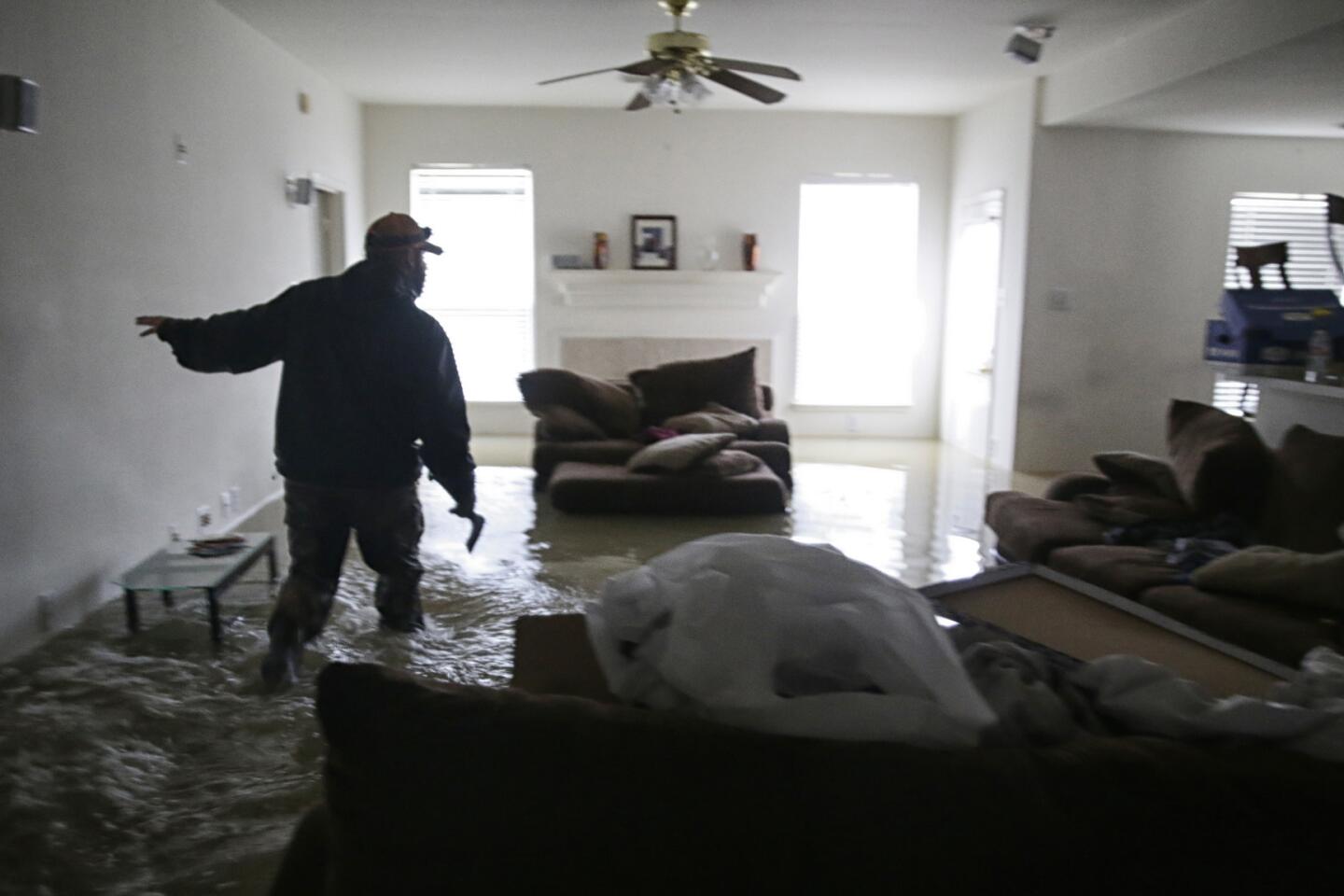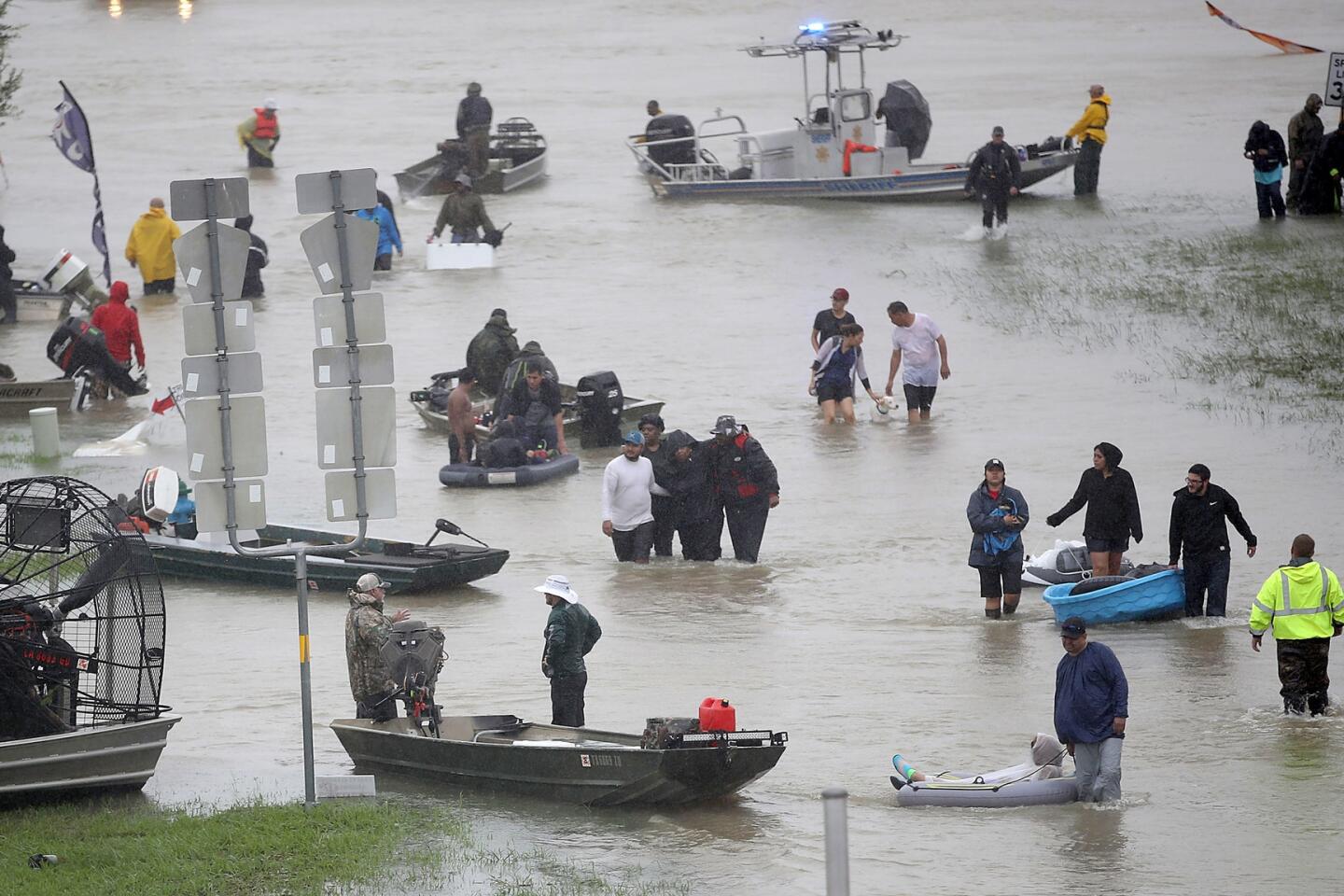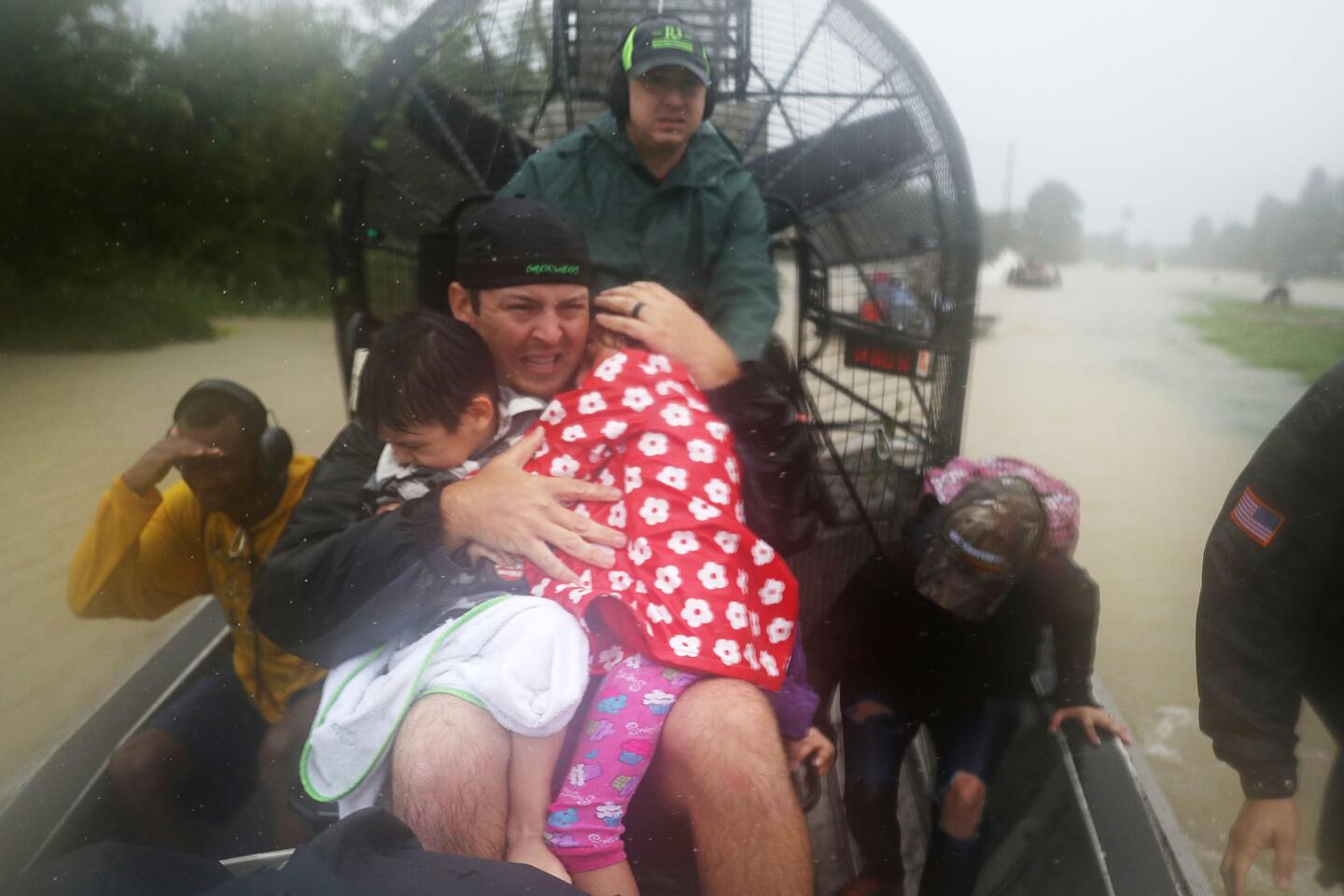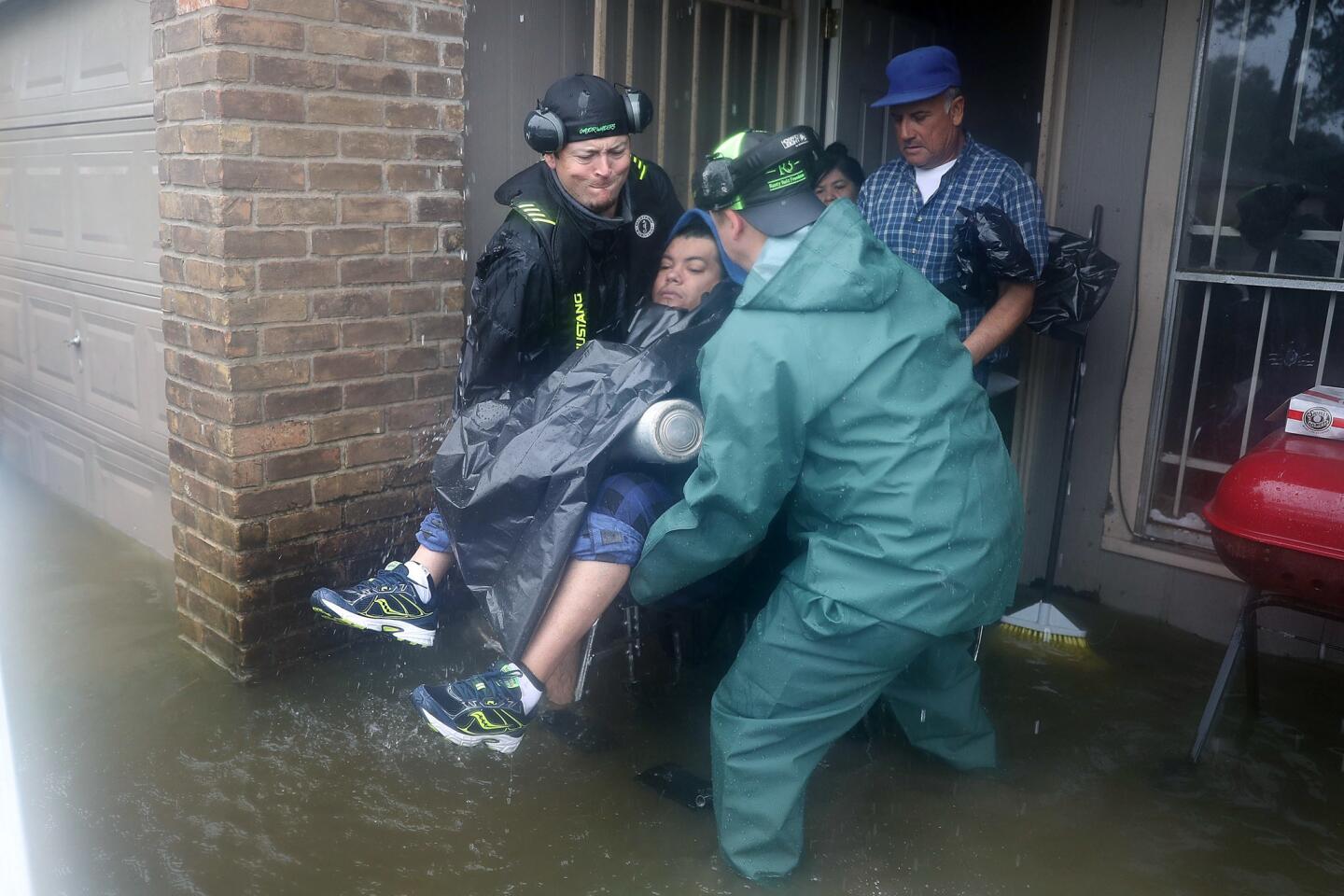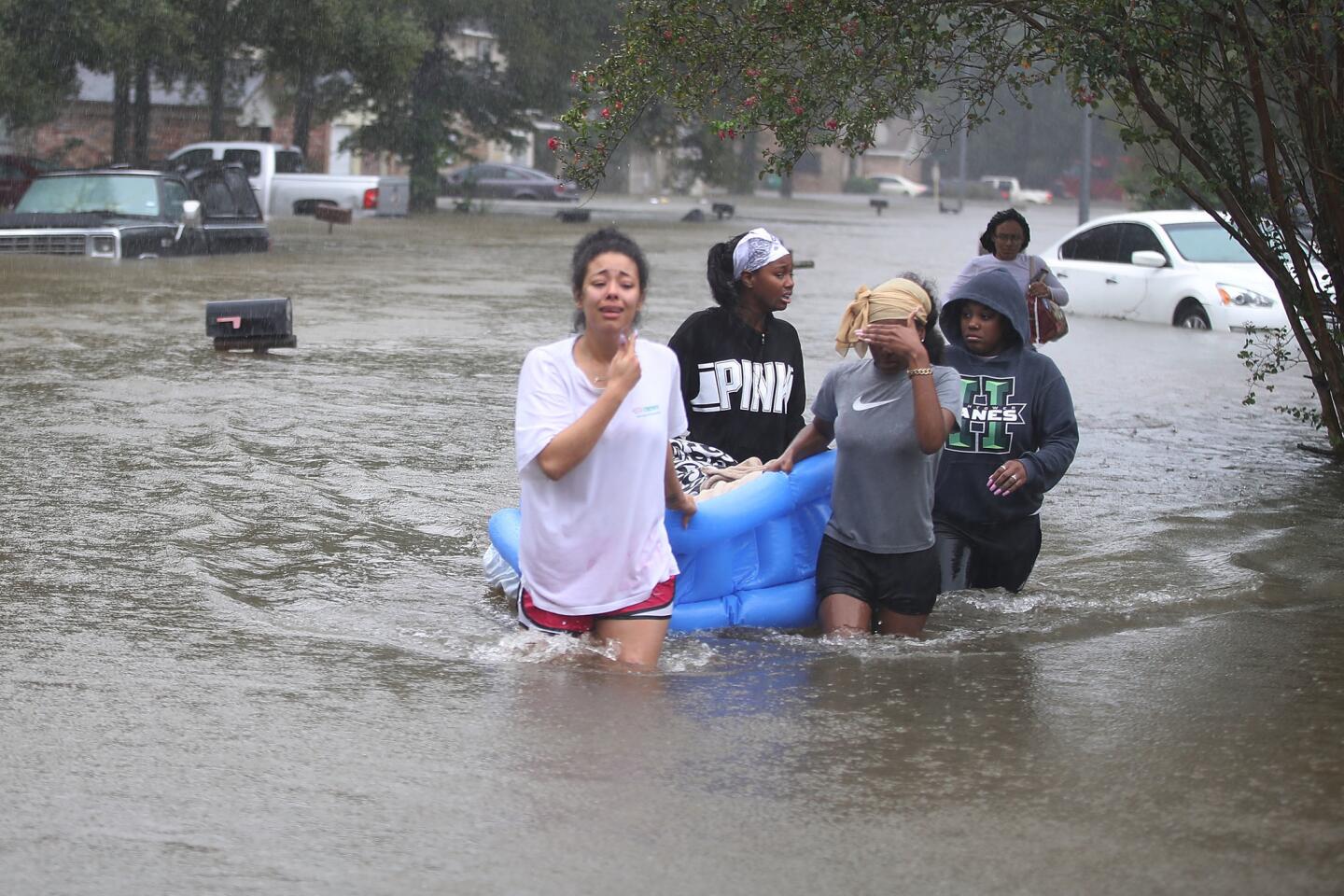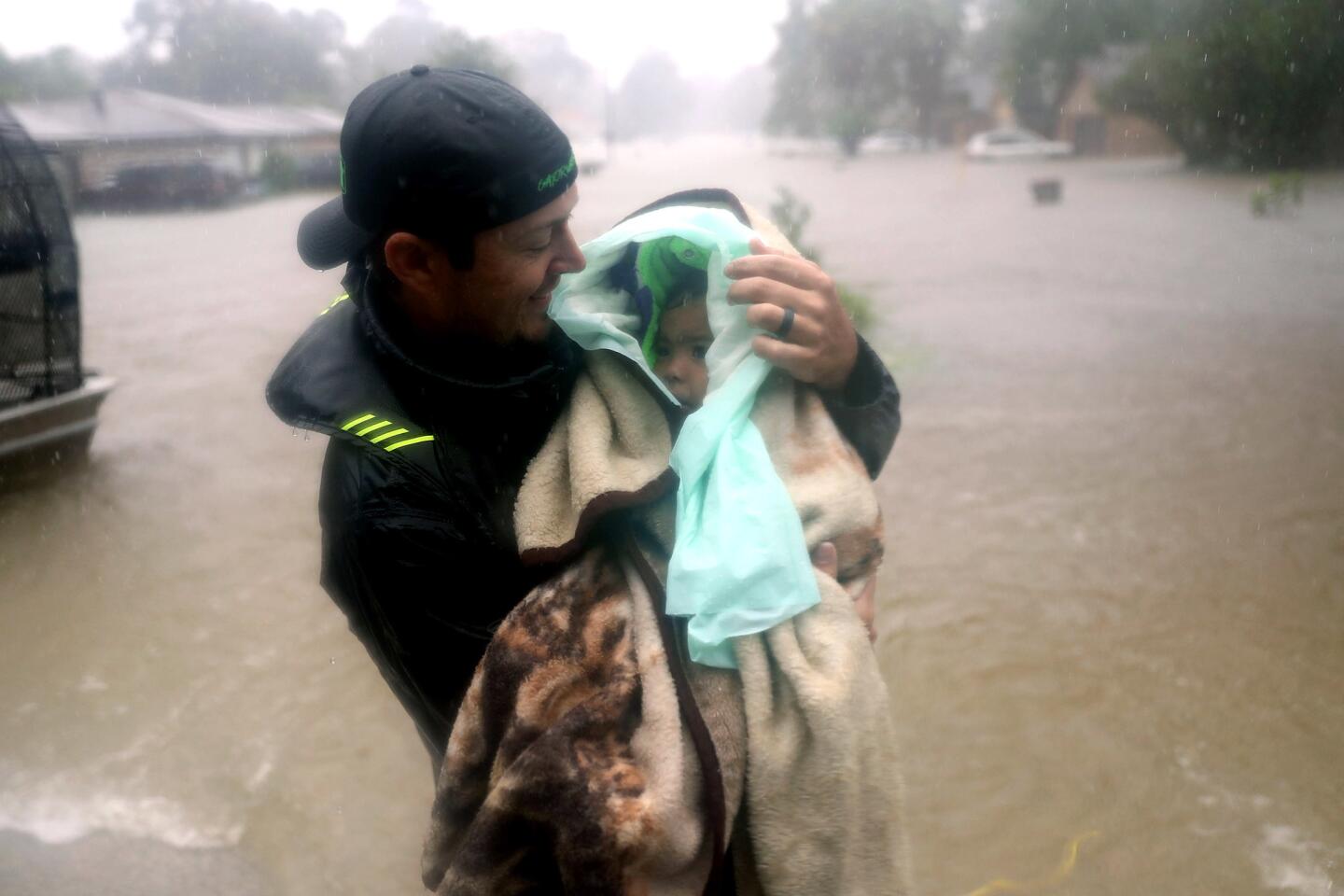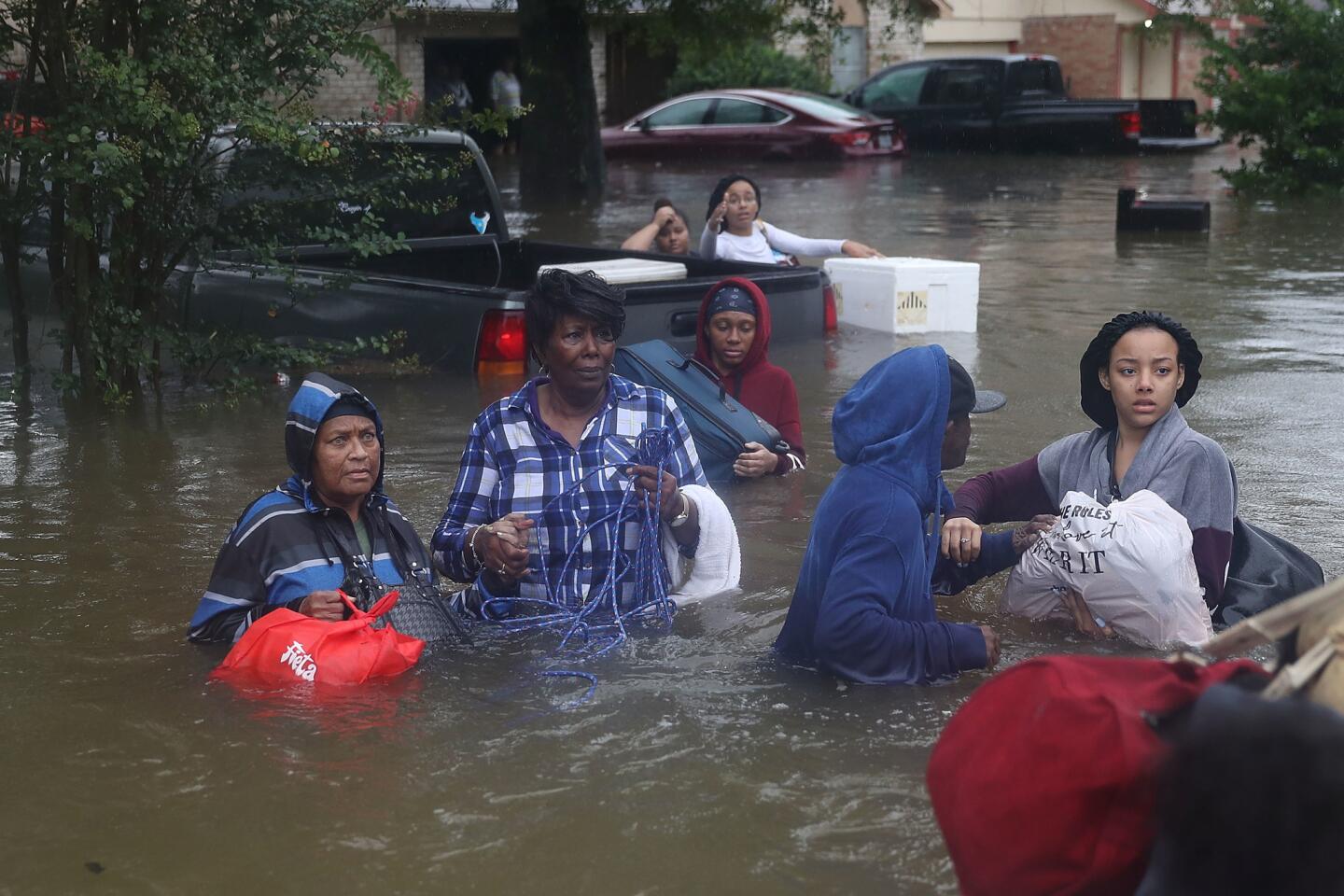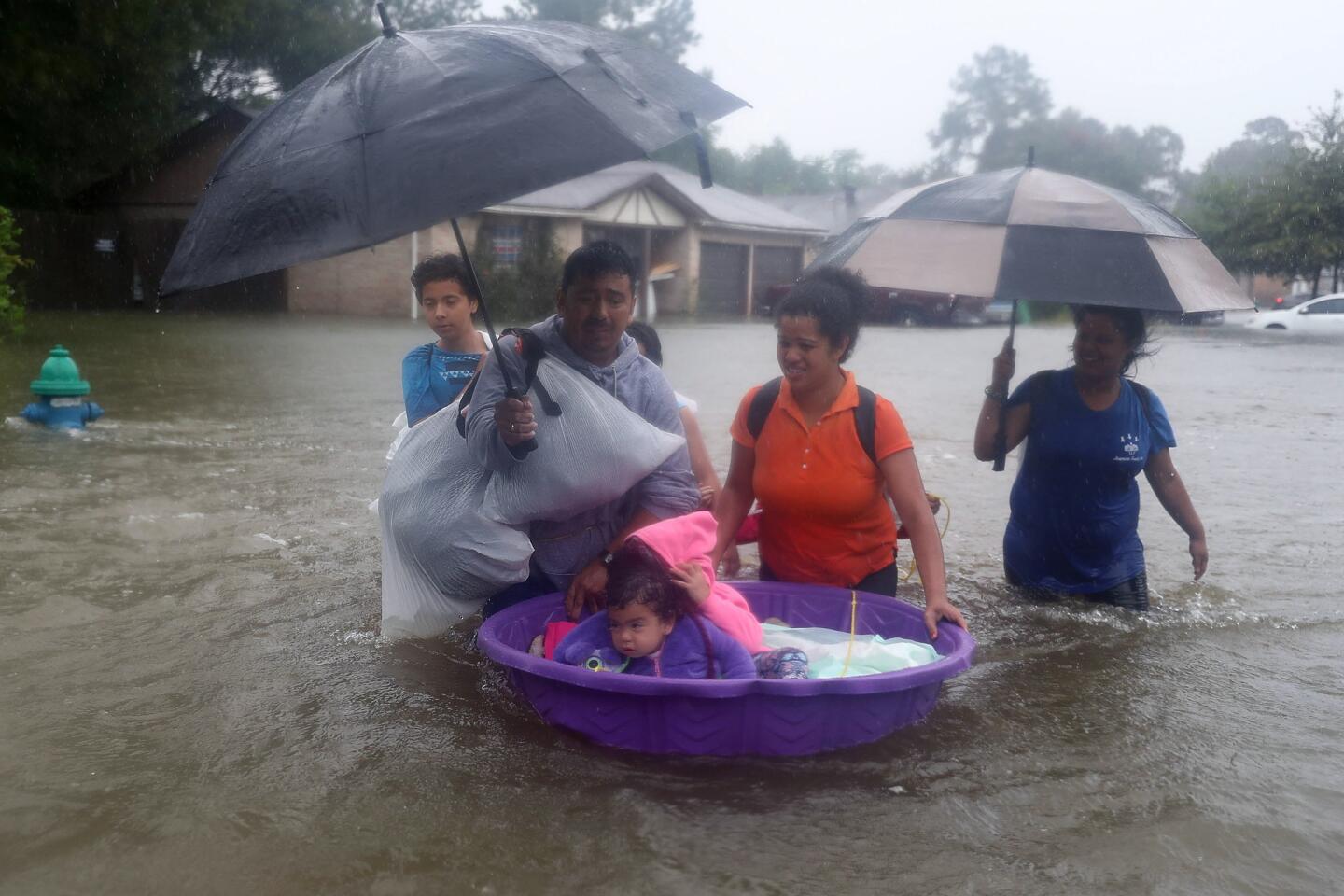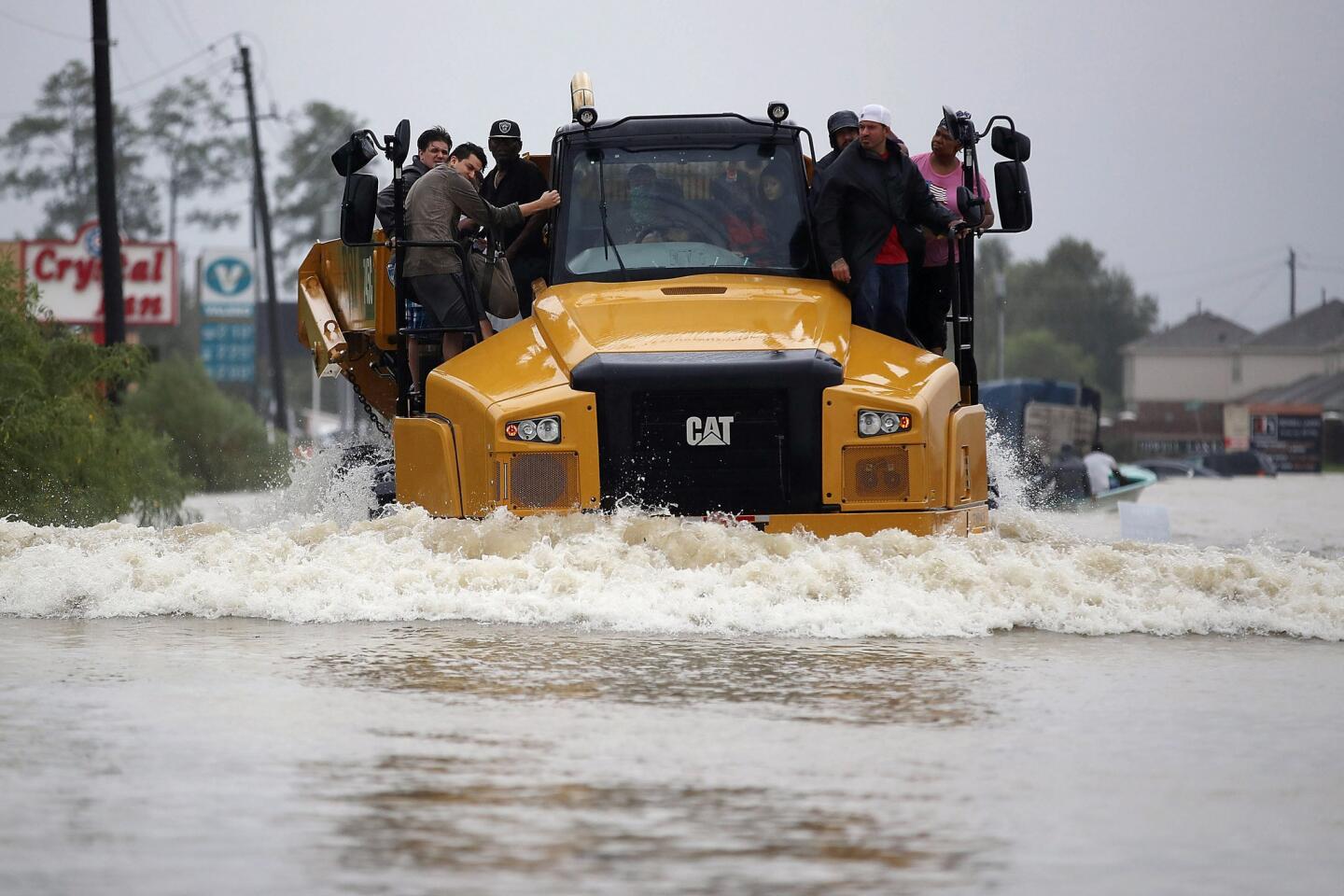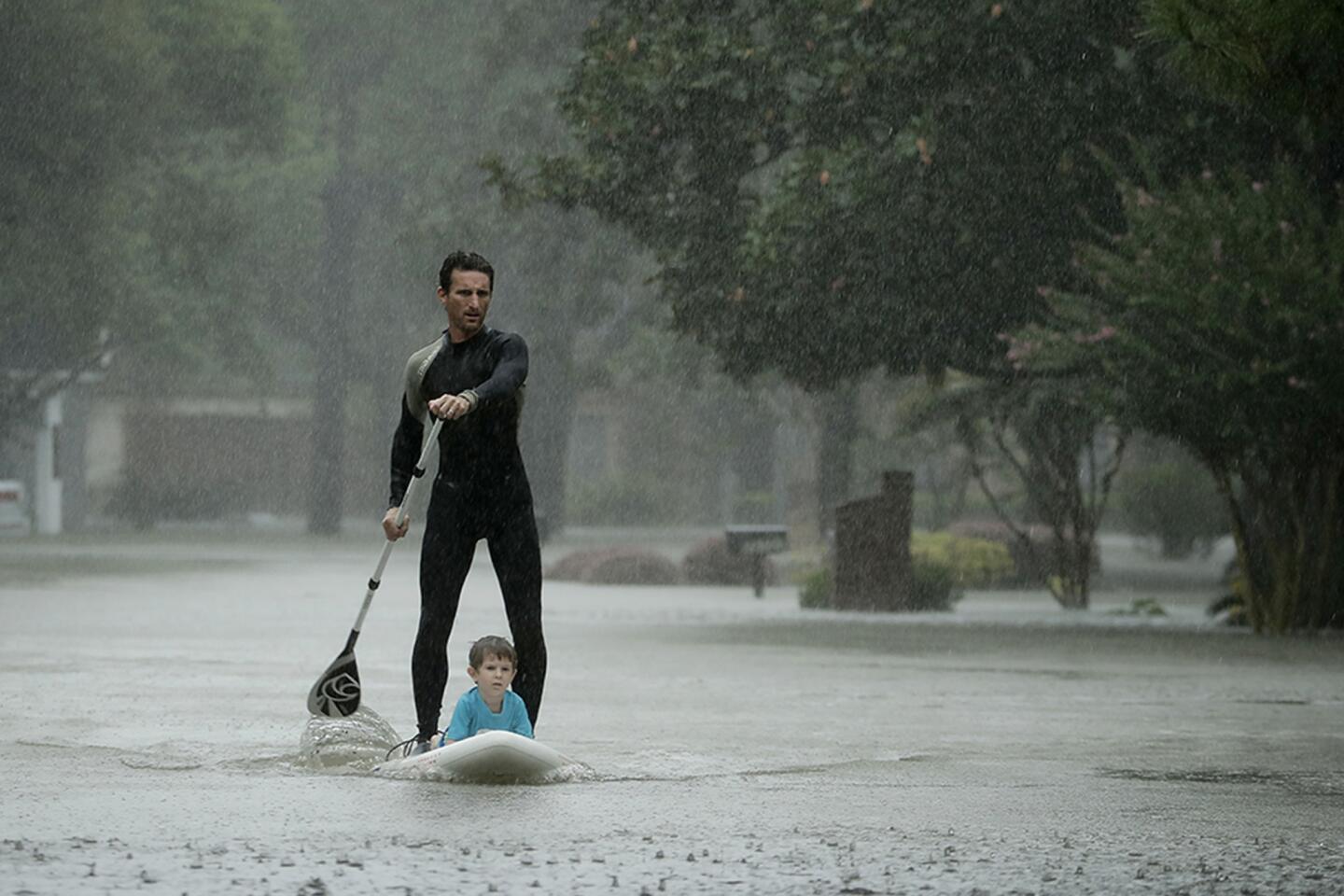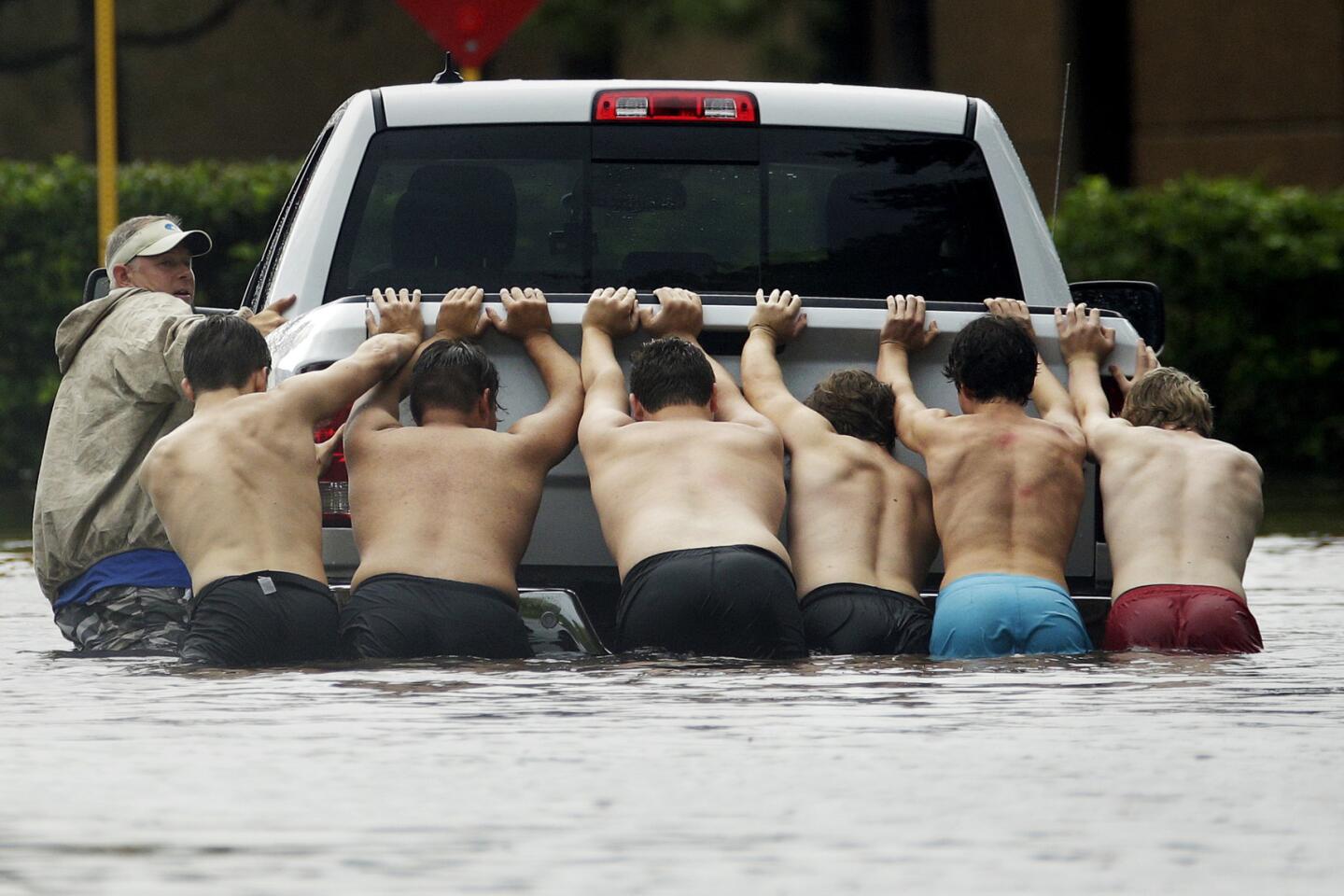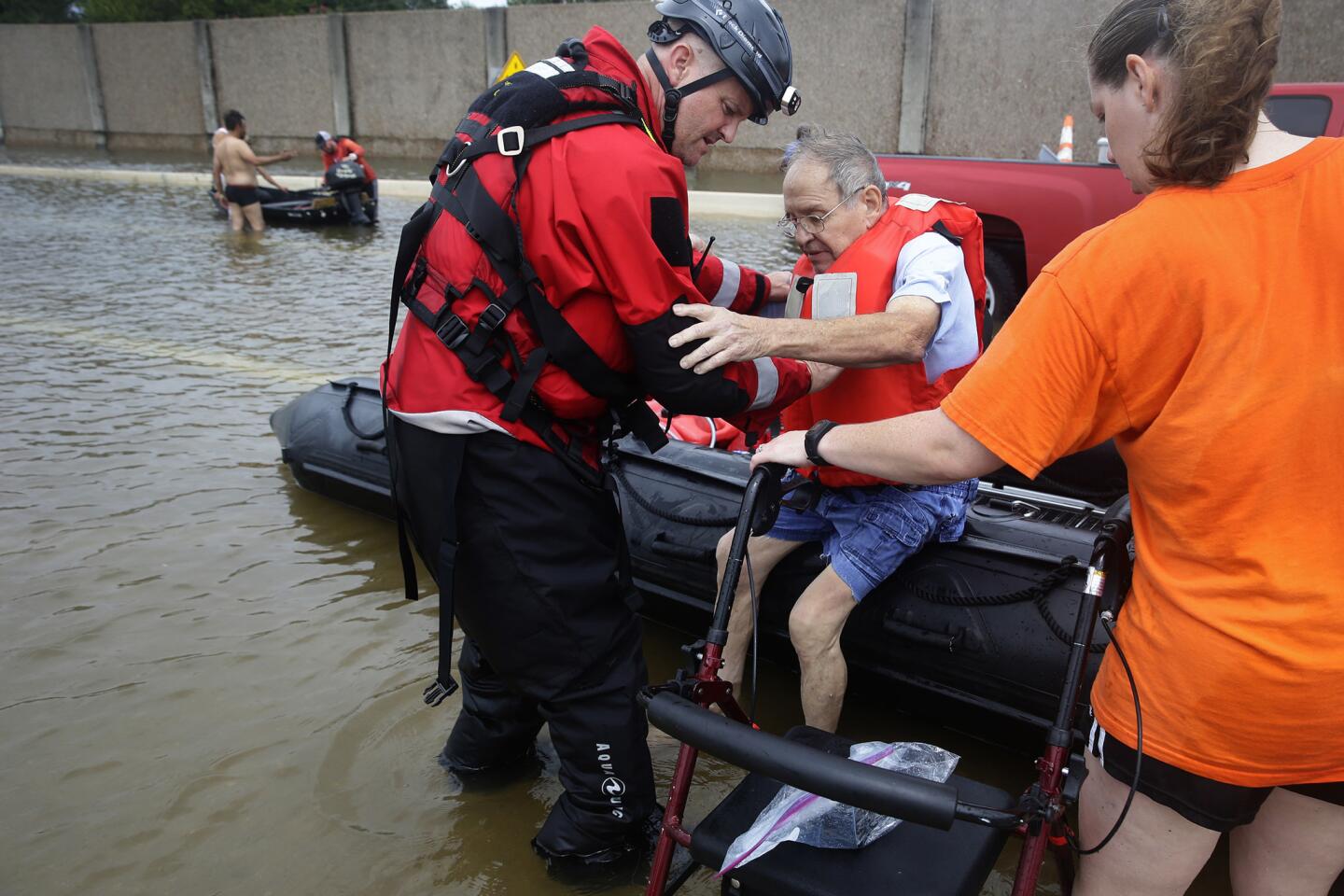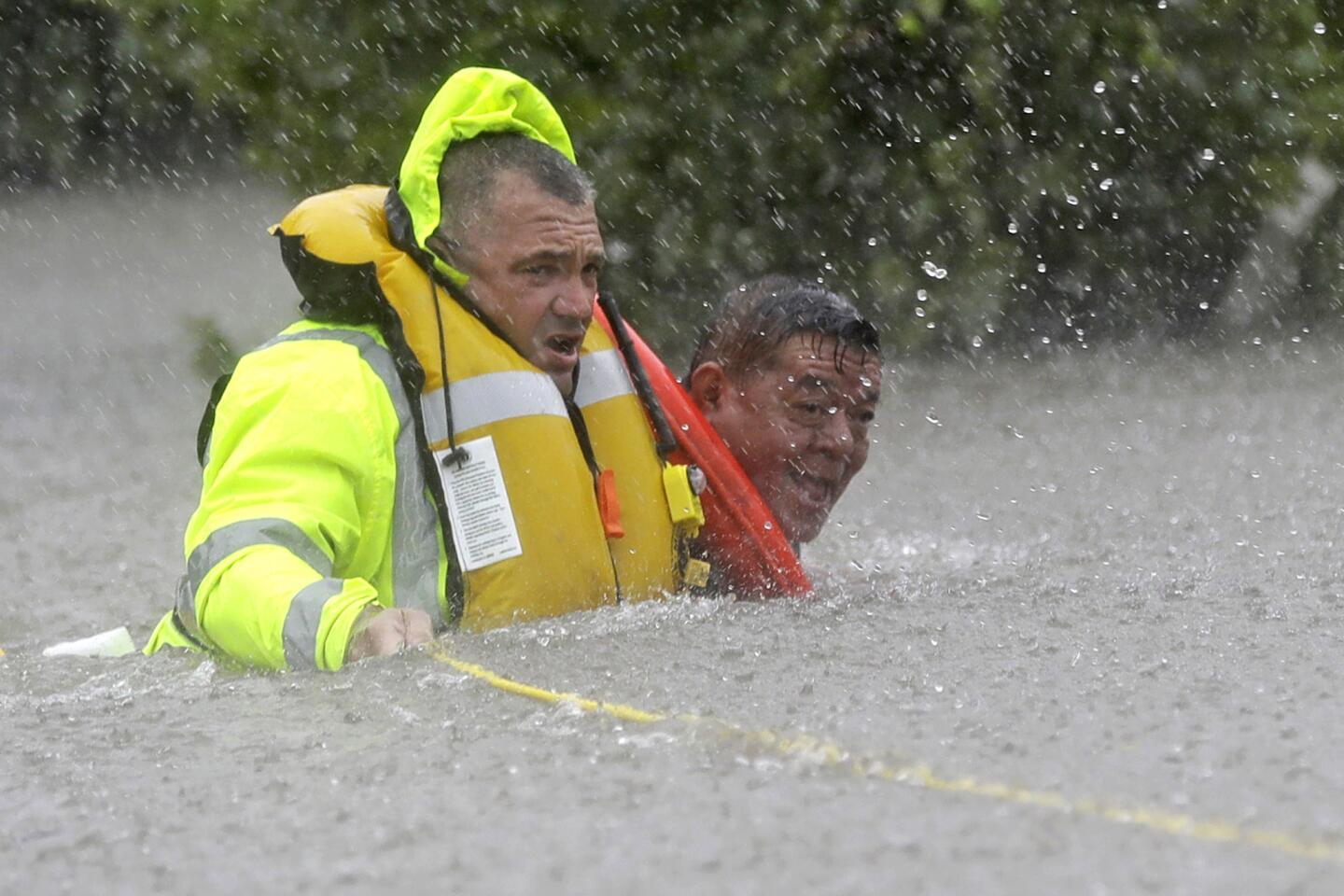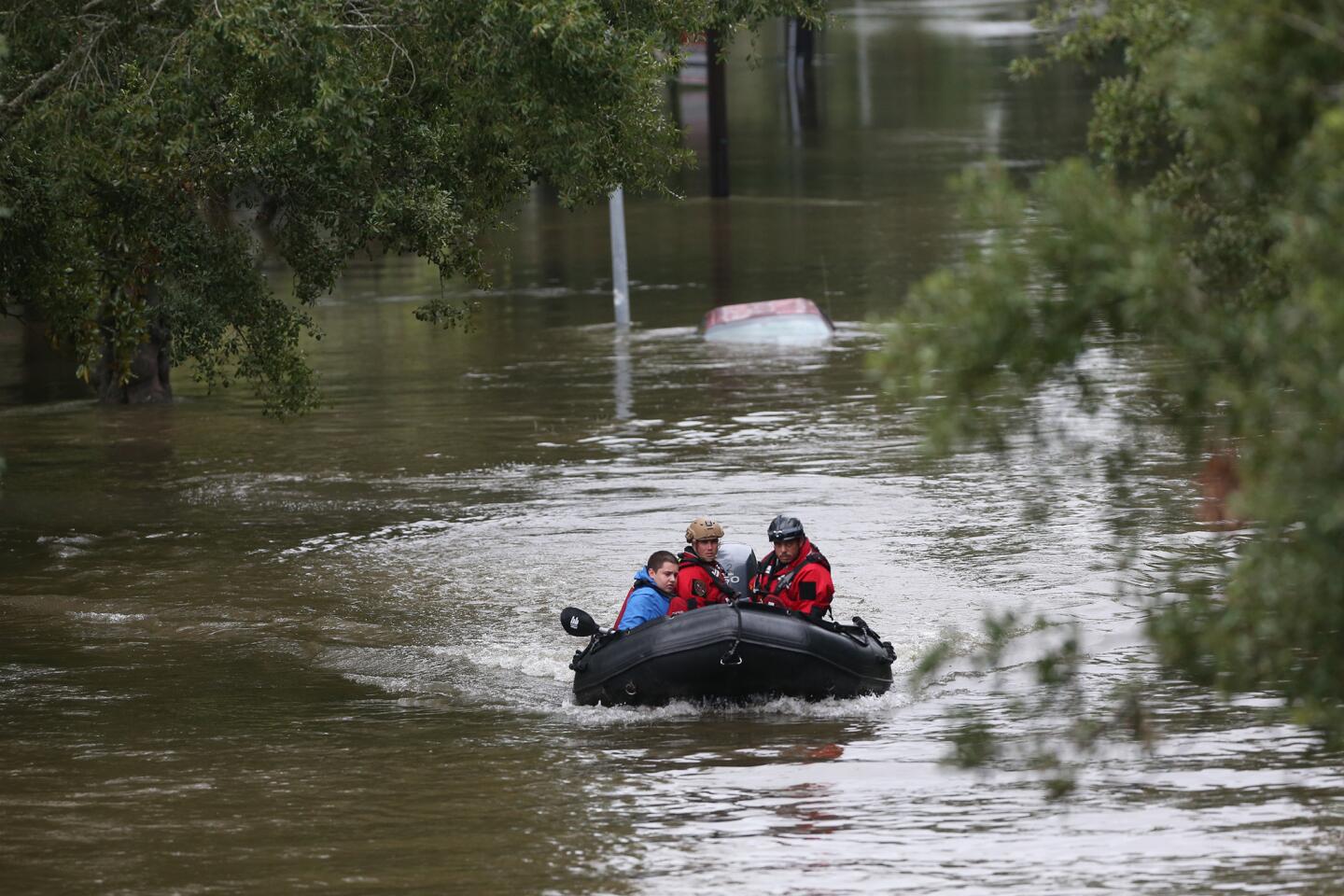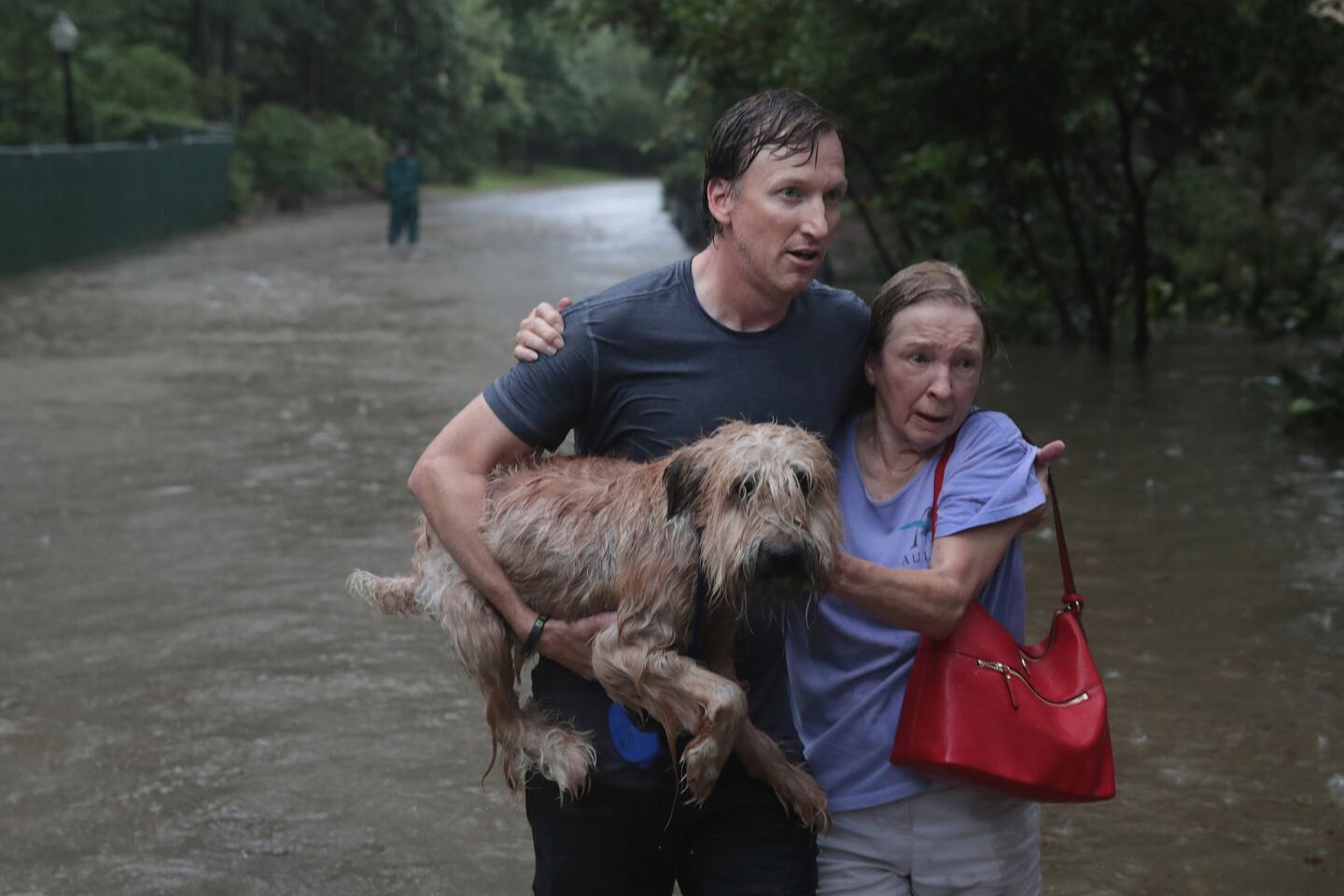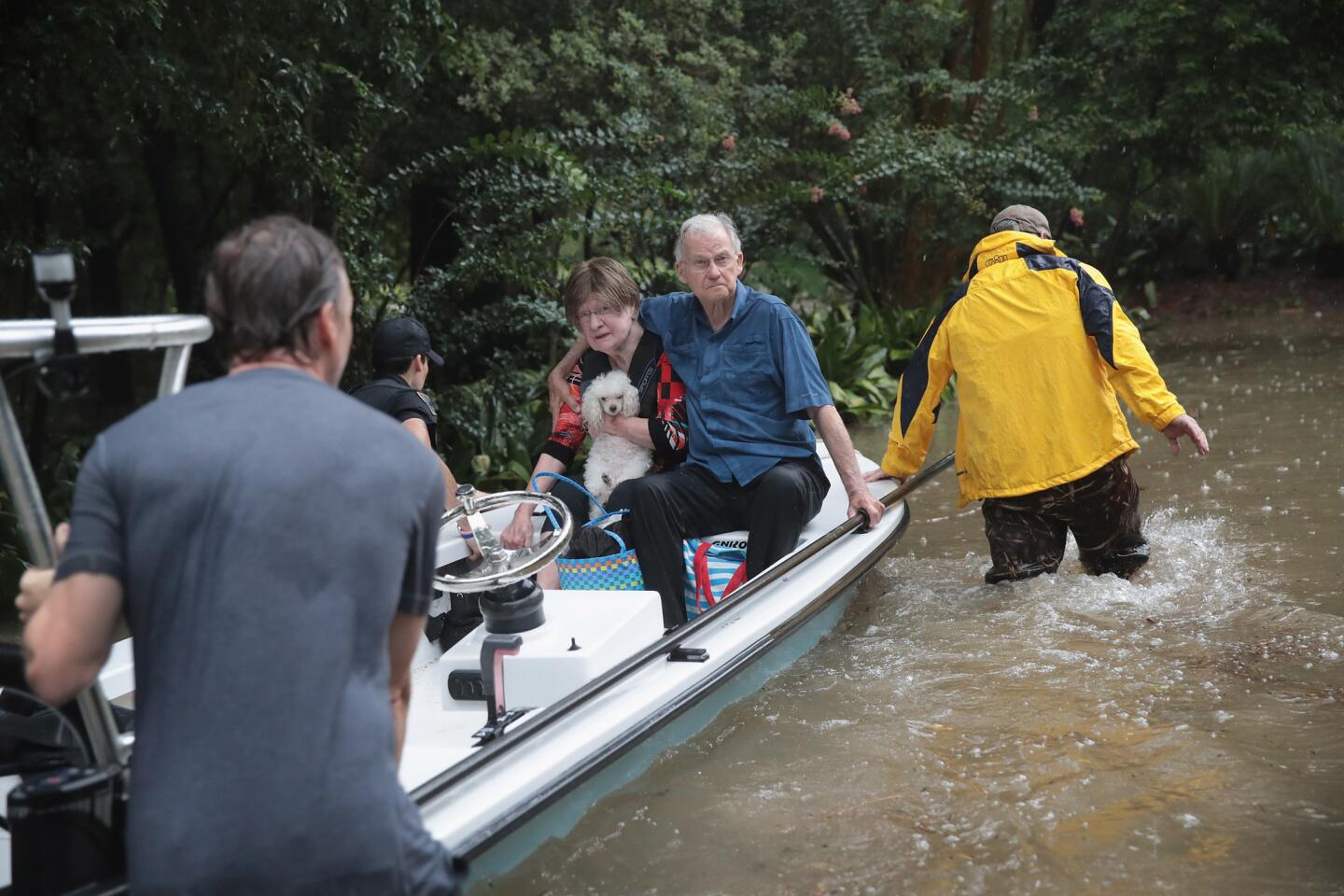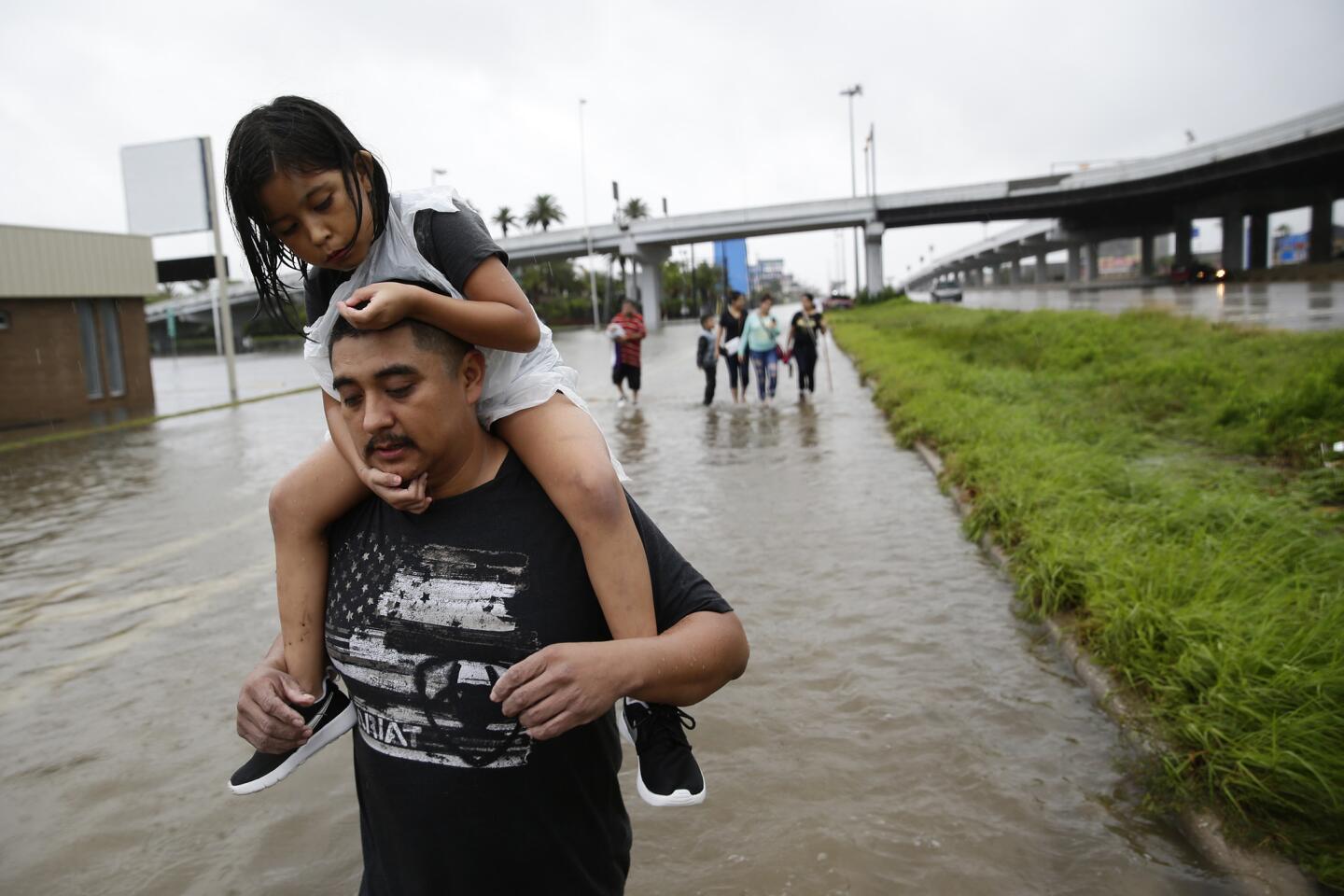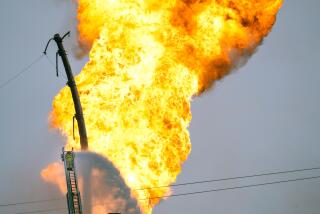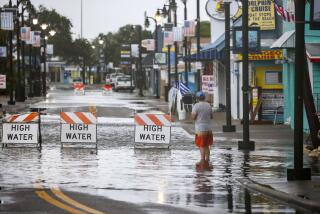Reporting from Houston — City officials in Houston imposed an overnight curfew to guard against opportunistic crimes as Tropical Storm Harvey continued to deluge southeast Texas on Tuesday, breaking the record for the most extreme rainfall on the U.S. mainland.
Authorities announced the curfew — midnight to 5 a.m. — after police arrested a crew of armed robbers who were hijacking vehicles, and officials warned residents of people impersonating Homeland Security investigators. There also were fears of looting as thousands of houses lay partially submerged and abandoned.
Since Harvey made landfall Friday night as a hurricane, some areas around Houston have seen in excess of 50 inches of rain — more than what they usually receive in a year. Authorities said the death toll had risen to 18, including a Houston police officer who drowned in his car on the way to work.
On Tuesday afternoon, the Mont Belvieu industrial suburb east of Houston recorded 51.12 inches of water since Harvey’s arrival, breaking the highest previous record of 48 inches for a single storm, from Tropical Storm Amelia in Medina, Texas, in 1978.
“It’s the heaviest storm on record anywhere in the U.S. outside Hawaii,” said John Nielsen-Gammon, Texas state climatologist and professor at Texas A&M University. “And it’s still raining.”
With muddy brown water engulfing huge areas of the nation’s fourth-largest city and much of the Gulf Coast, thousands were forced to seek refuge in shelters. Federal officials have estimated that as many as 30,000 displaced residents may seek temporary shelter and more than 450,000 people are likely to apply for federal aid.
“In four days, we’ve seen a trillion gallons of water in Harris County — enough water to run Niagara Falls for 15 days,” said Jeff Lindner, a meteorologist with the Harris County Flood Control District, who estimated that up to 100,000 homes in the 1,777-square-mile area may have flooded. “It’s beyond anything we’ve ever seen and will probably ever see.”
After moving slowly east Tuesday evening, Harvey was poised to turn northeast early Wednesday and make a second landfall, moving inland over southeast Texas and southwest Louisiana.
After assuring Texas on Monday that Congress would deliver swift federal assistance, President Trump visited the storm-ravaged state Tuesday, saying he hoped the region’s long road to recovery would be viewed as a model.
He did not venture to Houston, where rescuers continued to rove from neighborhood to neighborhood in motorboats and kayaks, desperately trying to pluck residents from waterlogged homes. As a light rain drizzled, a reservoir west of downtown Houston spilled over Tuesday morning for the first time in its history, pouring yet more water onto already sodden communities.
Houston Police Chief Art Acevedo broke down in tears Tuesday as he announced that Sgt. Steve Perez, 60, a 34-year veteran of his department, drowned during the weekend while trying to get to work through an underpass in the darkness.
“He laid down his life,” Acevedo said during a briefing, noting that before Perez left for work he told his wife, who urged him to stay home: “I’ve got work to do.”
Later in the day, Acevedo said officers had rescued 4,100 people across the city and had more than 500 calls holding. The city’s fire chief, Samuel Peña, said his department had performed nearly 700 rescues.
“We’re still trying to get to folks,” Acevedo said. “Don’t give up on us. Seek the higher ground. We will get to you.”
By the end of the day, the number of people sheltering at the George R. Brown Convention Center swelled to 10,000. Its capacity is supposed to be 5,000. Mayor Sylvester Turner said the city had asked the Federal Emergency Management Agency for cots and food for an additional 10,000 people, and officials are set to open another mega shelter at the Toyota Center, the downtown home of the NBA’s Houston Rockets.
“We are not turning anyone away,” Turner said.
Here are nine organizations providing on-the-ground services and accepting donations: (Aug. 28, 2017) (Sign up for our free video newsletter here http://bit.ly/2n6VKPR)
Houston highways remained mostly empty and blocked by police early Tuesday. A few cars and trucks navigated wet streets downtown.
Families were still arriving at the massive convention center, some with sleeping pads and rain boots, others with their belongings in garbage bags. Some feared for relatives left behind, and others worried they might soon face shortages of food and other supplies.
And the death toll kept rising. On Tuesday, local authorities reported a man in Montgomery County, north of Houston, drowned Monday night while trying to swim across a flooded road. In Galveston County, Clear Creek Independent School District reported that a former track and football coach had died in the flooding.
Tuesday night, the Harris County Institute of Forensic Sciences updated its storm-related deaths to include an 89-year-old woman, Agnes Stanley, who was found floating in 4 feet of floodwater in a home. Another woman, 76, was discovered floating in water near a vehicle. Her name was not released. A 45-year-old man, Travis Lynn Callihan, left his vehicle and fell into floodwater. He was taken to a hospital, where he died Monday.
Officials in Harris County, which includes Houston, had already reported at least six “potentially storm-related” fatalities. A 60-year-old woman died in Porter, a small community north of Houston, when a large oak tree fell on her mobile home. Another person died in the small coastal town of Rockport, near where Harvey made landfall. A 52-year-old homeless man was found dead in La Marque, a small city near Galveston.
Local officials were also looking into reports that a family of six — four children and their great-grandparents — drowned Sunday near Greens Bayou in east Houston. Virginia Saldivar, 59, said her brother-in-law, Sam, was driving her grandchildren and her husband’s parents to higher ground when the current swept up the van.
Early Tuesday, a major dam outside Houston began to overflow, threatening some of the hardest-hit neighborhoods to the west of the city. Engineers had tried to prevent Addicks Reservoir from overspilling by releasing some of its water Monday, but flood control officials reported Tuesday morning that water was beginning to seep over the top of a spillway, the first time water had breached the dam.
In some areas in and around Houston, the water was so deep that rain sensors no longer were working. The Harris County Flood Control District, a government agency that works to reduce the effects of flooding in the area, announced that multiple water level and rain sensors were out of service because of flooding.
1/87
Samir Novruzov wades through water to get to a vehicle after spending the day clearing out his flooded home in Katy, Texas.
(Marcus Yam / Los Angeles Times) 2/87
Melissa Teague, right, instructs her children Andrew and Emily as they clear out their flooded home in Katy, Texas, on Monday.
(Marcus Yam / Los Angeles Times) 3/87
People ride through floodwaters in Katy, Texas.
(Marcus Yam / Los Angeles Times) 4/87
People hop off Chris Ginter’s truck as he helps ferry residents around Katy, Texas.
(Marcus Yam / Los Angeles Times) 5/87
Two men collect a disposed mattress as residents in the Trinity/Houston Garden area of northeast Houston gut their flooded homes.
(Robert Gauthier / Los Angeles Times) 6/87
Wayne Christopher, center, weeps as his wife, Helen, looks on during a Sunday service at First United Methodist Church in Dickinson, Texas.
(Marcus Yam / Los Angeles Times) 7/87
Hurricane Harvey severely damaged the First Baptist Church in Rockport, Texas. Worshipers on Sunday brought their own chairs to take part in an outdoor service.
(Robert Gauthier / Los Angeles Times) 8/87
Ken Garrett, right, hugs Pastor Jordan Mims after they both delivered prayers on the grounds of the First Baptist Church in Rockport, Texas.
(Robert Gauthier / Los Angeles Times) 9/87
University of Houston law professor Johnny Buckles props up an American flag on the debris pile from his flood-damaged home in the Kingwood area of north Houston.
(Robert Gauthier / Los Angeles Times) 10/87
Jose Esquivel flags down motorists to visit a parking lot full of donated clothes, supples, water and brisket in Refugio, Texas.
(Robert Gauthier / Los Angeles Times) 11/87
Despite heavy damage and no electricity, a homeowner displays his patriotism while clean up and recovery efforts continue in his devastated neighborhood of Rockport.
(Robert Gauthier / Los Angeles Times) 12/87
Volunteers from the Ahmadiyya Muslim Youth Association, Yusuf Seager, from left, Rahib Ahmed, Rahman Nasir, and Khalil Nasir help tear out drywall damaged by floodwater in the Westbury neighborhood in Houston.
(Marcus Yam / Los Angeles Times) 13/87
Volunteers from the Ahmadiyya Muslim Youth Association help residents of the Westbury neighborhood in Houston clear debris from their homes. It is also the Islamic holiday of Eid-ul-Adha. (Marcus Yam / Los Angeles Times)
(Marcus Yam / Los Angeles Times) 14/87
Many roads and Interstates in Texas remain flooded, including this one in west Houston. (Robert Gauthier / Los Angeles Times)
15/87
Jenna Fountain and her father Kevin carry a bucket down Regency Drive to try to recover items from their flooded home in Port Arthur, Texas on Thursday.
(Emily Kask / AFP / Getty Images) 16/87
Lillie Roberts talks with family members as contractor Jerry Garza begins the process of repairing her Houston home on Friday.
(Scott Olson / Getty Images) 17/87
Volunteers from the Ahmadiyya Muslim Youth Association to perform holy prayer as they help local residents in the Kashmere Gardens area of Houston clean out their flooded homes.
(Marcus Yam / Los Angeles Times) 18/87
Volunteers assist Cornell Beasley with repairs to his damaged home in Houston on Friday.
(Scott Olson / Getty Images) 19/87
Katie Estridge organizes hundreds of soaked family photographs on the front lawn of her father’s home in northeast Houston.
(Robert Gauthier / Los Angeles Times) 20/87
Wes Higgins wipes sweat from his face after spending five days patrolling flooded Houston neighborhoods in his boat. Higgins, from Knott, Texas, organized a volunteer team of 10 boats to help Houston residents.
(Robert Gauthier / Los Angeles Times) 21/87
Members of the California Air National Guard 129th Rescue Wing, Senior Airman George McKenzie, left, and Master Sgt. Adam Vanhaaster, right, help a man carry his infant, who has a serious medical condition, to a hospital in Orange, Texas.
(Marcus Yam / Los Angeles Times) 22/87
A search-and-rescue crew speeds along Maple Rock Drive in west Houston looking for flood victims.
(Robert Gauthier / Los Angeles Times) 23/87
A woman and a child are among those rescued by California Air National Guardsmen in Lumberton, north of Beaumont.
(Marcus Yam / Los Angeles Times) 24/87
California Air National Guard 129th Rescue Wing’s Master Sgt. Adam Vanhaaster searches for people in need of help near Lumberton.
(Marcus Yam / Los Angeles Times) 25/87
A man prepares his dinner at home near Lumberton.
(Marcus Yam / Los Angeles Times) 26/87
Boys sit on a damaged railroad track near Lumberton.
(Marcus Yam / Los Angeles Times) 27/87
A woman waves to a California Air National Guard helicopter from her neighborhood near Lumberton.
(Marcus Yam / Los Angeles Times) 28/87
A drop-off point for boat rescues in Lumberton.
(Marcus Yam / Los Angeles Times) 29/87
Baseball fields in Lumberton are inundated.
(Marcus Yam / Los Angeles Times) 30/87
Coca-Cola delivery trucks are trapped by floodwater in Lumberton, Texas.
(Marcus Yam / Los Angeles Times) 31/87
A military search and rescue helicopter refuels mid-flight before resuming nighttime missions over areas flooded in the aftermath of Tropical Storm Harvey.
(Marcus Yam / Los Angeles Times) 32/87
Houston police search a flooded home after hearing that an elderly couple lived there. The house was empty. Police later learned the couple had safely evacuated.
(Robert Gauthier / Los Angeles Times) 33/87
West Houston resident Pedro Albiso uses trash bags to protect his shoes and pants as he prepares to cross a flooded street.
(Robert Gauthier / Los Angeles Times) 34/87
Patients are evacuated from Baptist Hospitals of Southeast Texas after the city of Beaumont lost its water supply.
(Marcus Yam / Los Angeles Times) 35/87
Fatima Flores, 12, gets her hair done by cousins Shelly Flores, 7, left, and Ashley Flores, 7, as their family takes shelter at Max Bowl, a bowling alley in Port Arthur, Texas.
(Marcus Yam / Los Angeles Times) 36/87
James Benoit, left, and George Clipton sought refuge at Max Bowl in Port Arthur, Texas.
(Marcus Yam / Los Angeles Times) 37/87
June Ayrow spent the night with his oxygen tanks underneath a table at Max Bowl in Port Arthur, Texas.
(Marcus Yam / Los Angeles Times) 38/87
Floodwaters surround homes Thursday in Port Arthur, Texas.
(Gerald Herbert / Associated Press) 39/87
Volunteers rescue patients from the Cypress Glen nursing home where floodwaters trapped dozens of elderly patients in Port Arthur, Texas on Wednesday.
(Marcus Yam / Los Angeles Times) 40/87
Residents lie on sofas as they wait to be evacuated from the Cypress Glen senior care facility in Port Arthur, Texas, which was inundated with floodwaters from Tropical Storm Harvey on Wednesday.
(Matt Pearce / Los Angeles Times) 41/87
Emergency crews help rescue elderly residents from the Golden Years Assisted Living home in Orange, Texas, on Wednesday.
(Gerald Herbert / Associated Press) 42/87
Rescuer workers help a woman from her flooded home n Port Arthur, Texas.
(Joe Raedle / Getty Images) 43/87
Evacuees ride on a truck after they were driven from their homes by the flooding in Port Arthur, Texas.
(Joe Raedle / Getty Images) 44/87
People wait in line to buy groceries at a Food Town during the aftermath of Tropical Storm Harvey.
(Brendan Smialowski / AFP/Getty Images) 45/87
Juan Figueroa removes damaged furniture from his mother’s northeast Houston home where residents begin rebuilding from the devastating effects of the storm.
(Robert Gauthier / Los Angeles Times) 46/87
Rafael Minor, left, and Miguel Ramirez remove the contents from a flooded home in northeast Houston on Wednesday.
(Robert Gauthier / Los Angeles Times) 47/87
A construction crew cleans out a home that was flooded by Tropical Storm Harvey in Spring, Texas.
(Brett Coomer / Associated Press) 48/87
A flooded residential neighborhood near Interstate 10 in Houston, Texas.
(Marcus Yam / Los Angeles Times) 49/87
A flooded residential neighborhood near Interstate 10 in Houston, Texas.
(Marcus Yam / Los Angeles Times) 50/87
People come out to view the flooded areas near their homes in Houston, Texas.
(Marcus Yam / Los Angeles Times) 51/87
CaroLine Kirkpatrick of Salt Lake City, Utah, is evacuated from the Omni Hotel by rescue worker Adam Caballero in Addicks, a suburb of Houston, Texas.
(Robert Gauthier / Los Angeles Times) 52/87
People displaced by flooding fill the shelter at the George R. Brown Convention Center in downtown Houston.
(LM Otero / Associated Press) 53/87
Mark Ocosta and his baby, Aubrey, take shelter at the George R. Brown Convention Center.
(Joe Raedle / Getty Images) 54/87
Frantzy Thenor receives an embrace from a fellow evacuee after he helped her leave from the flooded Omni Hotel, in the Addicks area of Houston, Texas.
(Robert Gauthier / Los Angeles Times) 55/87
Storm clouds over Houston skyline.
(Marcus Yam / Los Angeles Times) 56/87
Recreational vehicles sit on their sides in flood water in Houston, Texas.
(Marcus Yam / Los Angeles Times) 57/87
A woman carries a dog above the rising floodwaters near Addicks Reservoir.
(Robert Gauthier / Los Angeles Times) 58/87
Eduardo Retiz, 21, drives his elevated pickup truck through a flooded street near Addicks Reservoir.
(Robert Gauthier / Los Angeles Times) 59/87
Mike Hoskovec, left, walks to a boat after helping friend Ben Berg, behind, move some photo albums to the second floor of his Nottingham Woods home.
(Robert Gauthier / Los Angeles Times) 60/87
Matthew Koser looks for important papers and heirlooms inside his grandfather’s house after it was flooded by heavy rains.
(Erich Schlegel / Getty Images) 61/87
Residents wade through floodwaters as they evacuate their homes near the Addicks Reservoir Tuesday.
(David J. Phillip / Associated Press) 62/87
Larry Koser Jr., left and his son Matthew look for important papers and heirlooms inside Larry Koser Sr.’s house after it was flooded by heavy rains.
(Erich Schlegel / Getty Images) 63/87
Portions of Interstate 10 remain flooded in Houston, Texas.
(Marcus Yam / Los Angeles Times) 64/87
Rising flood waters stranded hundreds of residents of Twin Oaks Village in Clodine.
(Robert Gauthier / Los Angeles Times) 65/87
Comfort Morgan is helped to dry land after being rescued from her flooded home in Twin Oaks Village in Clodine.
(Robert Gauthier / Los Angeles Times) 66/87
Rising flood waters stranded hundreds of residents of Twin Oaks Village in Clodine, where a collection of small boat owners, including some with pool toys, coordinated to bring most to dry ground.
(Robert Gauthier / Los Angeles Times) 67/87
Rising flood waters stranded hundreds of residents of Twin Oaks Village in Clodine, where an collection of small boat owners coordinated to bring most to dry ground.
(Robert Gauthier / Los Angeles Times) 68/87
Hundreds of residents of Twin Oaks Village are evacuated in Clodine Monday.
(Robert Gauthier / Los Angeles Times) 69/87
Residents are stranded at Twin Oaks Village in Clodine due to rising flood water.
(Robert Gauthier / Los Angeles Times) 70/87
Stranded residents of Twin Oaks Village in Clodine are evacuated from the rising flood water.
(Robert Gauthier / Los Angeles Times) 71/87
Jan Tullos, 32, searches a flooded home for an injured woman who was reportedly stranded inside in Clodine, Texas. The home was empty.
(Robert Gauthier / Los Angeles Times) 72/87
People walk down a flooded Houston street as they evacuate their homes after the area was inundated with rains from Tropical Storm Harvey.
(Joe Raedle / Getty Images) 73/87
Dean Mize holds children as he and Jason Legnon use an airboat to rescue people from flooded homes in Houston on Monday.
(Joe Raedle / Getty Images) 74/87
Dean Mize, left and Jason Legnon carry a person to an airboat as they rescue people in Houston.
(Joe Raedle / Getty Images) 75/87
Evacuees walk down a flooded street after leaaving their homes Monday in Houston.
(Joe Raedle / Getty Images) 76/87
Dean Mize holds a child as he helps evacuate people in Houston as Tropical Storm Harvey continues to drench southeastern Texas and Louisiana with heavy rains and surging floodwaters.
(Joe Raedle / Getty Images) 77/87
People evacuate their flooded homes on Monday in Houston. By Monday morning, 911 operators had received 56,000 calls, city officials said.
(Joe Raedle / Getty Images) 78/87
Adults use a kiddie pool to transport children as they evacuate on Monday.
(Joe Raedle / Getty Images) 79/87
People catch a ride on a construction vehicle down a flooded Houston street.
(Joe Raedle / Getty Images) 80/87
Alexendre Jorge evacuates Ethan Colman, 4, from a Houston neighborhood inundated by floodwaters from Tropical Storm Harvey.
(Charlie Riedel / AP) 81/87
People push a stalled pickup to through a flooded street in Houston on Sunday, as Tropical Storm Harvey dumped heavy rains.
(Charlie Riedel / Associated Press) 82/87
A Houston police officer helps Frank Andrews, 74, into his walking chair after rescuing him from his flooded home in the Braeswood Place neighborhood, southwest of Houston, on Sunday.
(Robert Gauthier / Los Angeles Times) 83/87
Wilford Martinez, right, is rescued from his flooded car by Harris County Sheriff’s Department Richard Wagner along Interstate 610 in Houston, Texas.
(David J. Phillip / Associated Press) 84/87
Daniel Gross, 15, is rescued by Houston police after he was stranded on top of his car in southwest Houston.
(Robert Gauthier / Los Angeles Times) 85/87
Andrew White, left, helps a neighbor down a street after rescuing her from her home in his boat in the upscale River Oaks neighborhood after it was inundated with flooding from Tropical Storm Harvey.
(Scott Olson / Getty Images) 86/87
Volunteers and officers from the neighborhood security patrol help rescue residents in Houston’s River Oaks neighborhood Sunday.
(Scott Olson / Getty Images) 87/87
Jesus Nunez carries his daughter Genesis, 6, as he and numerous family members flee their flooded home, walking nearly four hours to the safety of a relative’s house on Sunday.
(Robert Gauthier / Los Angeles Times) In Brazoria County, south of Houston, the Brazos River was beginning to overflow its banks. On Tuesday morning, a levee breached in the Columbia Lakes neighborhood.
“We are asking residents to please get out,” said Sharon Trower, public information officer for the county, which already has rescued hundreds of residents after severe flooding from heavy rainfall. “The additional river flooding is just going to be catastrophic.”
Major roads throughout the county already were closed because of flooding.
At the Pentagon, Maj. Gen. James C. Witham, director of domestic operations for the National Guard, told reporters Tuesday that up to 30,000 Guardsmen as well as a U.S. naval amphibious assault ship could be called upon to help out in rescue efforts in Texas.
Already, 30 National Guard helicopters are supporting Hurricane Harvey relief, and 24 more are requested. Witham said that could increase to 100 helicopters in the days ahead.
“Texas has been given everything that they’ve asked for,” Witham said, noting that the Pentagon expects “more forces will be requested.”
While catastrophic flooding continued across southeast Texas, there was at least some good news: Flash-flood watches were dropped for western portions of the Houston area as light to moderate rain fell Monday night. The National Weather Service said the threat of flooding is gradually shifting east.
“Expect improving conditions this afternoon and evening across the area as Harvey pushes northeast,” the National Weather Service’s Houston/Galveston office said in an update.
“They say this too shall pass,” Mayor Turner said during an early evening news briefing as the sun, finally, appeared in the sky. “After the clouds pass, the sun will shine. In this city — regardless of the storm clouds, regardless of the rain — in this city the sun will shine.”
And as the sun finally returned to Houston, so did the unmistakable sight of traffic. Cars and trucks piled up at stoplights on roads that had only recently been totally abandoned as Texans waited out the storm in their homes. In the suburb of Rosenberg, there was even a pedestrian: a pale teenager in dark clothing, with a bowl haircut and headphones, who was dancing — doing the Robot, actually — on a street corner as traffic passed.
As Harvey moved closer to neighboring Louisiana on the 12th anniversary of Hurricane Katrina’s arrival there, New Orleans Mayor Mitch Landrieu urged residents to stay home and shelter in place.
A few inches of rain could cause serious problems in New Orleans, which is still recovering from flooding after thunderstorms this month overwhelmed the city’s drainage system.
More than 5 inches of rain fell in some parts of the city Monday, causing localized floods. Flash-flood watches were in effect as meteorologists forecast 4 more inches of rain Tuesday.
“Today, we are a resilient city with greater resolve, but we remain vigilant in the face of another threatening storm,” Landrieu said in a statement. “While this is a somber day for New Orleanians, the determination and spirit of our people gives us great hope for the future.”
In Texas, many stranded Houston and coastal residents drove to cities such as Dallas and San Antonio to avoid overcrowded shelters near the Gulf Coast.
After sleeping in the Houston convention center after his house in Dickinson, about 30 miles south, flooded on Saturday, Jose Banda, a 38-year-old landscaper, piled his four young children — all under the age of 12 – into his Chevy Silverado early Tuesday and made the four-hour drive to Dallas.
The family was among the first to check in at the Kay Bailey Hutchison Convention Center, which can shelter nearly 5,000 evacuees of Tropical Storm Harvey.
“This is at least far from the coast and not too many people are here yet,” Banda said.
Back home, most of Banda’s landscaping equipment — lawn mowers and weed whackers — that he had stored in his backyard were ruined.
“I don’t know how I’ll afford to buy new ones. It’ll be tough,” said Banda as sweat beaded on his forehead.
“I’m just glad they’re all right,” he said, nodding at his children who stood at his side wearing backpacks.
Special correspondent Jarvie reported from Atlanta and Times staff writer Hennessy-Fiske from Houston. Times staff writer Hailey Branson-Potts in Corpus Christi, W.J. Hennigan in Washington, Matt Pearce in Houston, Kurtis Lee in Dallas and Melissa Etehad in Los Angeles contributed to this report.
ALSO
Trump will deliver a promise of help to a coastal Texas city battered by Harvey
For years, engineers have warned that Houston was a flood disaster in the making. Why didn’t somebody do something?
They were ordered not to evacuate. Now many families in Houston find themselves trapped in their homes
UPDATES:
9:55 p.m.: This article was updated with a new death toll.
6:15 p.m.: This article has been updated with curfew imposed, new figures for deaths, rescues; details on Trump visit, other details.
12:50 p.m.: This article was updated with information on the death of a Houston police officer.
12 p.m.: This article was updated with additional details on rainfall and flooding.
9:55 a.m.: This article was updated with more details on the flooding, the president’s arrival in Texas and information on New Orleans.
8:40 a.m.: This article was updated with more information on the latest conditions, including people seeking shelter.
7:55 a.m.: This article was updated with more information on the Addicks Reservoir.
This article was originally published at 6:55 a.m.


